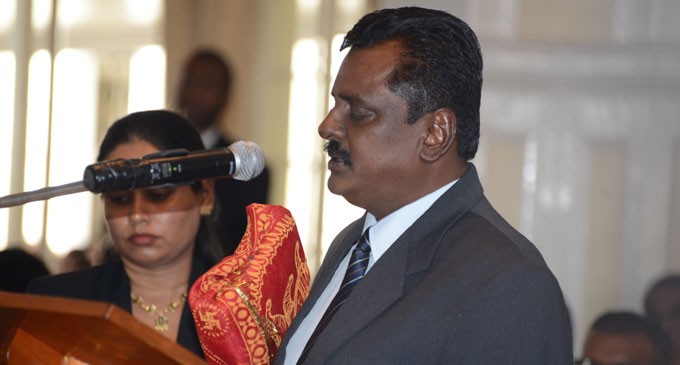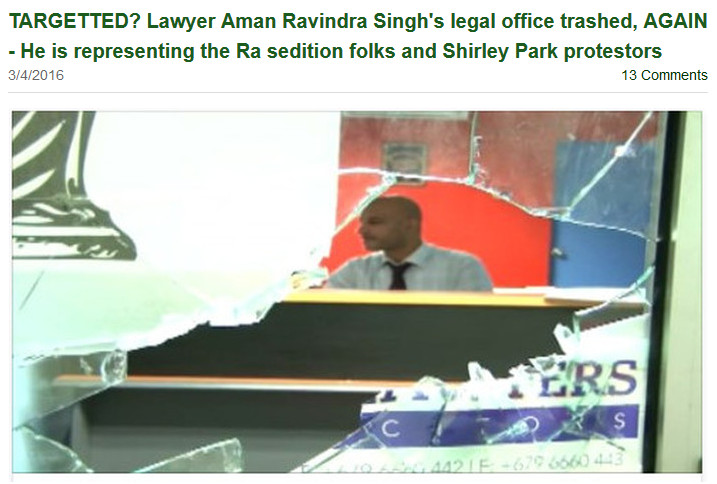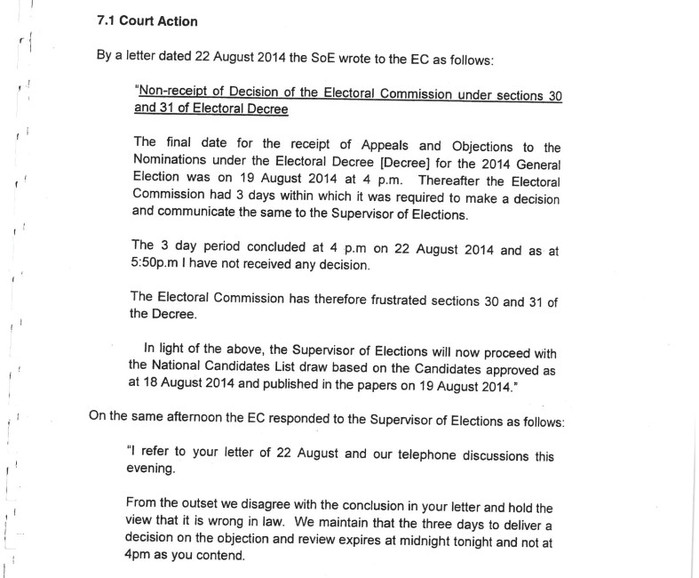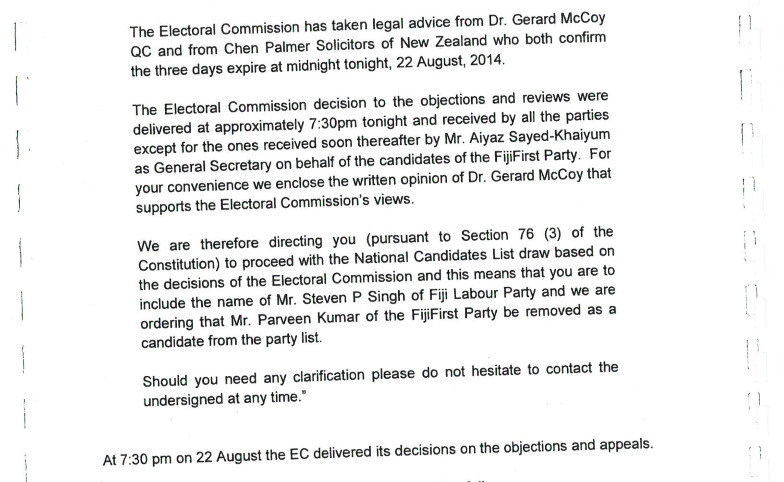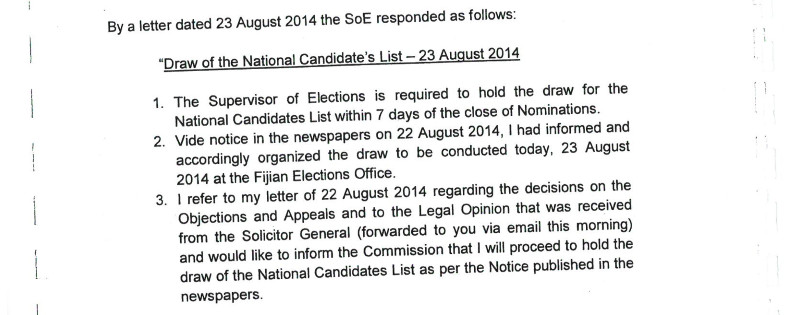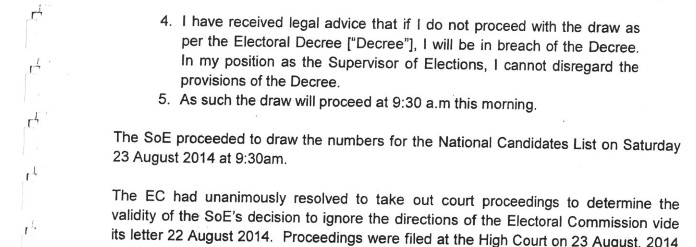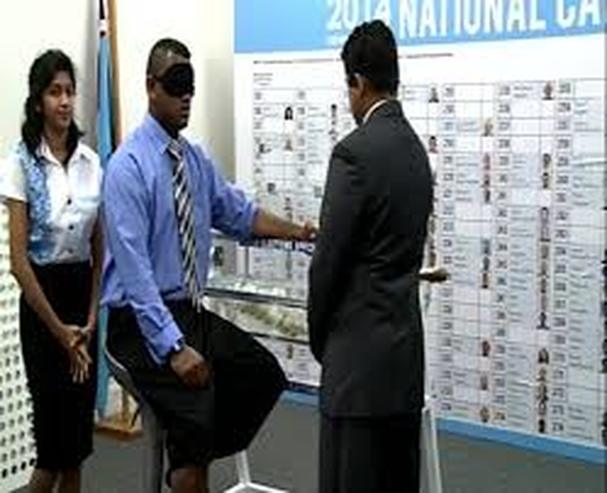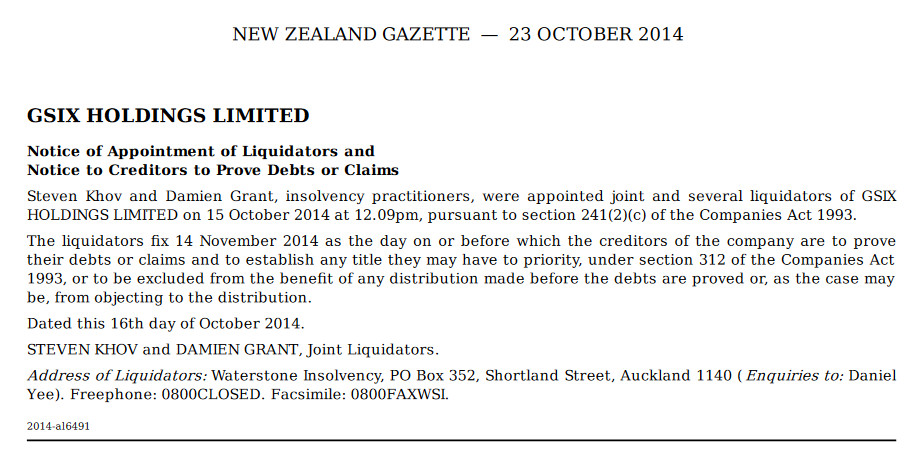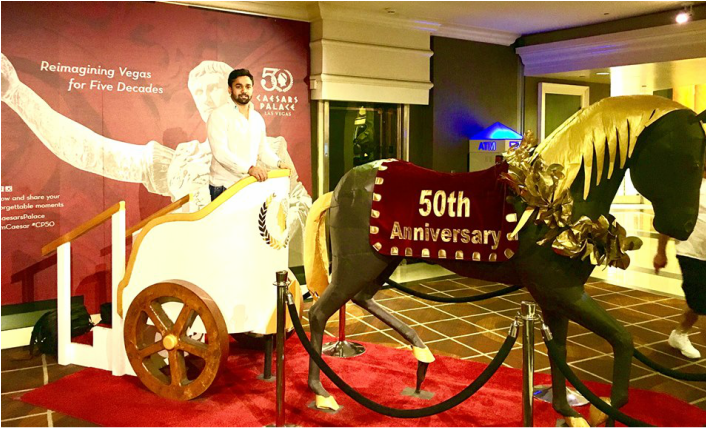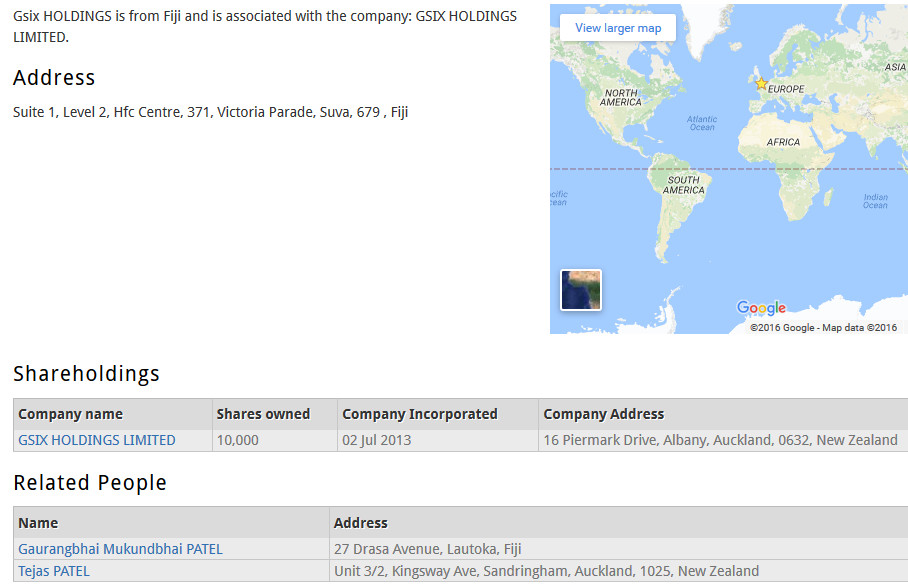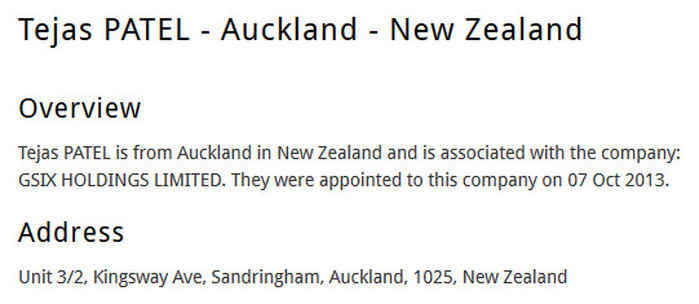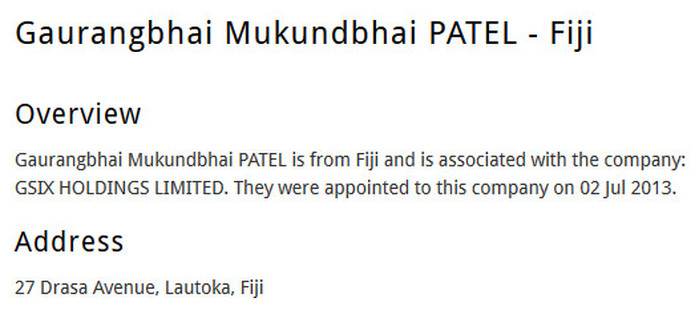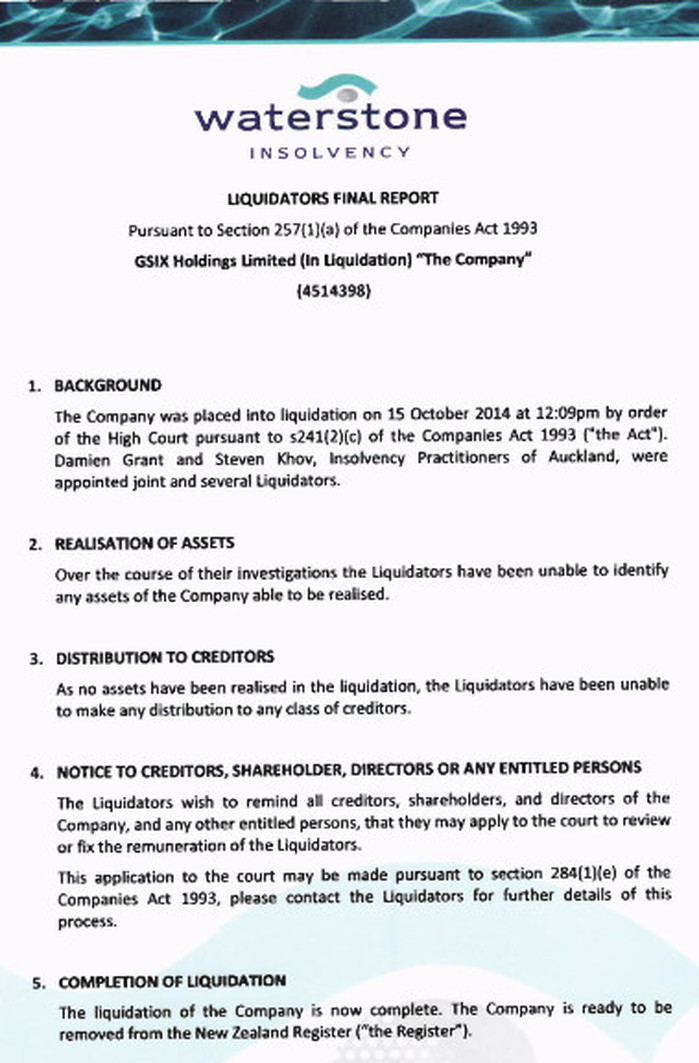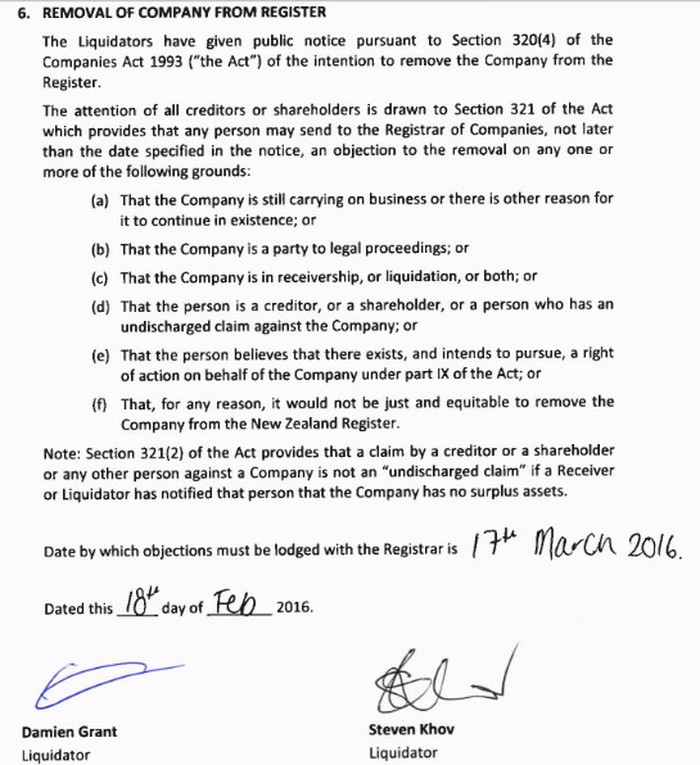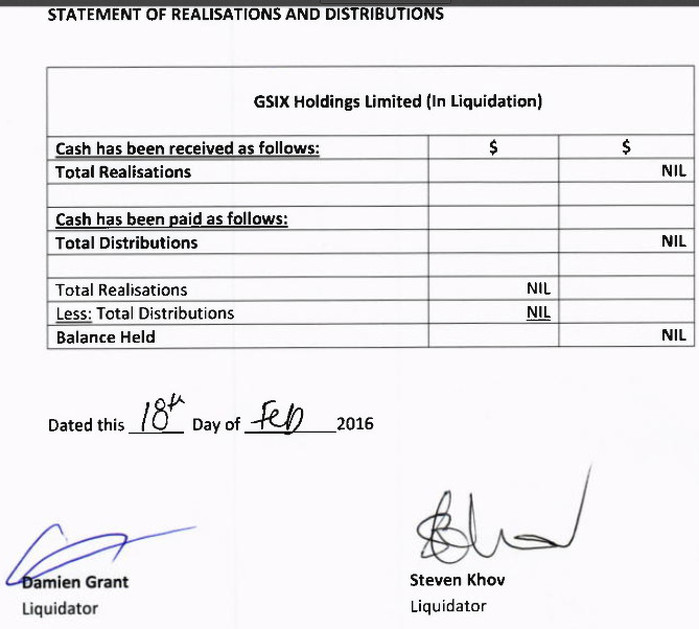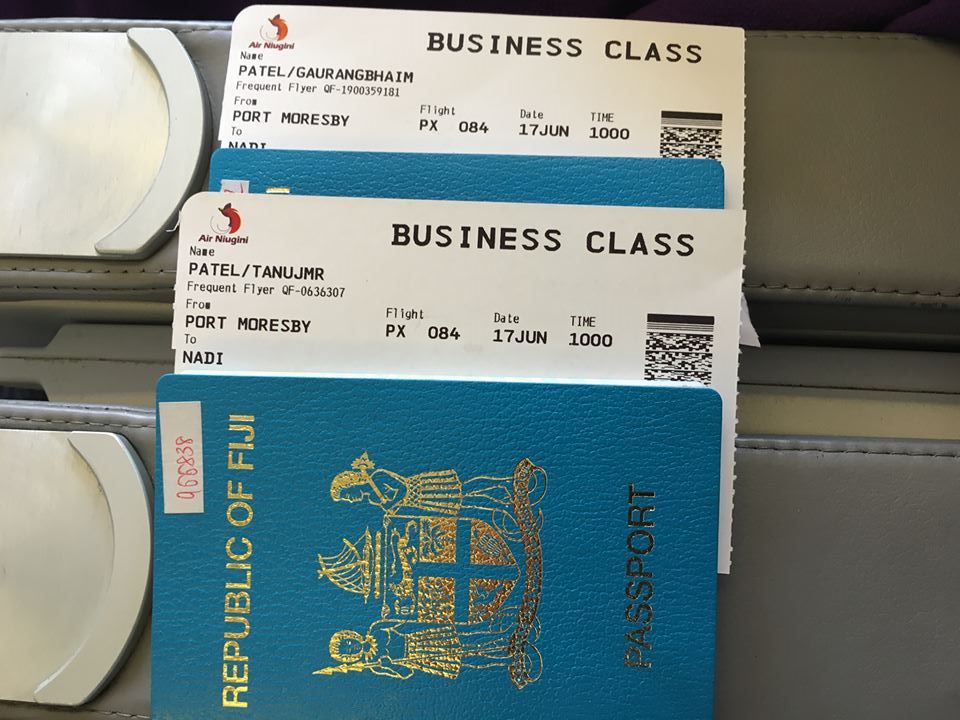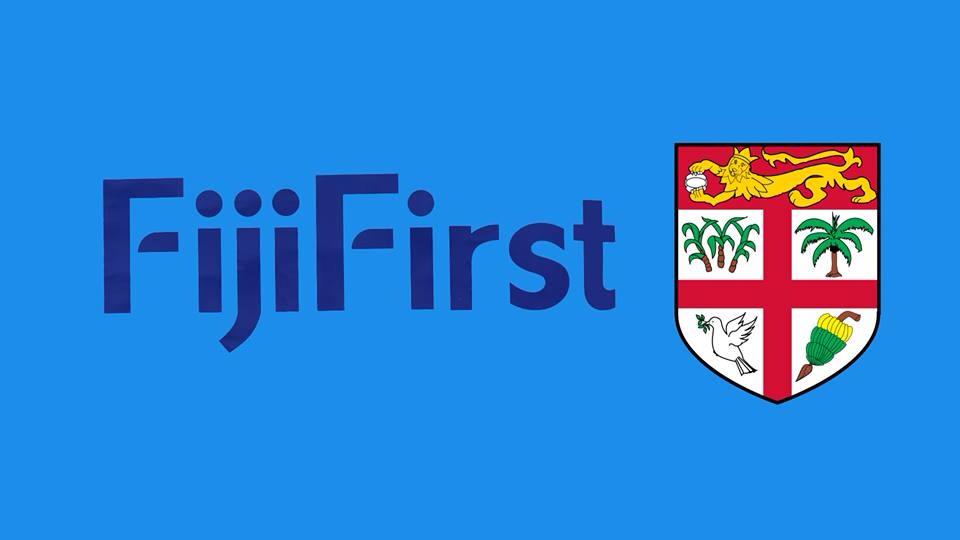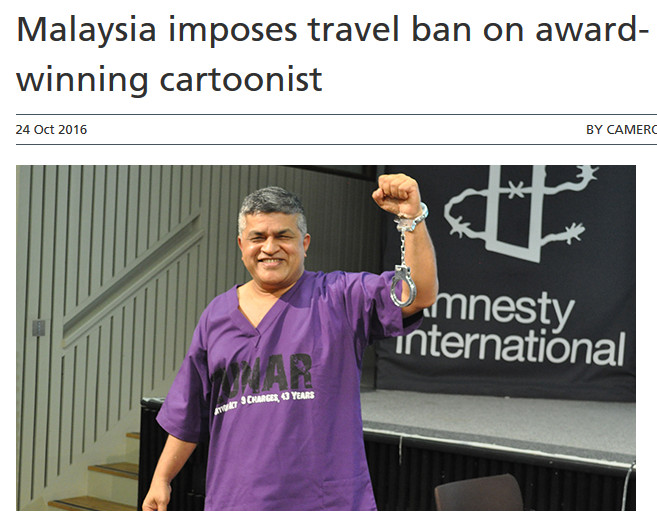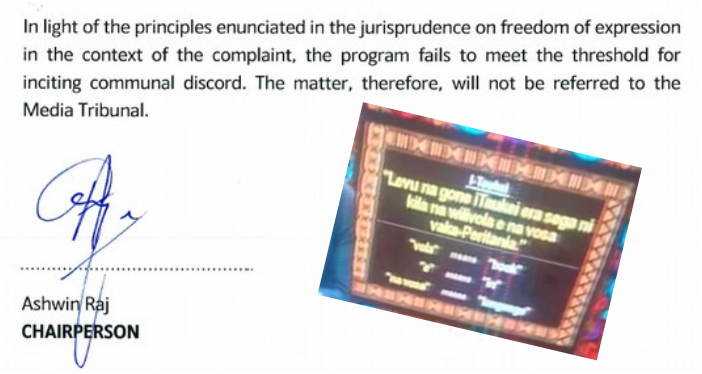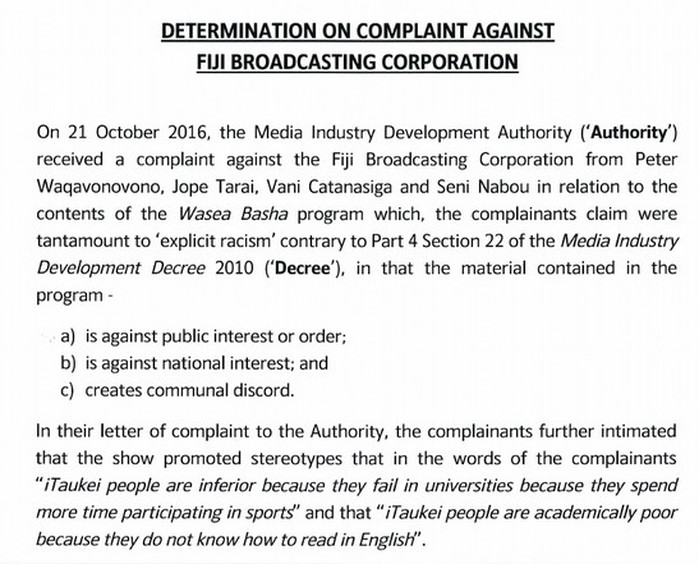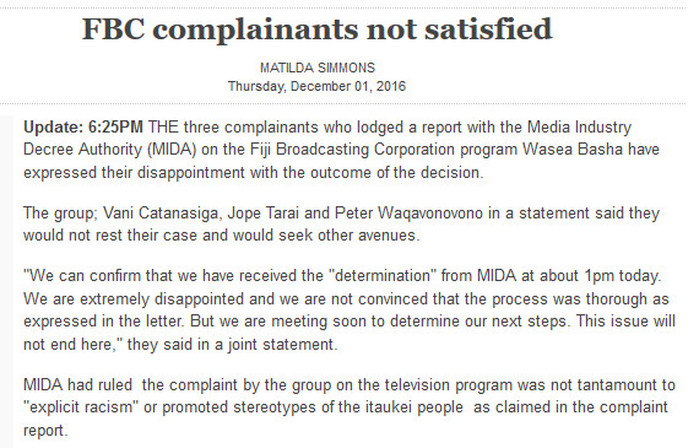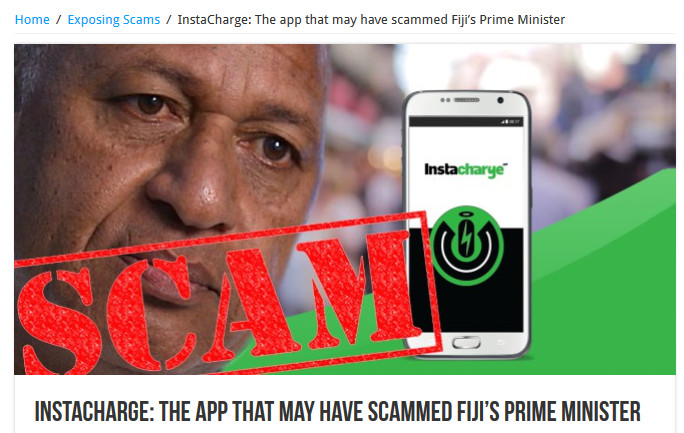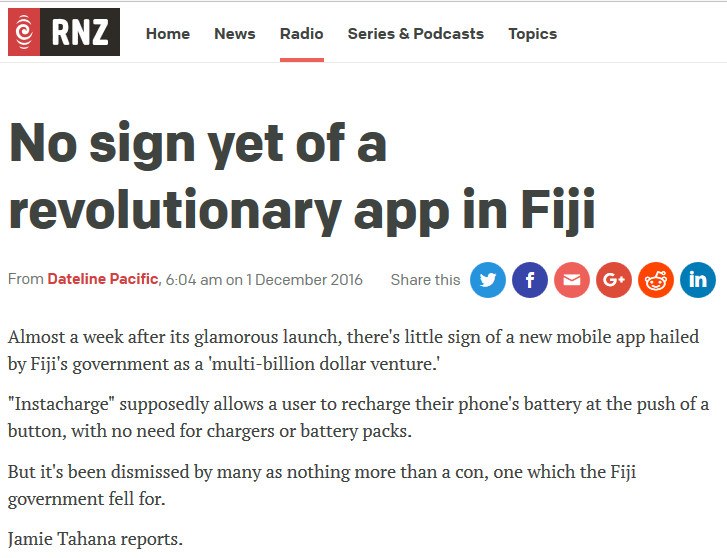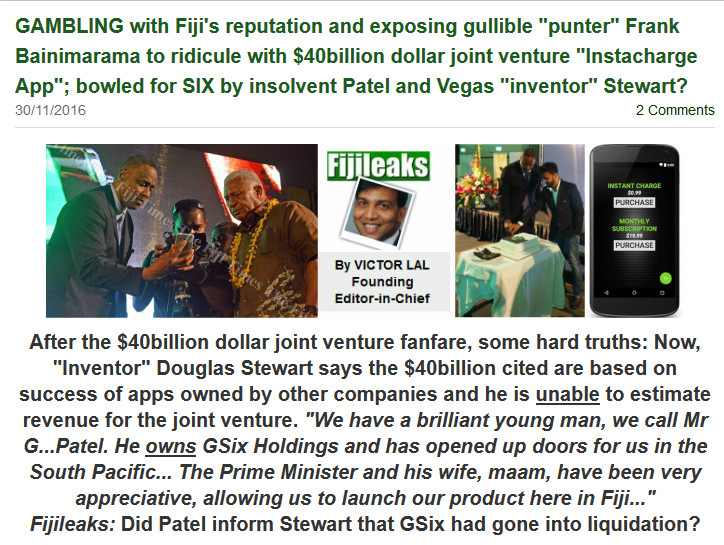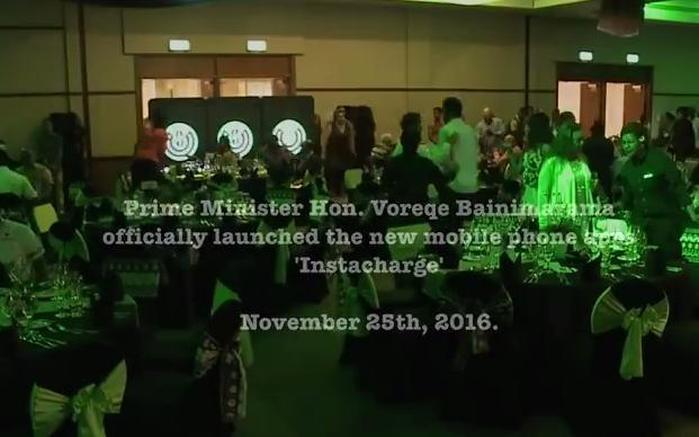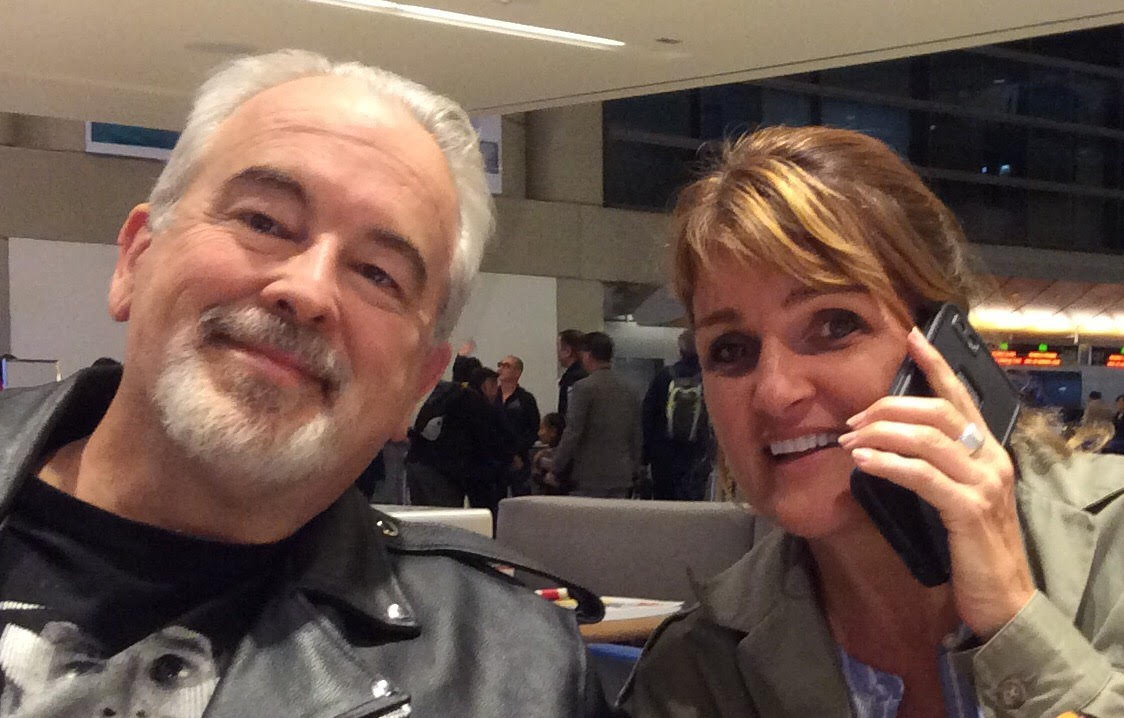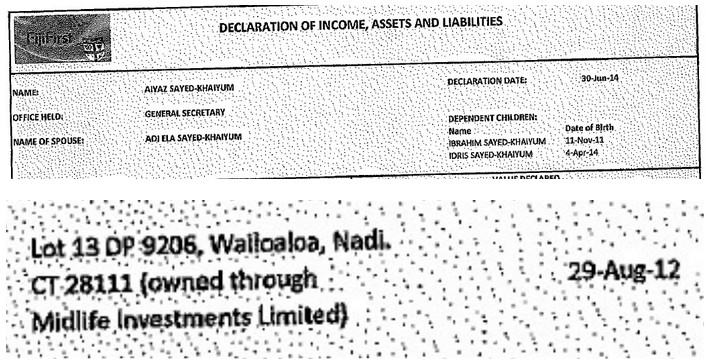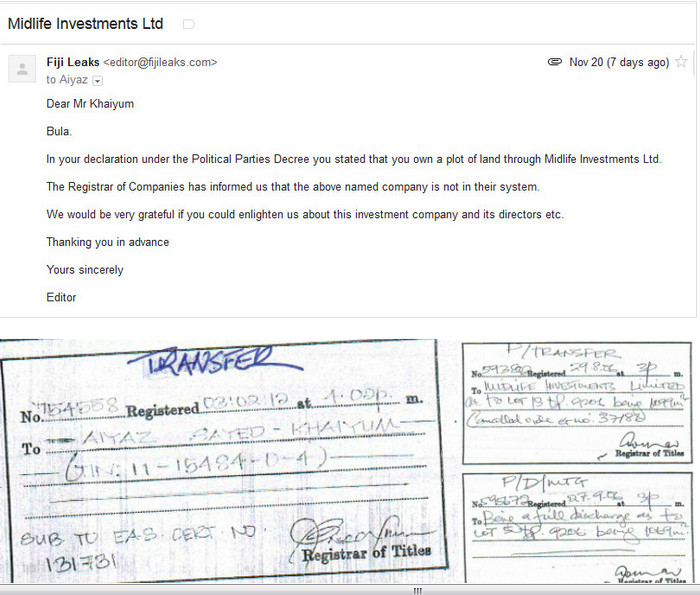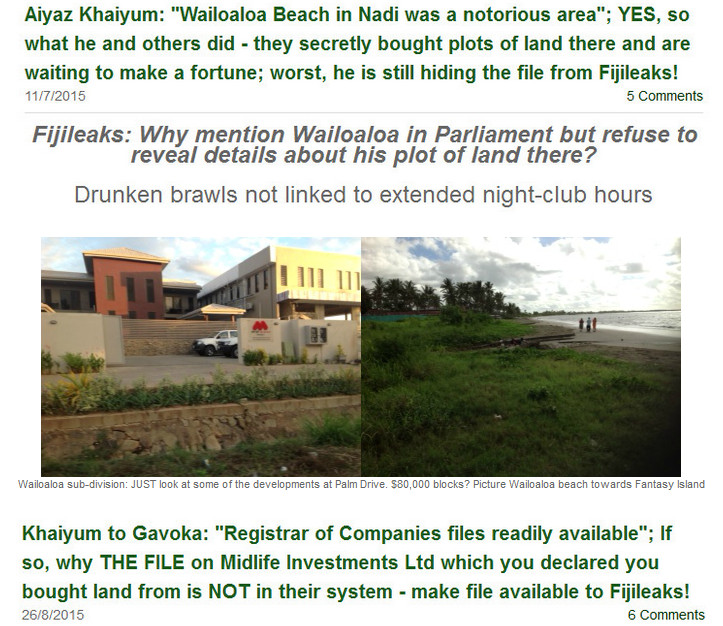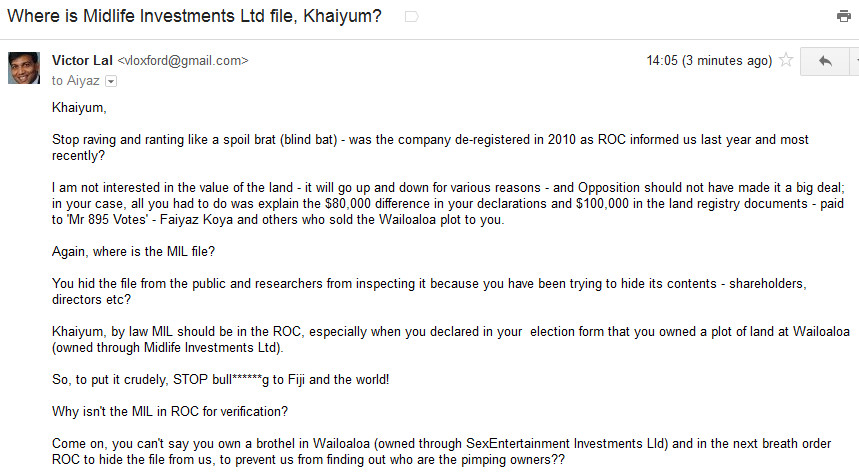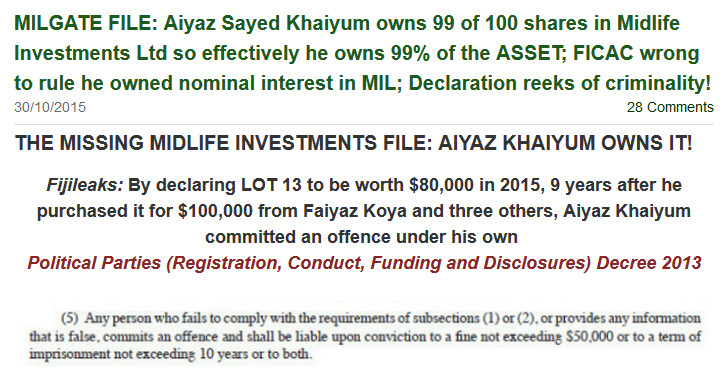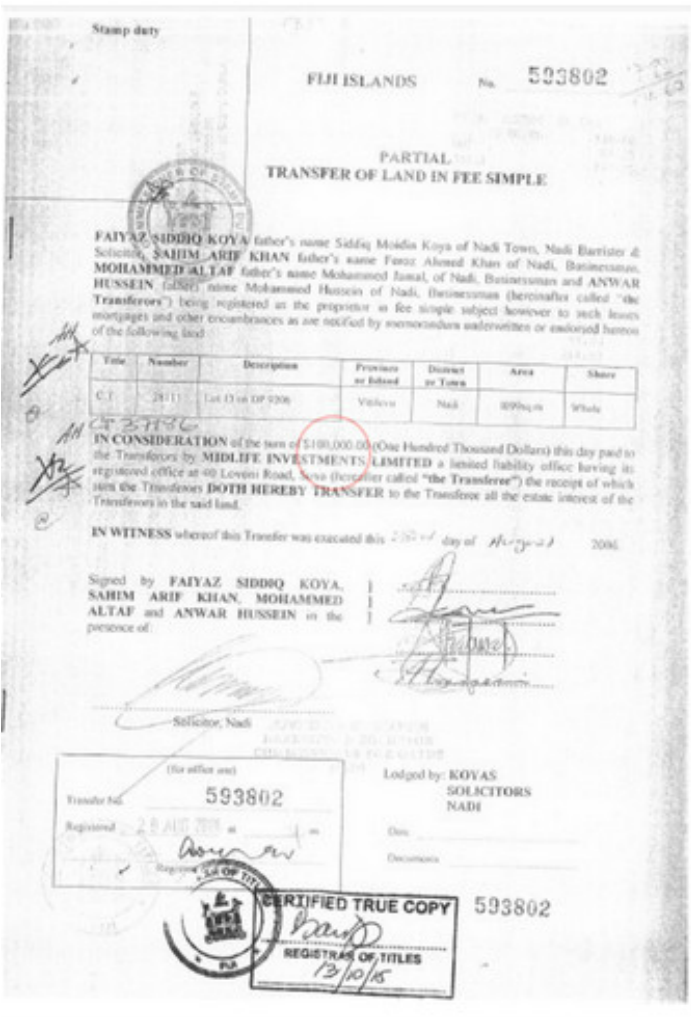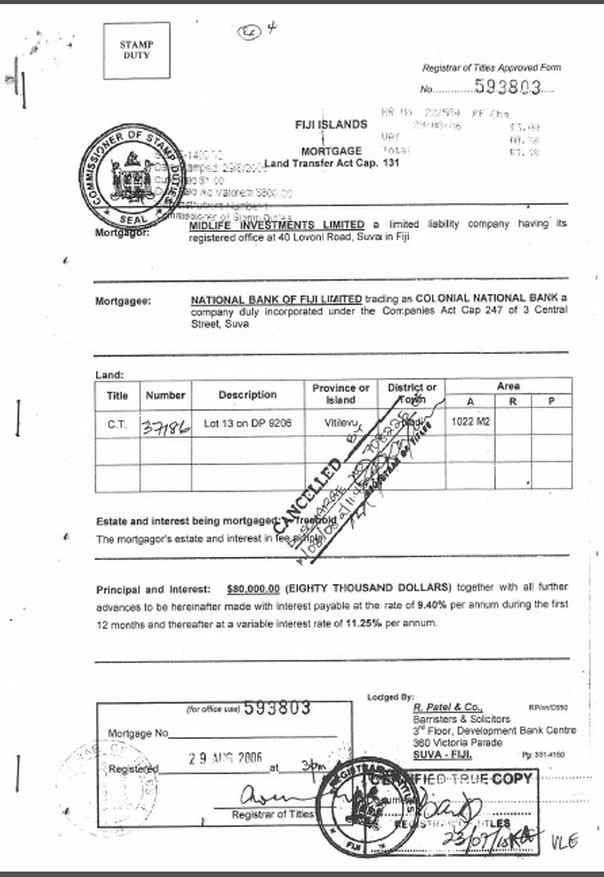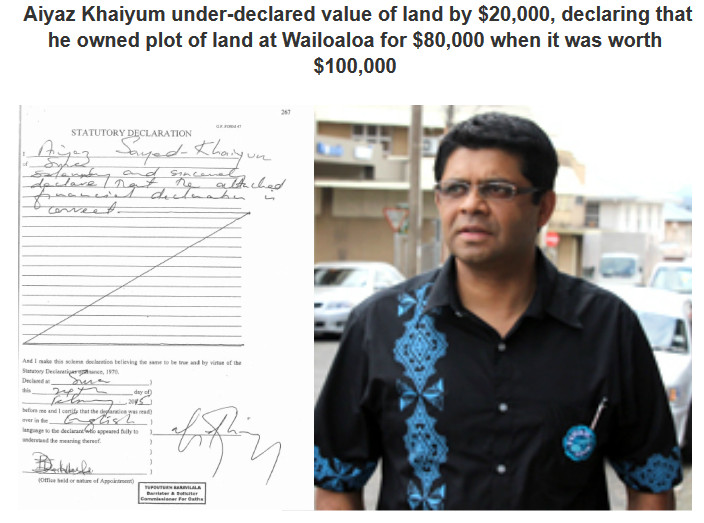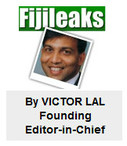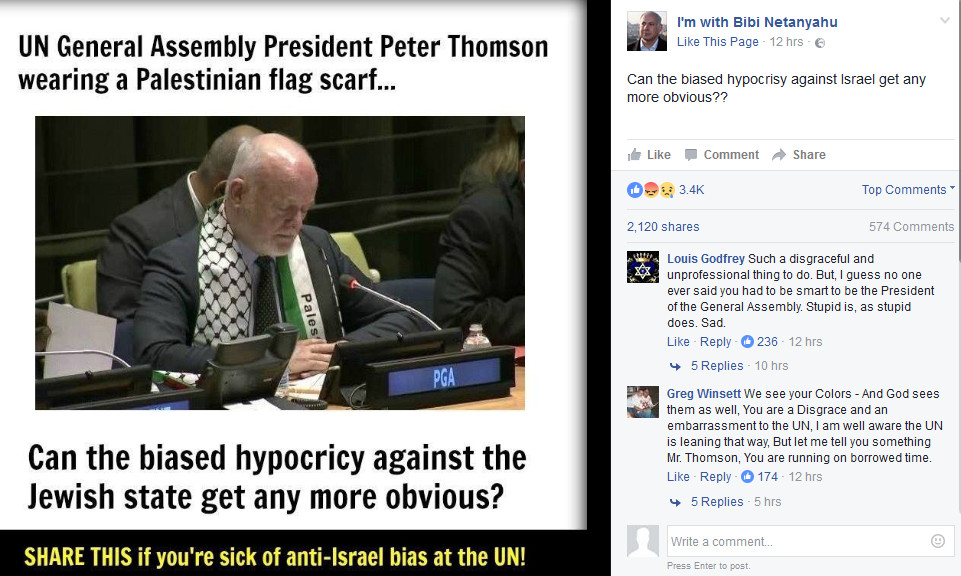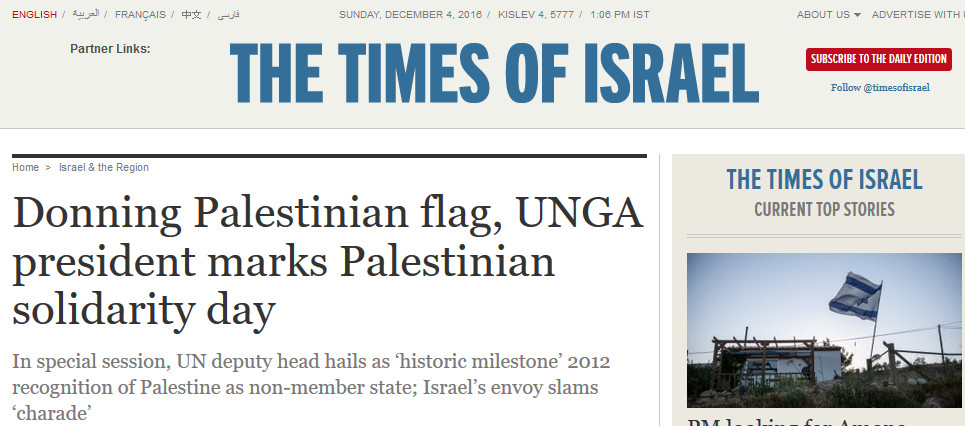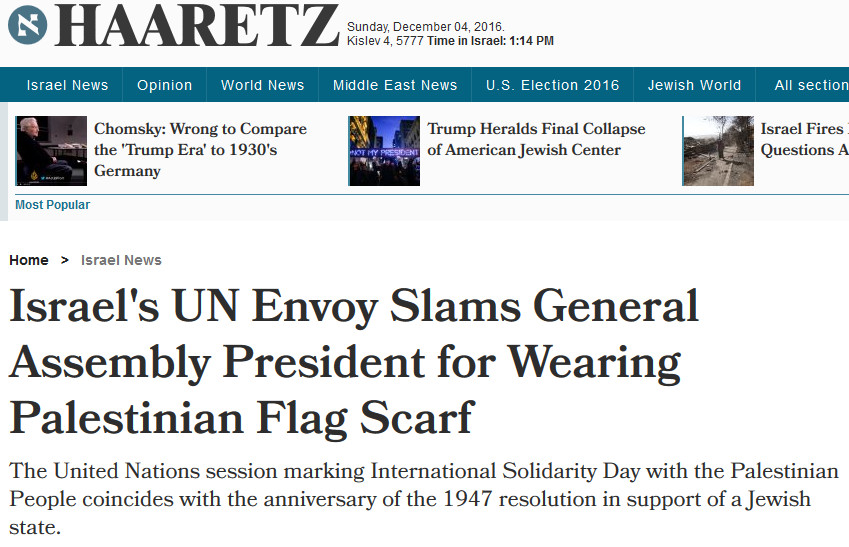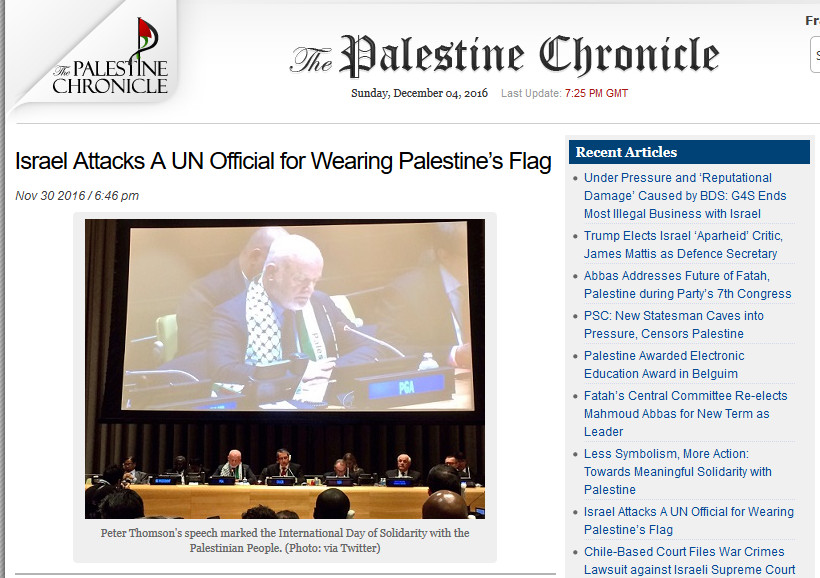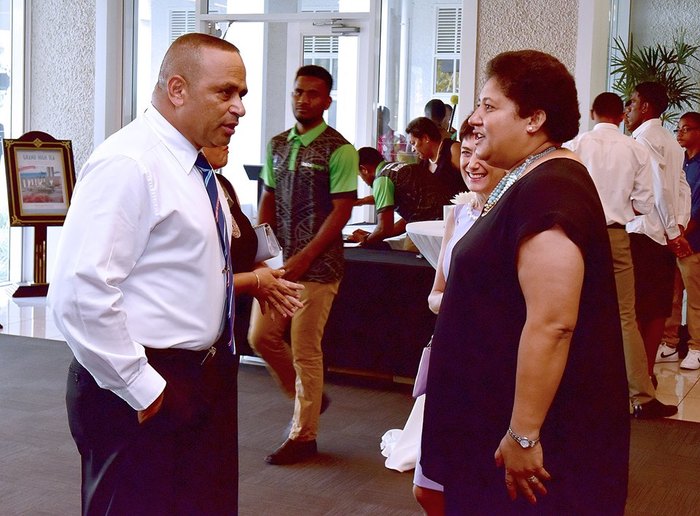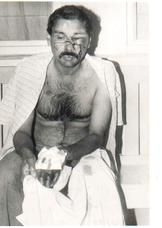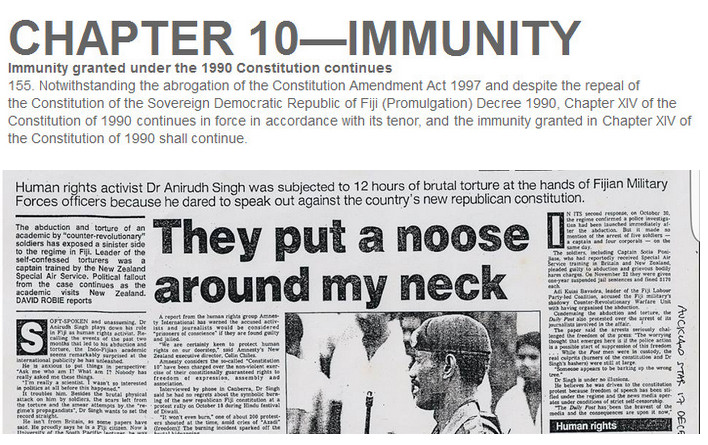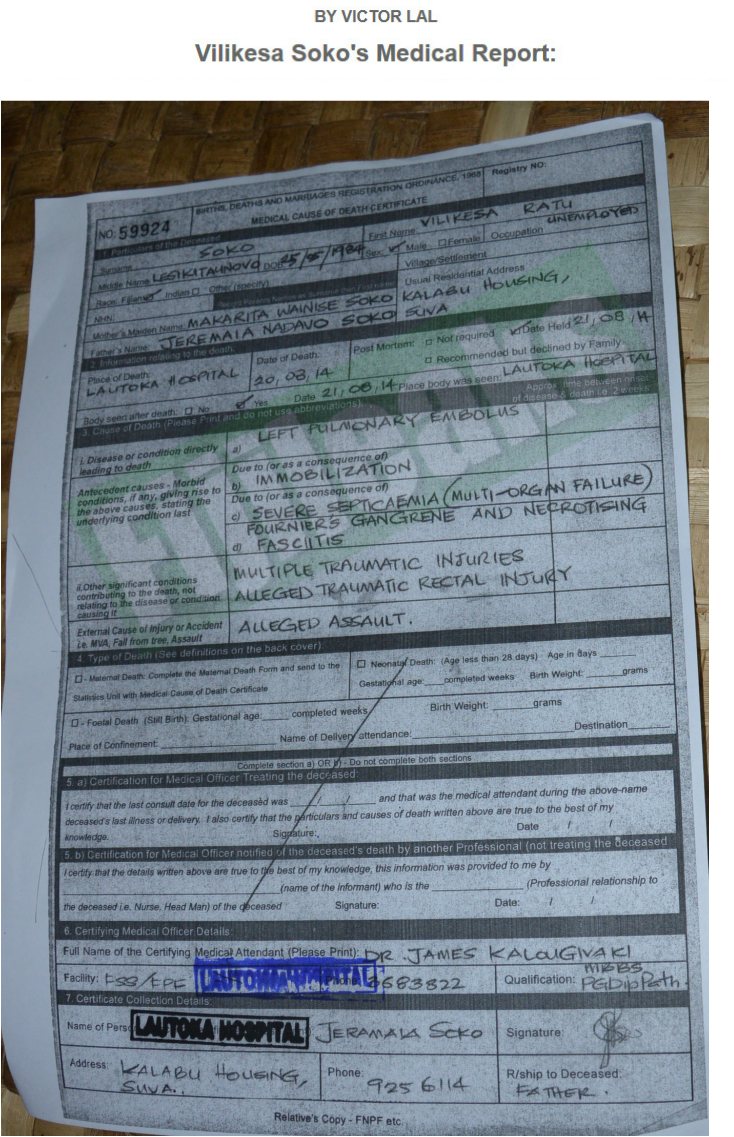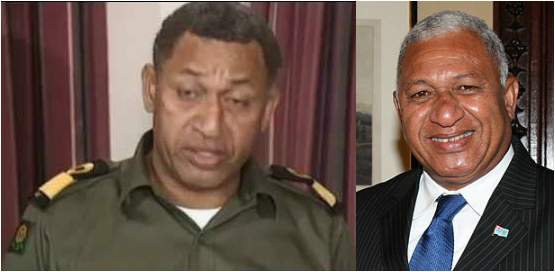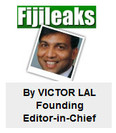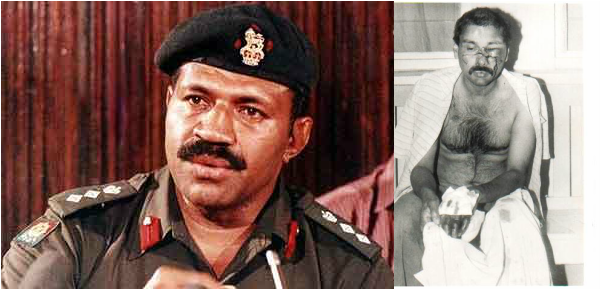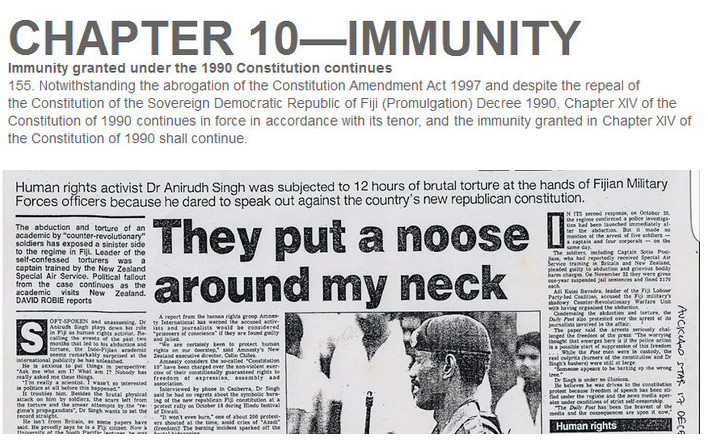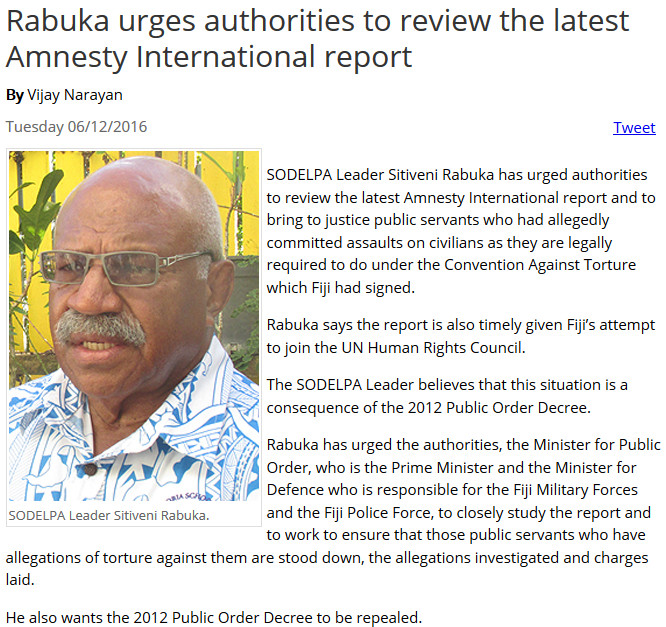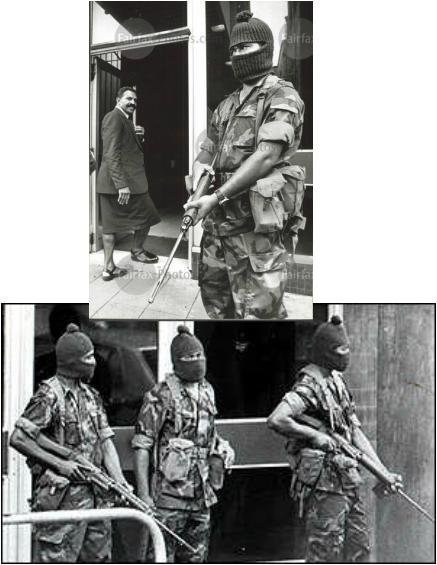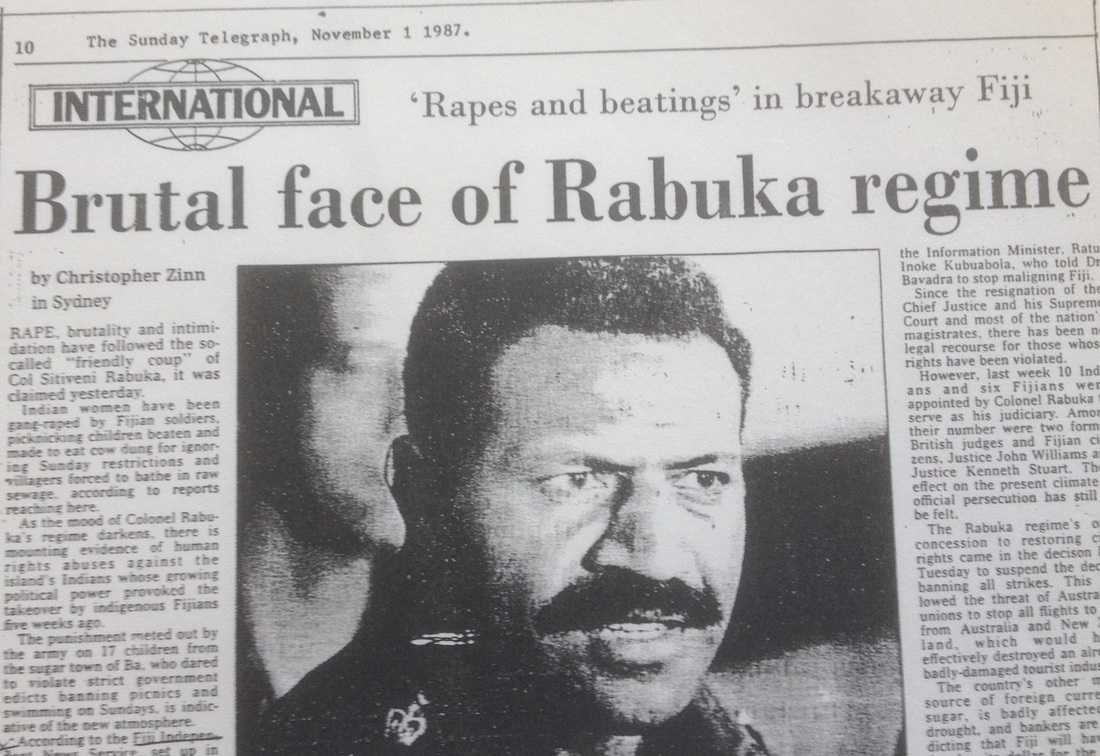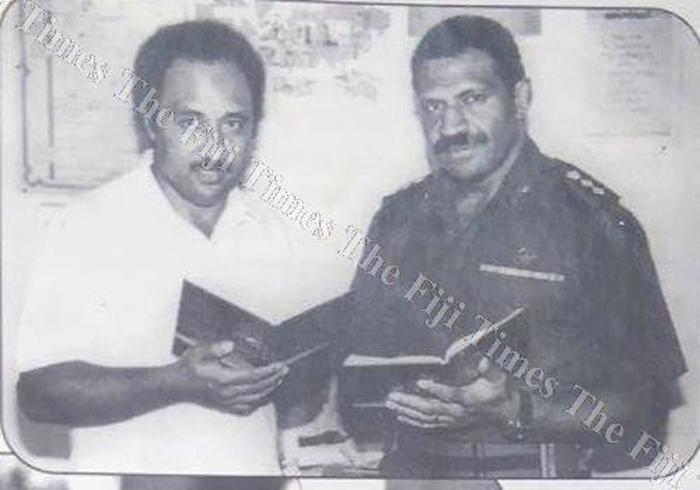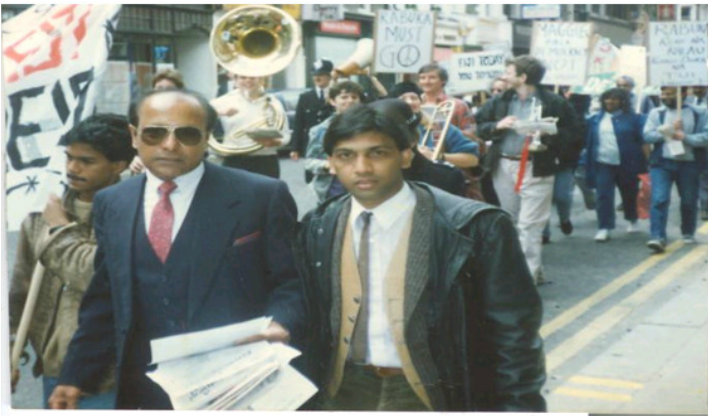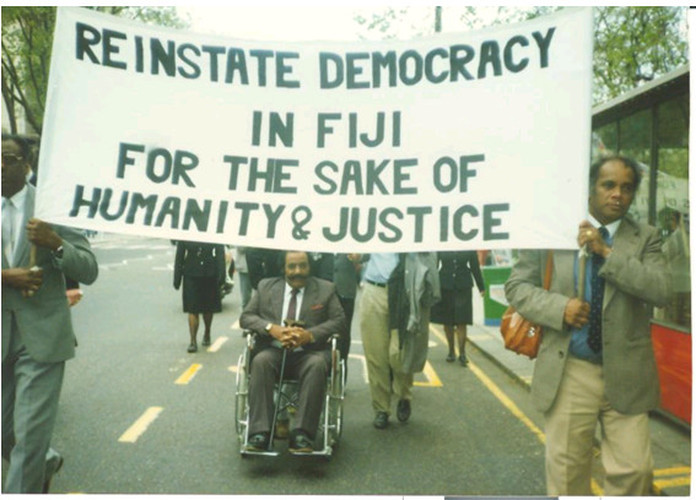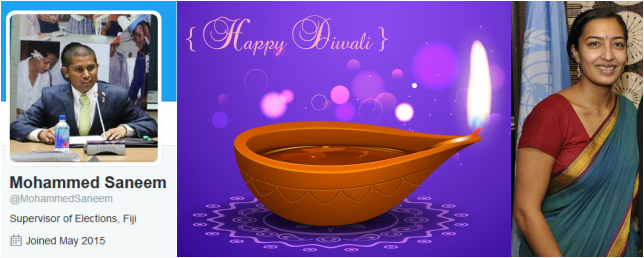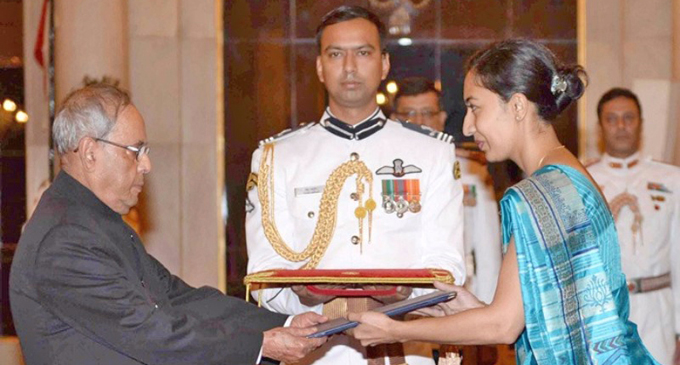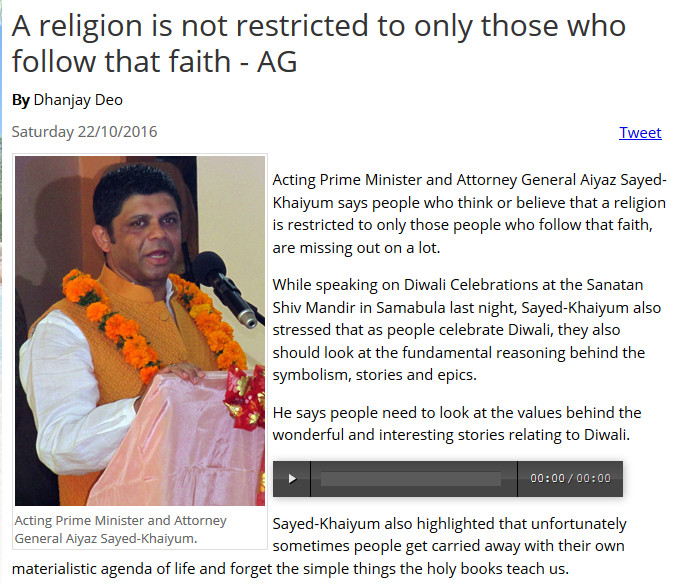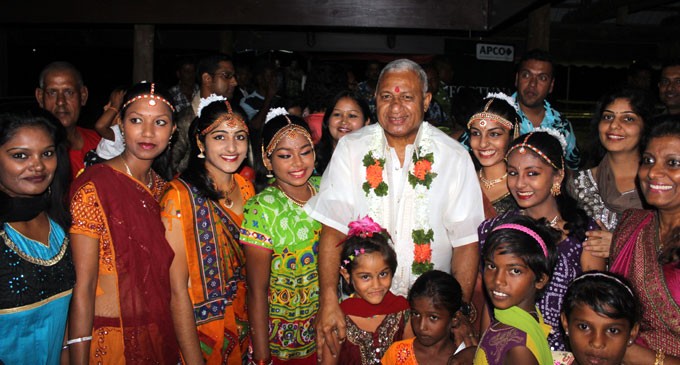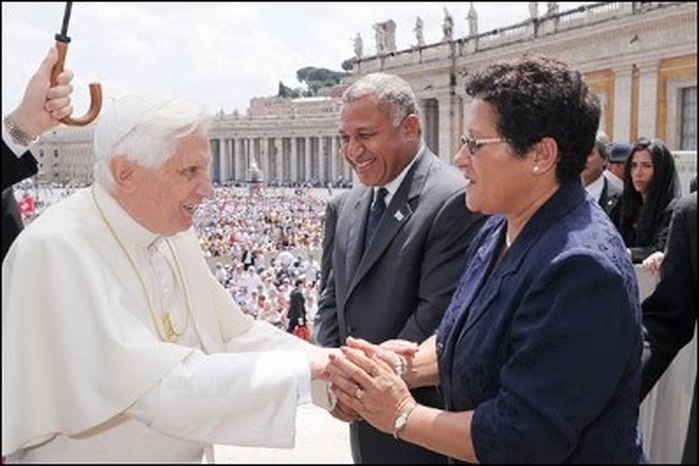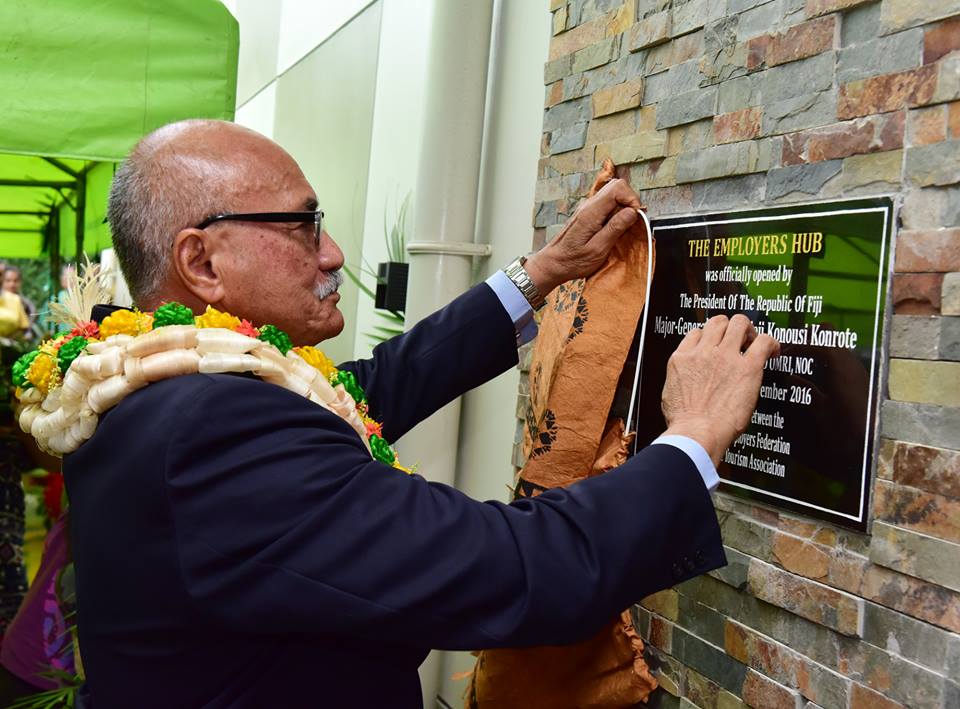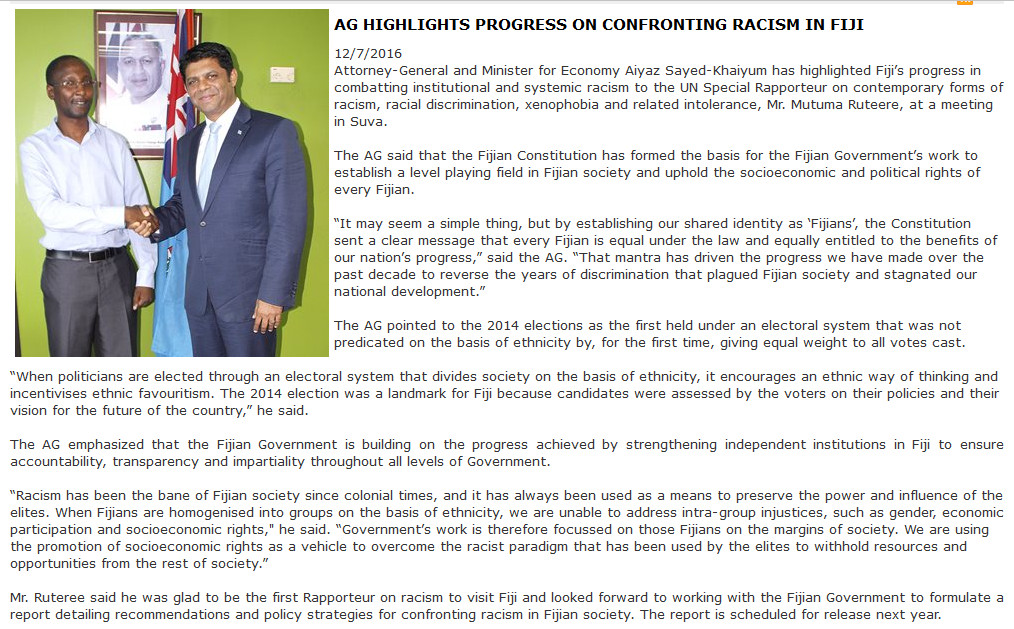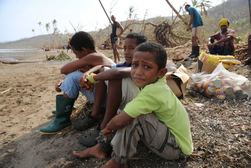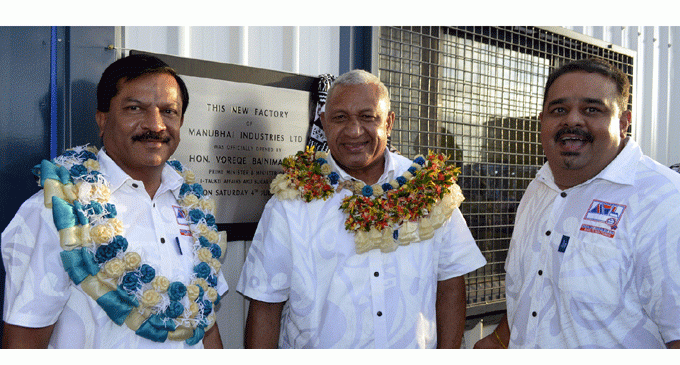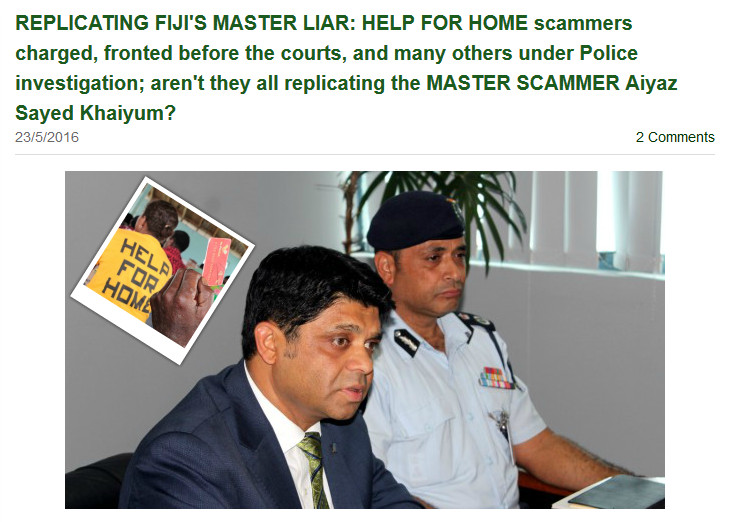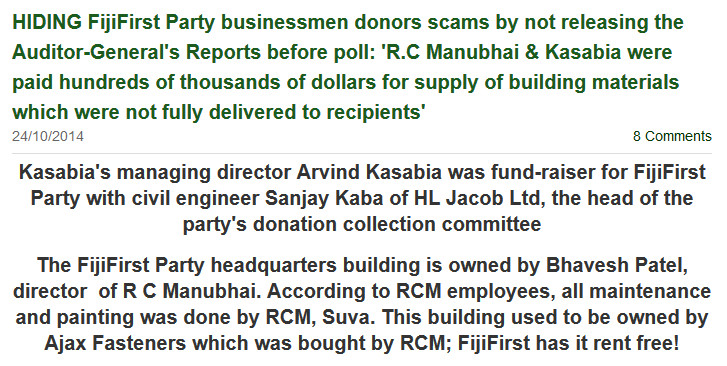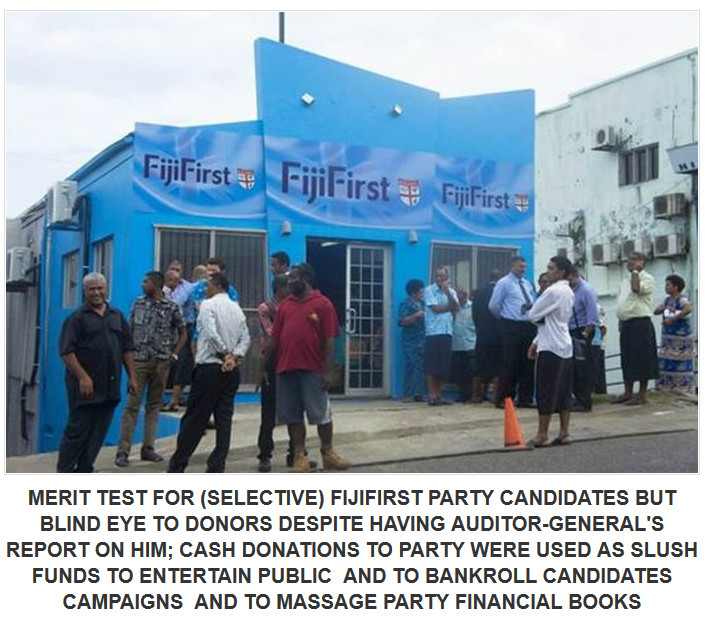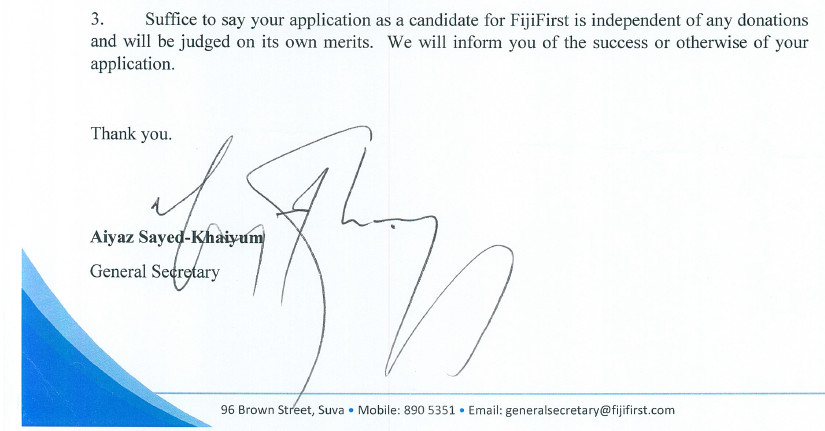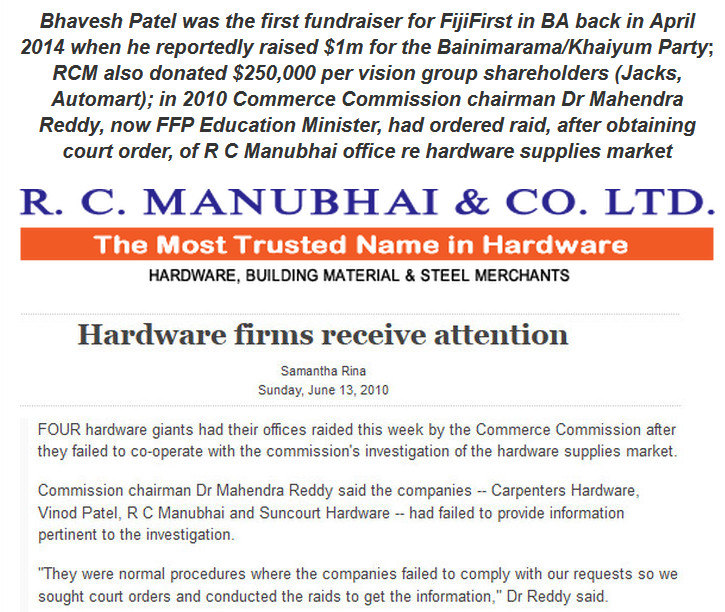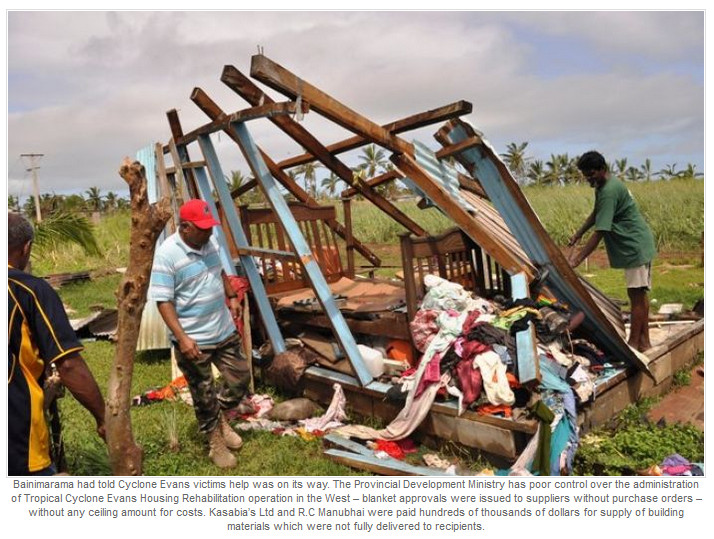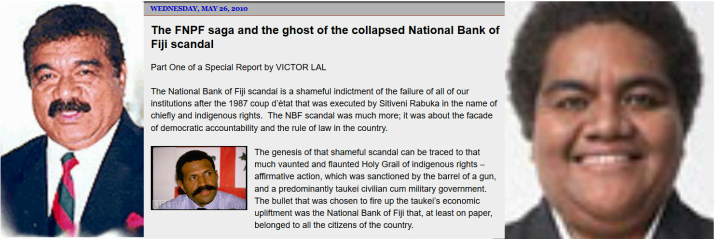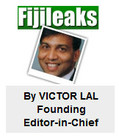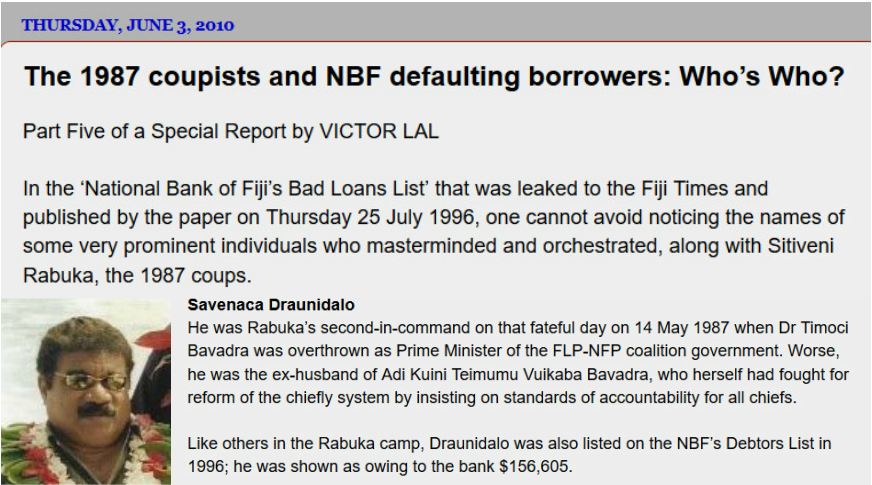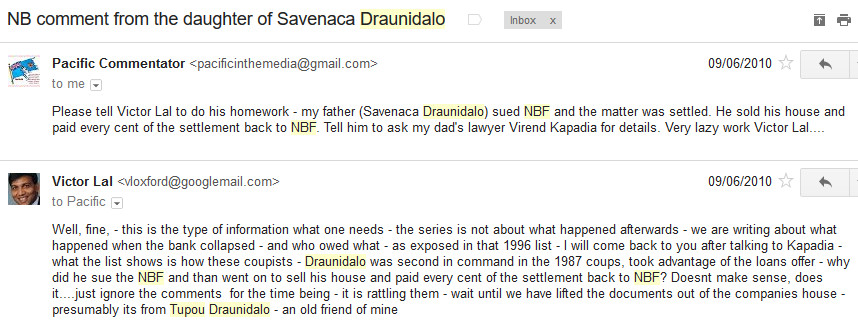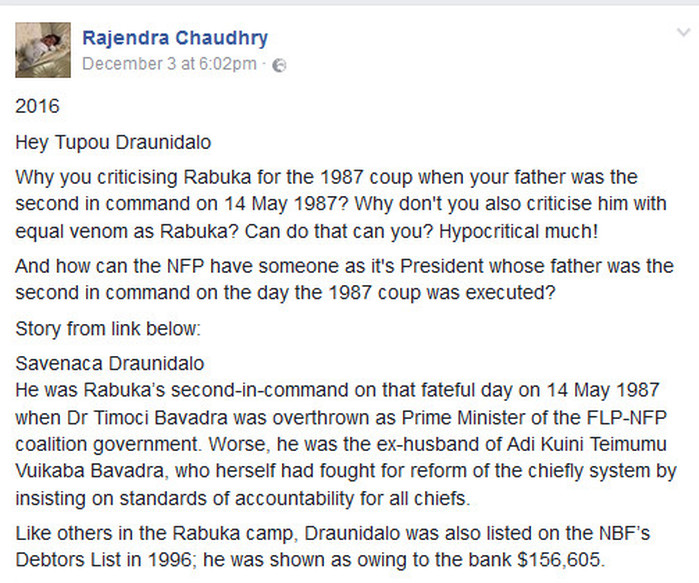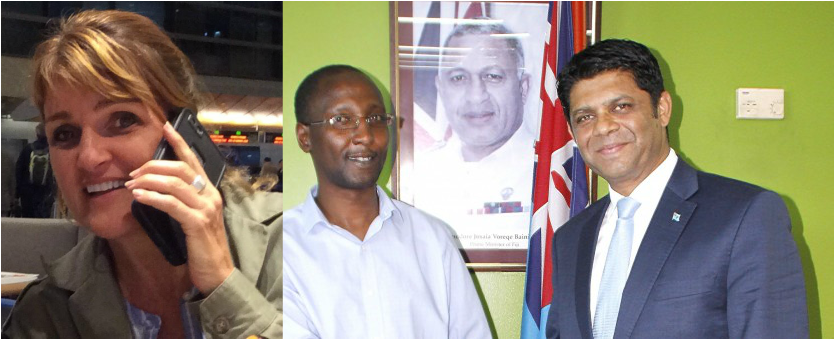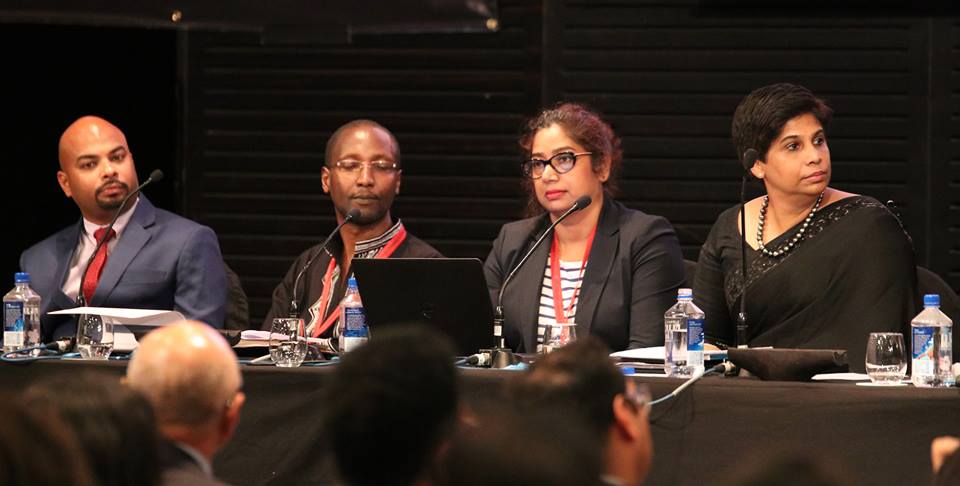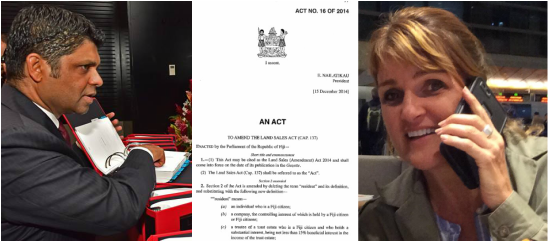↧
RESIGN, PARVEEN BALA! The Electoral Commission had ordered the Election Supervisor Saneem: "We are ordering that Mr Praveen Kumar [Bala] of the FijiFirst Party be removed as a candidate from the party list"
REPORTING FIJI COURT OF APPEAL JUDGMENT: One wonders if Fiji Sun is singing from same "judicial musical sheet" - no mention of Bala?:
The Fiji Times:
According to the Fiji Court of Appeal judges, the Electoral Commission discharged its functions when it sent its letter dated August 22, 2014 to Saneem. "Once the commission did that, the Supervisor was mandatorily required to carry out the decision contained in that communication in terms of Section 76 (3) read with Section 8 (a) of the Electoral Decree and it was not open to him to question the legality and/or constitutionality of it, particularly in view of the provisions of Section 30 (7) of the said Decree which decrees that the commission's decision is final, not permitting any appeal or review against the same."
One of the objectors to Bala's candidacy was PDP general secretary and lawyer Aman Ravindra Singh:
Extract from The Fijian Electoral Commission Annual Report 2014:
BLIND TO LEGALITY: Saneem overseas the draws for numbers assigned to candidates contesting the September 17 election. Fiji Labour Party leader Mahendra Chaudhry objected to the draws being held while People’s Democratic Party President Lynda Tabuya protested against the inclusion of FijiFirst candidate Parveen Kumar’s name in the list for the draw. The Fiji Electoral Commission upheld an appeal by PDP against Kumar’s nomination saying he was a public office holder at the time of his nomination. Kumar, who also goes by the name Praveen Bala, was the special administrator for Lautoka, Ba and Tavua. Chaudhry objected to his name as well as his colleague Steven Singh’s name not being included in the draw.
Fijileaks to Supervisor of Elections Mohammed Saneem:
↧
GAMBLING with Fiji's reputation and exposing gullible "punter" Frank Bainimarama to ridicule with $40billion dollar joint venture "Instacharge App"; bowled for SIX by insolvent Patel and Vegas "inventor" Stewart?
After the $40billion dollar joint venture fanfare, some hard truths: Now, "Inventor" Douglas Stewart says the $40billion cited are based on success of apps owned by other companies and he is unable to estimate revenue for the joint venture. His co-signatory to the joint venture - Gaurangbhai Mukundbhai Patel - ran a New Zealand company GSix Holdings Ltd which went into liquidation in October 2014, with no assets to distribute to creditors. Patel turned up in Fiji as chairman of Fiji Cricketers Association, "securing" $200,000 for the sport.
Last week, at Grand Pacific Hotel, he and Stewart got Bainimarama to launch their new venture, in the presence of Who is Who of Fiji and scores of international dignitaries - not to mention local and overseas media and dancers. What was omitted from the choreography and script was Patel's GSix Holdings Ltd which was placed into liquidation in New Zealand in October 2014. GSix Holdings Limited was formed on
2 July 2013
Fijileaks: Gaurangbhai Mukundbhai PATEL, former Fijian cricketer and the man behind the "$40billion joint venture" is refusing to dismount from his "high horse" and tell us about his past business history; we don't blame him at all: Fijians, Fiji government, and the Fiji Media have history of falling for "businessman" promising to bring millions - billions!
HACKING UPDATE: We would like to inform all those who have contacted us that the investigation is on-going. We will, on its completion, expose the Indo-Fijian businessman who financed the hacking, the role of Government Whip and FFP MP Ashneel Sudhakar, and identify other FFP hackers, not to mention some so-called "prominent" local Fijian journalists. We have also established that the FFP hackers had employed South East Asian prostitutes to impersonate Google staff, who contacted VICTOR LAL, our founding editor-in-chief, pretending to be from GMAIL!
Fijileaks: We like to extend our appreciation to the anonymous person who has nominated our founding Editor-in-Chief VICTOR LAL
for the 2017 Index on Censorship Freedom of Expression Award:
"This message is to let you know you have been nominated by a member of the public for the Index on Censorship Freedom of Expression Awards 2017 - in the campaigning category."
VICTOR LAL: We salute a fellow 2016 Index on Censorship Freedom of Expression Award nominee and Malaysian cartoonist Zulkiflee Anwar Haque, aka Zunar, who won't be able to be with me at the 2017 Award (pictured with me at last year's award ceremony). Malaysia has imposed a travel ban on Zunar, who is facing sedition charges and a possible 43 year prison sentence: “How Can I Be Neutral, Even My Pen Has a Stand”
“Talent is not a gift, but a responsibility. It is a duty for me as a cartoonist to use the art as a weapon to fight unjust rulers. Fear and intimidation are the potent tools being used by the regime to scare the people. I also strongly believe that, when faced with a moral crisis, there is no room to grumble in silence. We have to stand up and cry our voice out loud and clear. Neutrality is escapism for those who live in a comfort zone.” - Zunar, on winning the 2016 Cartooning for Peace Prize, Geneva; Zunar has spent two periods in Malaysian jails, firstly in September 2010 and again from 10 February 2015. Several of his books have been banned while bookstores carrying his works have been raided and three of his assistants were arrested in October 2014 for selling his books. The webmaster, who manages his website and online bookstore, has been interrogated by Malaysian police.
Award-winning Malaysian cartoonist Zunar, who faces up to 43 years imprisonment for tweeting his cartoons criticising his country’s leaders reported on 17 October that he has had a travel ban imposed blocking him from travelling outside the country.
Zulkiflee Anwar Ulhaque, known as Zunar, has faced harassment from the Malaysian government for his political cartoons. Five of his books have been banned in Malaysia and his office has been raided several times, resulting in the confiscation of thousands of his books.
The Malaysian government has banned his books on the grounds that they can “influence the public to revolt against the leaders and government policies” and they are “detrimental to public order.”
Any bookstore, vendor, printer or publisher who agrees to sell the cartoonist’s books also face harassment from the Malaysian government, receiving threats of having their business licenses revoked or their offices raided. Zunar’s books are now printed without the name of the publisher to protect them. Although this is against the law, he has no choice if he wishes to continue publication of his cartoons.
Zunar is being charged under the Sedition Act, which was originally put in place in 1948 to curb opposition to British colonial rule, but the law has remained part of Malaysia’s legal system. The Sedition Act prohibits any behavior that could be deemed detrimental to the government. This outdated law allows the Malaysian government to censor opposition.
His cartoons have covered a wide range of controversial topics in Malaysia, from unsolved murders to political conspiracies. His motto is proudly displayed throughout his website, “How Can I Be Neutral, Even My Pen Has a Stand” emphasising his unfaltering mindset to stand up to the Malaysian government.
Zunar has challenged the Sedition Act and the Malaysian government multiple times in the past. First in 2010 to fight the banning of his books in the country, then in 2011 against the government and police for unlawful arrest and detention. Unfortunately in both cases the courts ruled against him.
Now with a travel ban placed on him by the Malaysian government, Zunar plans to again file a suit to challenge its validity. The cartoonist discovered the ban on 17 October 2016 at the Kuala Lumpur International Airport, though it has been effective since 24 June 2016.
With the court proceedings for Zunar set for 22 November, he faces a maximum of 43 years in prison for tweeting his cartoons. The cartoonist has been imprisoned twice in the past; once for two days in 2010 and again for three days in 2015, both times for violating the Sedition Act. Three of Zunar’s assistants were also arrested in 2014 for selling his cartoons.
Zunar is currently out on bail but is stuck in Malaysia with the threat of 43 years imprisonment ahead of him. Despite this, he remains dedicated to exposing the corruption of the government, stating in an interview with Index on Censorship in 2015, “I will never stop, it is my right as a citizen to express my view and my responsibility as a cartoonist to give alternative views.”
Zulkiflee Anwar Ulhaque, known as Zunar, has faced harassment from the Malaysian government for his political cartoons. Five of his books have been banned in Malaysia and his office has been raided several times, resulting in the confiscation of thousands of his books.
The Malaysian government has banned his books on the grounds that they can “influence the public to revolt against the leaders and government policies” and they are “detrimental to public order.”
Any bookstore, vendor, printer or publisher who agrees to sell the cartoonist’s books also face harassment from the Malaysian government, receiving threats of having their business licenses revoked or their offices raided. Zunar’s books are now printed without the name of the publisher to protect them. Although this is against the law, he has no choice if he wishes to continue publication of his cartoons.
Zunar is being charged under the Sedition Act, which was originally put in place in 1948 to curb opposition to British colonial rule, but the law has remained part of Malaysia’s legal system. The Sedition Act prohibits any behavior that could be deemed detrimental to the government. This outdated law allows the Malaysian government to censor opposition.
His cartoons have covered a wide range of controversial topics in Malaysia, from unsolved murders to political conspiracies. His motto is proudly displayed throughout his website, “How Can I Be Neutral, Even My Pen Has a Stand” emphasising his unfaltering mindset to stand up to the Malaysian government.
Zunar has challenged the Sedition Act and the Malaysian government multiple times in the past. First in 2010 to fight the banning of his books in the country, then in 2011 against the government and police for unlawful arrest and detention. Unfortunately in both cases the courts ruled against him.
Now with a travel ban placed on him by the Malaysian government, Zunar plans to again file a suit to challenge its validity. The cartoonist discovered the ban on 17 October 2016 at the Kuala Lumpur International Airport, though it has been effective since 24 June 2016.
With the court proceedings for Zunar set for 22 November, he faces a maximum of 43 years in prison for tweeting his cartoons. The cartoonist has been imprisoned twice in the past; once for two days in 2010 and again for three days in 2015, both times for violating the Sedition Act. Three of Zunar’s assistants were also arrested in 2014 for selling his cartoons.
Zunar is currently out on bail but is stuck in Malaysia with the threat of 43 years imprisonment ahead of him. Despite this, he remains dedicated to exposing the corruption of the government, stating in an interview with Index on Censorship in 2015, “I will never stop, it is my right as a citizen to express my view and my responsibility as a cartoonist to give alternative views.”
↧
↧
WASEA BHASHA: MIDA chairman Ashwin Raj says he agrees program was discriminatory but it was not serious enough to cause him to act!!!
Fijileaks: Bill Whatcott was charged with promoting hate after he distributed flyers that condemned gay sex as immoral. Whatcott had published and distributed four anti-gay flyers in Saskatchewan, Canada, that used words like "filth" "propaganda" and "sodomy" to describe gay relationships and discussions of equality. The Canadian Supreme Court held that the first two flyers, titled "Keep homosexuality out of Saskatoon's public schools" and "Sodomites in our public schools" did constitute hate speech. The second two flyers — photocopies of classified ads with Whatcott's handwritten comments on them stating the ads were for "men seeking boys" — the Supreme Court ruled against the Canadian Human Rights Commission (that had brought the case against Whatcott). The Supreme Court found that it was unreasonable to find the second two flyers "contain expression that a reasonable person … would find as exposing or likely to expose persons of same-sex orientation to detestation and vilification." In one of his pamphlets Whatcott claimed that children would be taught ‘how wonderful it is for two men to sodomize each other,’ saying that teachers in Ontario seemed ‘more interested in the sexual politics of a perverted type’ rather than preparing children for their adult lives. ‘The homosexuals want to share their filth and propaganda with Saskatchewan’s children,’ Whatcott wrote. ‘Our children will pay the price in disease, death, abuse and ultimately eternal judgement if we do not say no to the sodomite [sic] desire to socialize your children into accepting what is clearly wrong.’
The anti-gay campaigner later fled to the Philippines, claiming he was forced to flee Canada over his activism
Fijileaks to Ashwin Raj: Program is Wasea Bhasha and not Wasea Basha
Wasea Bhasha program fails to meet the threshold for inciting communal discord - MIDA
The Media Industry Development Authority says the Wasea Bhasha program fails to meet the threshold for inciting communal discord and the matter will not be referred to the Media Tribunal.
MIDA Chairman Ashwin Raj says that MIDA received a complaint against FBC from Peter Waqavonovono, Jope Tarai, Vani Catanasiga and Seini Nabou in relation to the contents of the Wasea Bhasha program which, the complainants claim were tantamount to ‘explicit racism’ contrary to the Media Industry Development Decree.
In their letter of complaint to MIDA, the complainants further intimated that the show promoted stereotypes that in the words of the complainants “Itaukei people are inferior because they fail in universities because they spend more time participating in sports” and that “Itaukei people are academically poor because they do not know how to read in English.”
Other comments on Wasea Bhasha were “some teachers drink grog whole night and come to work lazy” ; “Many Itaukei boys roam around in the night with their mobile phones, wasting time” ; and “Indo Fijian boys and girls do not roam around in the night.”
After its investigation and a response from FBC, MIDA made the determination that the content of the particular episode of the program contained generalisations and stereotypes bereft of accuracy, balance and fairness about social progress of the Itaukei community that is not only denigrating, but may also have the effect of giving credence to racist stereotyping given the power of the media.
MIDA says not only are the statements denigrating towards the Itaukei community, statement attributed to the Indo Fijian community are equally unsubstantiated.
The Authority says that the statements made on that particular Wasea Bhasha episode, saturated as it was with generalisations, is not tantamount to explicit racism.
MIDA says explicit racism is premised on hatred.
It says neither are these comments against public interest or order, against national interest nor does it have the effect of creating communal discord.
The Authority says the nature of statements made in the program lacked balance and substantiation.
It says that given the standing and ability to influence a wide spectrum of society as a public figure, responsibility lies greater on the journalist particularly given the sensitive nature of the subject matter.
However MIDA says the tone was not provocative and the language was not inflammatory. It says that there was no overt call to violence.
The Authority says a close examination of the program shows that there is no pattern of hostility towards any community.
It was also noted that the presenter and producer had offered a public apology admitting negligence, and FBC had also taken several remedial steps. Source: Fijivillage News
The Media Industry Development Authority says the Wasea Bhasha program fails to meet the threshold for inciting communal discord and the matter will not be referred to the Media Tribunal.
MIDA Chairman Ashwin Raj says that MIDA received a complaint against FBC from Peter Waqavonovono, Jope Tarai, Vani Catanasiga and Seini Nabou in relation to the contents of the Wasea Bhasha program which, the complainants claim were tantamount to ‘explicit racism’ contrary to the Media Industry Development Decree.
In their letter of complaint to MIDA, the complainants further intimated that the show promoted stereotypes that in the words of the complainants “Itaukei people are inferior because they fail in universities because they spend more time participating in sports” and that “Itaukei people are academically poor because they do not know how to read in English.”
Other comments on Wasea Bhasha were “some teachers drink grog whole night and come to work lazy” ; “Many Itaukei boys roam around in the night with their mobile phones, wasting time” ; and “Indo Fijian boys and girls do not roam around in the night.”
After its investigation and a response from FBC, MIDA made the determination that the content of the particular episode of the program contained generalisations and stereotypes bereft of accuracy, balance and fairness about social progress of the Itaukei community that is not only denigrating, but may also have the effect of giving credence to racist stereotyping given the power of the media.
MIDA says not only are the statements denigrating towards the Itaukei community, statement attributed to the Indo Fijian community are equally unsubstantiated.
The Authority says that the statements made on that particular Wasea Bhasha episode, saturated as it was with generalisations, is not tantamount to explicit racism.
MIDA says explicit racism is premised on hatred.
It says neither are these comments against public interest or order, against national interest nor does it have the effect of creating communal discord.
The Authority says the nature of statements made in the program lacked balance and substantiation.
It says that given the standing and ability to influence a wide spectrum of society as a public figure, responsibility lies greater on the journalist particularly given the sensitive nature of the subject matter.
However MIDA says the tone was not provocative and the language was not inflammatory. It says that there was no overt call to violence.
The Authority says a close examination of the program shows that there is no pattern of hostility towards any community.
It was also noted that the presenter and producer had offered a public apology admitting negligence, and FBC had also taken several remedial steps. Source: Fijivillage News
↧
BYE FIJI, NOW HEADING FOR DUBAI: As InstaCharge "inventor" Douglas Stewart bade farewell to Fiji, experts begin to question his "invention", with one tech expert stating that Bainimarama "scammed"
Fijileaks: Following our revelation about the questionable backgrounds of "Inventor Douglas Stewart" and "Insolvent Gaurangbhai Mukundbhai Patel", the Fijian Government's official Facebook page has pulled down its story and video of Bainimarama launching the InstaCharge App at the Grand Pacific Hotel, 25 November 2016. Who allowed these two "con merchants" to HUMILIATE Frank Bainimarama worldwide?
Was it Aiyaz Sayed Khaiyum, Minister for Telecommunications,
(among other Toppis he wears?) who rubber stamped '$40billion' deal?
Fiji media behaving as if their own "battery" is low...sleeping on the job!
"Anybody who's studied science at even a High School level knows that one of the fundamental principles is that energy cannot be created or destroyed. It's just th[at] simple, you can't just make energy with an app. This claim is just absolute nonsense. It's very worrying that people are taking it seriously...If you had an app that could magically charge a phone then this would be much bigger. You would have free energy for whatever you wanted forever and that's simply too good to be true. I suspect that this incident might have the reverse effect because it doesn't put them in a very good light as being tech savvy."
Justin Hodgkiss, an associate professor of physical chemistry at
Victoria University in Wellington

Ok, the title may be a bit far fetched and I may be wrong on my assumptions but the new app, InstaCharge which is supposedly a “Multi-Billion dollar joint venture” between the apps founder Douglas Stewart and Fiji is probably just another scam which has targeted the country. According to Douglas, the app, which was officiated by the Prime Minister of Fiji, Hon.Voreqe Bainimarama will be able to accept, store and release energy back into their phone. Now lets just stop that bullshit right there!
There is no way that a software can possibly store any energy let alone possibly charge the phone up once it runs out of battery. The battery, which is present in smartphones is a physical component of the phone which provides power to the hardware of the phone. Instacharge claims to store unused energy after the phone has been charged to 100%. Now the question which arises (If you do believe it is true) is that, Where in the phone is the energy stored?
It definitely isn’t stored on a software because well thats not how software works and the only component of the phone which can store and release energy is the battery itself. Now once the battery is fully 100% charged, where does Douglas’s InstaCharge store the so called “Unused Energy”? Doesn’t all of this seem like a big scam to you?
Furthermore, the creator of the app supposedly owns a luxury car rental service in the United States of America according to Douglas’s LinkedIn account. However, if you look at the reviews for the ‘company’, there are tons of 1 star reviews on the company stating that the company doesn’t insure their cars and the renters of the car are held fully liable if any damage occurs to the cars. On top of that, most of the reviews state that the company doesn’t even exist at the address specified in the website. (Believing this scam already?)
Now lets move on to show you how even the app “InstaCharge” is a scam in its own self. The creator uploaded a video to his YouTube channel demonstrating the app. Take a look at the video below and try to spot what I saw.
There is no way that a software can possibly store any energy let alone possibly charge the phone up once it runs out of battery. The battery, which is present in smartphones is a physical component of the phone which provides power to the hardware of the phone. Instacharge claims to store unused energy after the phone has been charged to 100%. Now the question which arises (If you do believe it is true) is that, Where in the phone is the energy stored?
It definitely isn’t stored on a software because well thats not how software works and the only component of the phone which can store and release energy is the battery itself. Now once the battery is fully 100% charged, where does Douglas’s InstaCharge store the so called “Unused Energy”? Doesn’t all of this seem like a big scam to you?
Furthermore, the creator of the app supposedly owns a luxury car rental service in the United States of America according to Douglas’s LinkedIn account. However, if you look at the reviews for the ‘company’, there are tons of 1 star reviews on the company stating that the company doesn’t insure their cars and the renters of the car are held fully liable if any damage occurs to the cars. On top of that, most of the reviews state that the company doesn’t even exist at the address specified in the website. (Believing this scam already?)
Now lets move on to show you how even the app “InstaCharge” is a scam in its own self. The creator uploaded a video to his YouTube channel demonstrating the app. Take a look at the video below and try to spot what I saw.
| First of all, lets get this “multi-billion dollar” app thing out of the way, just look at the design of the application. It is something a 12 year old could design. If the Prime Minister of Fiji officiated the launch, is this what he saw? Decide for yourself if this is an app worth millions or a DOLLAR! Secondly, lets talk about the app’s functionality itself. The video is a bit shaky and low res but if you really see carefully, before the app is even launched, the battery percentage is 100%. And then, he opens the app and then presses the “Charge” button and voila! Your phone is 100% again. WHAT BULLSHIT! The app also will charge you $0.49 per charge which will be billed to you via your mobile network provider. But, according to ABC News Australia, Vodafone confirms that they have not even had any affiliations nor conversations with the developer Douglas or the company InstaCharge. ABC news also doubts the legitimacy of the company and the developer and questions things just like us. You can also see further proof of evidence from FijiLeaks links here and here. You probably now believe what I’m trying to say here. There have been many companies who come to Fiji to scam our population. Why is that? Because we are really gullible. I’d like to request everyone reading to judge for yourself and share this article on all possible social media you can to expose this new scam brought to Fiji. I know, I may be wrong, I may be overanalyzing this but from what is being told to the general people like myself and from what I am seeing and how there’s no video to properly prove the functionality of such an app, I am lead to believe that it may just be a scam | |
I request the mainstream media in Fiji to follow up their stories and re-evaluate their decisions. If the public (Including myself) are wrong, prove us wrong. And to Mr. Douglas and the team, if your app really does what it says, then good for you, but until I’m shown further proof, I am sticking firm with my decision. Thanks for reading and have a great day.
Instacharge's creator, Douglas Stewart, claims his app saves excess power after a phone is fully charged so, at the push of a button, a user can instantly recharge when the battery is low. But if it does what it claims to, Las Vegas-based Mr Stewart will have done what scientists for decades have been unable to: overcome the fundamental laws of thermo dynamics. Justin Hodgkiss, an associate professor of physical chemistry at Victoria University in Wellington, has his doubts.
"Anybody who's studied science at even a High School level knows that one of the fundamental principles is that energy cannot be created or destroyed. It's just the simple, you can't just make energy with an app. This claim is just absolute nonsense. It's very worrying that people are taking it seriously."
But that didn't deter Fiji's department of information from releasing statements last week on Instacharge's behalf, describing it as a multi-billion dollar joint venture. And last week, Mr Stewart signed a partnership with local businessman Gaurangbhai Patel to base its headquarters in Suva, apparently because Fiji is a good place to gauge the app's success. The prime minister Frank Bainimarama and other dignitaries attended a glitzy launch party at a Suva hotel on Friday, where he said Fiji was determined to be at the forefront of the telecommunications revolution. Someone who was a little more sceptical was Naziah Ali, the publisher of Mai Life magazine, who was at the launch.
"They said that we're going live to how everybody in other parts of the world are launching the app, and it showed fireworks and people clapping and cheering when they said that the app was announced. So Fiji was first to launch, and then there was simultaneous launches in other parts of the world."
But nearly a week on, there's still no sign of the app being launched on either the Apple or Google markets, and Ms Ali has not encountered anyone who has tried it. She says no one at the launch, apart from Mr Bainimarama - who used Mr Stewart's phone - was able to try it either.
"There was a lot of photo opportunities [but] I didn't see anyone else try it out apart from the video of the app being demonstrated on the app developer's phone, there wasn't anything that was like first hand and let you do it, and I don't even know anybody else who did."
So, who is Douglas Stewart, an entrepreneur who has defied the laws of physics and created an app that will bring Fiji riches? As well as being the owner and chief executive of Instacharge, Mr Stewart also says he is the owner of the Las Vegas company Benzo Luxury Rent a Car. But calls to its listed phone number are instead answered by a company called OSA, and its only web presence are reviews calling the service a con. All attempts by RNZ International to contact him have been unsuccessful, and emails to Instacharge headquarters have bounced back as undeliverable. Attempts to contact the Fiji partner, Mr Patel, have also been unsuccessful. The department of information is yet to respond to requests for comment and the agency responsible for facilitating investment, Investment Fiji, says it doesn't comment on individual projects.
"Anybody who's studied science at even a High School level knows that one of the fundamental principles is that energy cannot be created or destroyed. It's just the simple, you can't just make energy with an app. This claim is just absolute nonsense. It's very worrying that people are taking it seriously."
But that didn't deter Fiji's department of information from releasing statements last week on Instacharge's behalf, describing it as a multi-billion dollar joint venture. And last week, Mr Stewart signed a partnership with local businessman Gaurangbhai Patel to base its headquarters in Suva, apparently because Fiji is a good place to gauge the app's success. The prime minister Frank Bainimarama and other dignitaries attended a glitzy launch party at a Suva hotel on Friday, where he said Fiji was determined to be at the forefront of the telecommunications revolution. Someone who was a little more sceptical was Naziah Ali, the publisher of Mai Life magazine, who was at the launch.
"They said that we're going live to how everybody in other parts of the world are launching the app, and it showed fireworks and people clapping and cheering when they said that the app was announced. So Fiji was first to launch, and then there was simultaneous launches in other parts of the world."
But nearly a week on, there's still no sign of the app being launched on either the Apple or Google markets, and Ms Ali has not encountered anyone who has tried it. She says no one at the launch, apart from Mr Bainimarama - who used Mr Stewart's phone - was able to try it either.
"There was a lot of photo opportunities [but] I didn't see anyone else try it out apart from the video of the app being demonstrated on the app developer's phone, there wasn't anything that was like first hand and let you do it, and I don't even know anybody else who did."
So, who is Douglas Stewart, an entrepreneur who has defied the laws of physics and created an app that will bring Fiji riches? As well as being the owner and chief executive of Instacharge, Mr Stewart also says he is the owner of the Las Vegas company Benzo Luxury Rent a Car. But calls to its listed phone number are instead answered by a company called OSA, and its only web presence are reviews calling the service a con. All attempts by RNZ International to contact him have been unsuccessful, and emails to Instacharge headquarters have bounced back as undeliverable. Attempts to contact the Fiji partner, Mr Patel, have also been unsuccessful. The department of information is yet to respond to requests for comment and the agency responsible for facilitating investment, Investment Fiji, says it doesn't comment on individual projects.
http://www.fijileaks.com/home/gambling-with-fijis-reputation-and-exposing-gullible-punter-frank-bainimarama-to-ridicule-with-40billion-dollar-joint-venture-instacharge-app-bowled-for-six-by-insolvent-patel-and-vegas-inventor-stewart
↧
Professor Wadan Narsey: Fiji's Public Debt and the Sleeping Monitors
"When I wrote to the civil servant with direct oversight on Fiji’s Public Debt (Mr Isikeli Voceduadua) for the most current report, his reply (presumably directed by the PS Makereta Konrote, a new appointee) was that I would have to “formally write to Permanent Secretary of Economy stating reasons for such data request”.
Oh dear.
This professor of economics is well known throughout Fiji for writing community education articles on important economic issues affecting the country and taxpayers. Why would civil servants, whose salaries are paid by taxpayers, demand to know why a professor of economics wants to read reports about Fiji’s Public Debt burdens?"
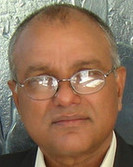
Part One
Now and then international news talks about some countries, like Greece, struggling horribly with their Public Debts, with their inability to pay those who have lent money to them in the past, their humiliation in begging the European Union to bail them out, and even leading to elections and changes in government.
Could Public Debt ever become an issue in Fiji?
Even with full information, it is difficult for even experienced economists or accountants to understand a country’s “public debt”, how it is being created, how it is being paid, who is supposed to be controlling it, who is supposed to be monitoring it, and what the consequences are for current and future generations.
When governments are secretive and refuse to give what ought to be public information to the Auditor General or Parliament, then Public Debt can become a nightmare.
There are so many variables, and imponderables, and questions:
Definitions and methods
There are fundamental disagreements between countries, organizations, economists and accountants about many aspects of “public debt”, to give a few:
* does the “government” also include all public enterprises and local governments?
* How should you define “gross deficit” and “net deficit”?
* Should public asset sales or purchases be included?
* Should “cash” or “accrual” accounting be used?
How government use the borrowed funds and how they pay for the debt
* what if the borrowing has been to pay for man-made financial disasters
* what if huge infrastructure projects are implemented wastefully with unnecessary profits being made by middlemen and contractors?
* what if the burdens of government revenue are not shared equally in society?
* what if the benefits of government expenditure are not shared equally?
Uncertainties about the future
* what happens to debt burdens if the economy grows poorly?
* what happens to debt burdens if the economy grows healthily?
* what happens if governments have borrowed too much from superannuation funds holding the savings (and pensions) of current and future generations
* what happens if governments have borrowed internationally where interest rates rise in future, or Fiji’s exchange rate depreciates relative to the currency borrowed in?
* what happens if large amounts of debt coincidentally become due in any particular year?
* What happens if the public are totally disinterested in what is happening to the public debt, which they pay for?
The answers to these questions (and there are many more), all help decide the current and future implications of public debt.
Who watches public debt on your behalf?
Fiji taxpayers ought to ask: who exactly monitors government on Fiji’s Public Debt?
There is a “Public Management and Cash Flow Committee” of the Ministry of Finance with representatives of the Reserve Bank of Fiji.
This Committee uses a standard Commonwealth Secretariat software to produce what I would expect to be comprehensive reports about risks to Government (there is also another useful UN software):
* is Public Debt becoming too high, relative to GDP and Government revenue?
* is the proportion of public debt to foreigners rising dangerously, subject to increased risks for Fiji given expected export revenues?
* is the balance between short term and long debt appropriate?
* what are the increased risks of interest rate and exchange rate changes?
* may there be cash flow problems ahead because some principal repayments on some loans may increase suddenly?
* will the Public Debt become extremely burdensome should the economy not grow as expected?
* will raising taxes in the future to pay for public debt reduce economic growth rates (as some academic studies suggest)?
There are also all kinds of warning indicators which the debt software monitors and reports on: such average rate of interest on public debt relative to rate of growth of GDP, Gross National Income, Exports, the Net Present Value of the Public Debt relative to Government Revenue.
When I wrote to the civil servant with direct oversight on Fiji’s Public Debt (Mr Isikeli Voceduadua) for the most current report, his reply (presumably directed by the PS Makereta Konrote, a new appointee) was that I would have to “formally write to Permanent Secretary of Economy stating reasons for such data request”.
Oh dear.
This professor of economics is well known throughout Fiji for writing community education articles on important economic issues affecting the country and taxpayers.
Why would civil servants, whose salaries are paid by taxpayers, demand to know why a professor of economics wants to read reports about Fiji’s Public Debt burdens?
This is yet another symptom of the horrible decay of ethics and public accountability of Fiji’s civil servants, who refuse to readily give what ought to be public information to the public who are affected by their decisions, and who pay their salaries.
No doubt, and understandably so, they are afraid for their jobs given that their masters are totally vindictive and unaccountable to society.
But that is why countries also become banana republics- because civil servants stop being servants of society, and become lapdogs of their ministers.
Non-Government monitoring
Usually elected parliamentarians would have on questioned government behalf of their voters, but the Bainimarama Government refused to call elections between 2006 and 2014.
Since 2014, some opposition parliamentarians, and especially Dr Biman Prasad, a professor in economics, have made critical comments, which are contemptuously ignored by the Bainimarama Government.
We know that visiting IMF, World Bank and ADB missionary teams sometimes give advice to Fiji governments, unfortunately never made available to the public.
The Reserve Bank of Fiji has now begun to publish comprehensive statistics on Fiji’s public debt, debt amortizations and interest rate payments (see the latest RBF 2016 Quarterly Review, Tables 45, 46 and 47). Unfortunately, however, there is no comprehensive analysis of the data in a way that the intelligent member of the public can understand.
The Reserve Bank of Fiji, once upon a time, used to give critical and independent, and often public advice to Fiji governments. But not any more, with senior RBF staff preferring to make public pronouncements on safe innocuous topics that do not endanger their jobs.
University academics used to do critical analyses, once upon a time. But not any more. Most, with the brave exception of Dr Neelesh Gounder, are cowering under their current oppressive managements.
What a pity.
Like the National Bank of Fiji disaster, you won’t know what you have got till it is gone (in the words of one of my favorite singers from the 60s, Joni Mitchell.
Now and then international news talks about some countries, like Greece, struggling horribly with their Public Debts, with their inability to pay those who have lent money to them in the past, their humiliation in begging the European Union to bail them out, and even leading to elections and changes in government.
Could Public Debt ever become an issue in Fiji?
Even with full information, it is difficult for even experienced economists or accountants to understand a country’s “public debt”, how it is being created, how it is being paid, who is supposed to be controlling it, who is supposed to be monitoring it, and what the consequences are for current and future generations.
When governments are secretive and refuse to give what ought to be public information to the Auditor General or Parliament, then Public Debt can become a nightmare.
There are so many variables, and imponderables, and questions:
Definitions and methods
There are fundamental disagreements between countries, organizations, economists and accountants about many aspects of “public debt”, to give a few:
* does the “government” also include all public enterprises and local governments?
* How should you define “gross deficit” and “net deficit”?
* Should public asset sales or purchases be included?
* Should “cash” or “accrual” accounting be used?
How government use the borrowed funds and how they pay for the debt
* what if the borrowing has been to pay for man-made financial disasters
* what if huge infrastructure projects are implemented wastefully with unnecessary profits being made by middlemen and contractors?
* what if the burdens of government revenue are not shared equally in society?
* what if the benefits of government expenditure are not shared equally?
Uncertainties about the future
* what happens to debt burdens if the economy grows poorly?
* what happens to debt burdens if the economy grows healthily?
* what happens if governments have borrowed too much from superannuation funds holding the savings (and pensions) of current and future generations
* what happens if governments have borrowed internationally where interest rates rise in future, or Fiji’s exchange rate depreciates relative to the currency borrowed in?
* what happens if large amounts of debt coincidentally become due in any particular year?
* What happens if the public are totally disinterested in what is happening to the public debt, which they pay for?
The answers to these questions (and there are many more), all help decide the current and future implications of public debt.
Who watches public debt on your behalf?
Fiji taxpayers ought to ask: who exactly monitors government on Fiji’s Public Debt?
There is a “Public Management and Cash Flow Committee” of the Ministry of Finance with representatives of the Reserve Bank of Fiji.
This Committee uses a standard Commonwealth Secretariat software to produce what I would expect to be comprehensive reports about risks to Government (there is also another useful UN software):
* is Public Debt becoming too high, relative to GDP and Government revenue?
* is the proportion of public debt to foreigners rising dangerously, subject to increased risks for Fiji given expected export revenues?
* is the balance between short term and long debt appropriate?
* what are the increased risks of interest rate and exchange rate changes?
* may there be cash flow problems ahead because some principal repayments on some loans may increase suddenly?
* will the Public Debt become extremely burdensome should the economy not grow as expected?
* will raising taxes in the future to pay for public debt reduce economic growth rates (as some academic studies suggest)?
There are also all kinds of warning indicators which the debt software monitors and reports on: such average rate of interest on public debt relative to rate of growth of GDP, Gross National Income, Exports, the Net Present Value of the Public Debt relative to Government Revenue.
When I wrote to the civil servant with direct oversight on Fiji’s Public Debt (Mr Isikeli Voceduadua) for the most current report, his reply (presumably directed by the PS Makereta Konrote, a new appointee) was that I would have to “formally write to Permanent Secretary of Economy stating reasons for such data request”.
Oh dear.
This professor of economics is well known throughout Fiji for writing community education articles on important economic issues affecting the country and taxpayers.
Why would civil servants, whose salaries are paid by taxpayers, demand to know why a professor of economics wants to read reports about Fiji’s Public Debt burdens?
This is yet another symptom of the horrible decay of ethics and public accountability of Fiji’s civil servants, who refuse to readily give what ought to be public information to the public who are affected by their decisions, and who pay their salaries.
No doubt, and understandably so, they are afraid for their jobs given that their masters are totally vindictive and unaccountable to society.
But that is why countries also become banana republics- because civil servants stop being servants of society, and become lapdogs of their ministers.
Non-Government monitoring
Usually elected parliamentarians would have on questioned government behalf of their voters, but the Bainimarama Government refused to call elections between 2006 and 2014.
Since 2014, some opposition parliamentarians, and especially Dr Biman Prasad, a professor in economics, have made critical comments, which are contemptuously ignored by the Bainimarama Government.
We know that visiting IMF, World Bank and ADB missionary teams sometimes give advice to Fiji governments, unfortunately never made available to the public.
The Reserve Bank of Fiji has now begun to publish comprehensive statistics on Fiji’s public debt, debt amortizations and interest rate payments (see the latest RBF 2016 Quarterly Review, Tables 45, 46 and 47). Unfortunately, however, there is no comprehensive analysis of the data in a way that the intelligent member of the public can understand.
The Reserve Bank of Fiji, once upon a time, used to give critical and independent, and often public advice to Fiji governments. But not any more, with senior RBF staff preferring to make public pronouncements on safe innocuous topics that do not endanger their jobs.
University academics used to do critical analyses, once upon a time. But not any more. Most, with the brave exception of Dr Neelesh Gounder, are cowering under their current oppressive managements.
What a pity.
Like the National Bank of Fiji disaster, you won’t know what you have got till it is gone (in the words of one of my favorite singers from the 60s, Joni Mitchell.
↧
↧
DEPORTED: "Am sitting in the airport, immigration broke into my hotel room this morning and forcefully removed my phone, refused embassy consult and deported me, as far as L.A., will board in an hour’ - Seaton
KAREN SEATON – FIJI RESIDENT PERMIT HOLDER, WHO LIVES ON HER PROPERTY IN KORO, DEPORTED OVER LAND RIGHTS
By MICK BEDDOES:
On the eve of the 10th anniversary of the Bainimarama Coup, Fiji First government Immigration officials broke into Miss Seaton’s room on Friday night, removed her mobile phones, denied her embassy consultation and deported her. This is part of her email I received it at 4.49am this morning.
From: Karen Seaton
Date: Fri, Dec 2, 2016 at 11:50 PM
‘Am sitting in the airport, the immigration broke into my hotel room this morning and forcefully removed my phone, refused embassy consult and deported me, as far as L.A., will board in an hour’
I had just met Karen via email a few weeks ago, when she brought to me issues for which she had been seeking redress from Government without even a single response. I recommended she make a submission to the Justice Law and Order & Human Rights Committee which was hearing submissions on the ‘Code of Conduct Bill. She agreed, so traveled from Koro for the presentation on Friday at 12 noon.
It was my opinion that the decision of government officials choosing not to respond to her multiple email pleas and submissions about her plight was inappropriate conduct by a government official and therefore testimony of Karen’s own life experience and the conduct of officials when dealing with her issues was relevant to formulating a Code of Conduct Bill to avoid such conduct occurring in the future.
Essentially Karen Seaton and the many thousands of foreign property holders in Fiji are protesting the unjust nature of the retrospective Land Sales Act, which effectively removed the value of freehold. Not all foreign landowners are wealthy, many have saved up for decades and bought their plots in Fiji to retire to and build a small but comfortable retirement home. To be suddenly saddled with the need to raise $250,000 and build a home in 24 months or be fined 10% of the value of the land you bought and $100,000 if you don’t complete the building on time, would hurt even a wealthy property owner.
The Law was enacted on December 15th 2014 and the 2 year period to build will end on December 31st 2016, so if the thousands of owners have not built their $250,000 homes by then, and many have not, then the penalty of 10% of the price they paid for the property will be applicable and payable at 6 monthly intervals until the home is built And anyone who contravenes this section shall be liable for a fine of $100,000.
Karen Seaton made her submissions to the Committee on Friday. Peter Waqavonovono and I were present as Peter presented our paper on the Public Order Act as well as the Code of Conduct Bill and Information Bill. Karen did well, she was challenged multiple times by the Fiji First members of the committee and at one stage the Police were summoned to take her away. I asked for a 2 minute recess to allow me to speak to Karen/ This was granted and I gave her some suggestions that would help allow her to complete her submissions and table all her documents, she did it.
And for standing up and protesting against the injustice done to her and many thousand others Karen Seaton was deported without being convicted and as far as I know no wrong doing has been proven. She has paid a price for speaking the truth. And we call this democracy?
Please!!!!!!!!!!!!!!!!
On the eve of the 10th anniversary of the Bainimarama Coup, Fiji First government Immigration officials broke into Miss Seaton’s room on Friday night, removed her mobile phones, denied her embassy consultation and deported her. This is part of her email I received it at 4.49am this morning.
From: Karen Seaton
Date: Fri, Dec 2, 2016 at 11:50 PM
‘Am sitting in the airport, the immigration broke into my hotel room this morning and forcefully removed my phone, refused embassy consult and deported me, as far as L.A., will board in an hour’
I had just met Karen via email a few weeks ago, when she brought to me issues for which she had been seeking redress from Government without even a single response. I recommended she make a submission to the Justice Law and Order & Human Rights Committee which was hearing submissions on the ‘Code of Conduct Bill. She agreed, so traveled from Koro for the presentation on Friday at 12 noon.
It was my opinion that the decision of government officials choosing not to respond to her multiple email pleas and submissions about her plight was inappropriate conduct by a government official and therefore testimony of Karen’s own life experience and the conduct of officials when dealing with her issues was relevant to formulating a Code of Conduct Bill to avoid such conduct occurring in the future.
Essentially Karen Seaton and the many thousands of foreign property holders in Fiji are protesting the unjust nature of the retrospective Land Sales Act, which effectively removed the value of freehold. Not all foreign landowners are wealthy, many have saved up for decades and bought their plots in Fiji to retire to and build a small but comfortable retirement home. To be suddenly saddled with the need to raise $250,000 and build a home in 24 months or be fined 10% of the value of the land you bought and $100,000 if you don’t complete the building on time, would hurt even a wealthy property owner.
The Law was enacted on December 15th 2014 and the 2 year period to build will end on December 31st 2016, so if the thousands of owners have not built their $250,000 homes by then, and many have not, then the penalty of 10% of the price they paid for the property will be applicable and payable at 6 monthly intervals until the home is built And anyone who contravenes this section shall be liable for a fine of $100,000.
Karen Seaton made her submissions to the Committee on Friday. Peter Waqavonovono and I were present as Peter presented our paper on the Public Order Act as well as the Code of Conduct Bill and Information Bill. Karen did well, she was challenged multiple times by the Fiji First members of the committee and at one stage the Police were summoned to take her away. I asked for a 2 minute recess to allow me to speak to Karen/ This was granted and I gave her some suggestions that would help allow her to complete her submissions and table all her documents, she did it.
And for standing up and protesting against the injustice done to her and many thousand others Karen Seaton was deported without being convicted and as far as I know no wrong doing has been proven. She has paid a price for speaking the truth. And we call this democracy?
Please!!!!!!!!!!!!!!!!
Idyllic Fiji Transforms Into Nightmarish Trap for Investor Dave Rand and Fiji Land Owners Association Members
International investment risk escalates in Fiji: Piracy is alive and well in the South Pacific
"After commercial property values appreciated towards hundreds of millions of dollars in metropolitan areas, the new Fiji government, in an effort headed by Fiji's Attorney General Aiyaz Sayed-Khaiyum, rushed through parliament a piece of legislation in December 2014 known as Act 16 of the Land Sales Act with little debate and no public scrutiny. The law is being applied retrospectively upon non-citizen free-hold landowners by attaching new legal consequences (FJ $50,000 fines and even imprisonment) to events already completed (sales contracts executed under previously existing laws) if they do not build homes at a minimum cost of FJ $250,000 on their lots by the end of this year. The law will disproportionately punish small lot owners - many who wish only to retire in Fiji - by drawing no distinctions between them and speculative commercial real estate investors." -
David Rand, Fiji Land Owners Association, 23371 Mulholland Dr #288
Woodland Hills , CA 91364
http://www.eworldwire.com/pressreleases/314544
Fijileaks: What about those who bought plots of land on Naisoso Island?
What about Fiji's biggest "Mr Shifty" who bought a plot of land at Wailoaloa, Nadi, but is yet to build a home on it, and lied about its true value, in his Political Parties Decree declaration?
↧
VIVA PALESTINA (Long Live Palestine): As Bainimarama invites Israeli Prime Minister Netanyahu to Fiji, UN General Assembly President Peter Thomson (of Fiji) flies the Palestinian flag by wrapping it as his scarf!
"As a life-long campaigner and marcher for Palestinians right to self-determination, we say with Peter Thomson VIVA PALESTINA -
Long Live Palestine"
Israeli Ambassador to the United Nations Danny Danon charges that 'it's unacceptable for the GA president, whose position symbolizes neutrality, to don a Palestinian flag.'.
Peter Thomson attends special meeting marking the 'International Day of Solidarity with the Palestinian People'; Israeli Ambassador Danny Danon charges that 'it's unacceptable for the GA president, whose position symbolizes neutrality, to don a Palestinian flag.'.Thomson attended a special meeting of the UN's Committee on the Exercise of the Inalienable Rights of the Palestinian People (CEIRPP) on Tuesday to mark the International Day of Solidarity with the Palestinian People while wearing a Palestinian flag scarf.
The day of solidarity is marked on November 29, the date of the UN resolution adopting the Partition Plan, which paved the way for the end of the British mandate and the establishment of the State of Israel several months later
↧
FACE UP to being Fooled: Khaiyum claims Bainimarama was at the InstaCharge launch like other guests. If so, why was he keynote speaker; Why Fiji government removed all photos and video from its Facebook?
FLYING IN KHAIYUM'S FACE: Here is Bainimarama launching InstaCharge to the shouts of 10, 9, 8, 7, 6, 5, 4, 3, 2, 1, 0. Even his daughter, the CEO of Fiji Sports Council, is mentioned by name:
'You have no excuse to claim that you couldn't call back because your battery was dead...Downlaod InstaCharge Now...'; The Las Vegas "Inventor" Douglas Stewart told us on his Facebook that
"Bye, Fiji, Dubai, Next". Now, even Dubai has disappeared from his FB!
Professor Shawkat Ali, Dean of the Department of Computer Science and Information Technology at the University of Fiji, said he did not know anyone in Fiji who had seen or downloaded the app since its launch a week ago, and he and his academic colleagues found it “impossible” to accept the company’s claims. “The academic community in Fiji is not accepting the claims of this company ... what they are claiming to be able to do is 100% impossible ... I don’t know anyone in Fiji who has
used the app, no one.”
"He [Bainimarama] used the occasion to actually highlight Fiji's position in the ICT sector, he did not at any stage endorse the product, he did not say the product works, he did not say I'm pleased to launch this application. He essentially used the opportunity to highlight the fact that Fiji has made great strides in telecommunications, in particular in the ICT sector." - Aiyaz Khaiyum
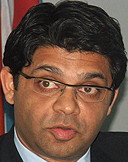
A-G clears the air
Monday, December 05, 2016
THE Fiji Government says Prime Minister Voreqe Bainimarama's presence and speech at the launch of the Instacharge app was not an endorsement of the much maligned mobile application.
Minister for Economy and Attorney-General Aiyaz Sayed-Khaiyum said the occasion merely afforded the PM an opportunity to outline Fiji's progress in the ICT sector.
"He used the occasion to actually highlight Fiji's position in the ICT sector, he did not at any stage endorse the product, he did not say the product works, he did not say I'm pleased to launch this application.
"He essentially used the opportunity to highlight the fact that Fiji has made great strides in telecommunications, in particular in the ICT sector."
Mr Sayed-Khaiyum said if the PM was to have endorsed the app, the Government would have first verified the product.
"Of course there were other people there too, we had some heads of missions who were at the launch, the head of Digicel was also there from what we understand, it does not mean that by their mere presence that they were saying the application works."
He added the app was not for sale in Fiji and would not be unless mobile providers Digicel and Vodafone gave it the thumbs up, adding Fiji also had proper legislation and consumer representation bodies to ensure consumers were not duped.
"Should there be any issues pertaining to consumer rights being in any way breached we have enough protection, we also have the Fair Trading Act that is in place we also have the Fiji Commerce Commission and the Consumer Council of Fiji so all of that can be put to rest."
The app has been widely criticised for what experts say are its impossible promises to store extra battery charge when a phone is charged overnight.
Once the battery runs low, the app creators — American Douglas Stewart and his Fijian businessman partner Gaurangbhai Patel claim the extra charge can then be returned to the phone through the app.
However, this has not been independently verified. Source: Fiji Times, 5 December 2006
Monday, December 05, 2016
THE Fiji Government says Prime Minister Voreqe Bainimarama's presence and speech at the launch of the Instacharge app was not an endorsement of the much maligned mobile application.
Minister for Economy and Attorney-General Aiyaz Sayed-Khaiyum said the occasion merely afforded the PM an opportunity to outline Fiji's progress in the ICT sector.
"He used the occasion to actually highlight Fiji's position in the ICT sector, he did not at any stage endorse the product, he did not say the product works, he did not say I'm pleased to launch this application.
"He essentially used the opportunity to highlight the fact that Fiji has made great strides in telecommunications, in particular in the ICT sector."
Mr Sayed-Khaiyum said if the PM was to have endorsed the app, the Government would have first verified the product.
"Of course there were other people there too, we had some heads of missions who were at the launch, the head of Digicel was also there from what we understand, it does not mean that by their mere presence that they were saying the application works."
He added the app was not for sale in Fiji and would not be unless mobile providers Digicel and Vodafone gave it the thumbs up, adding Fiji also had proper legislation and consumer representation bodies to ensure consumers were not duped.
"Should there be any issues pertaining to consumer rights being in any way breached we have enough protection, we also have the Fair Trading Act that is in place we also have the Fiji Commerce Commission and the Consumer Council of Fiji so all of that can be put to rest."
The app has been widely criticised for what experts say are its impossible promises to store extra battery charge when a phone is charged overnight.
Once the battery runs low, the app creators — American Douglas Stewart and his Fijian businessman partner Gaurangbhai Patel claim the extra charge can then be returned to the phone through the app.
However, this has not been independently verified. Source: Fiji Times, 5 December 2006
↧
BEATING JUSTICE: Amnesty's latest report is a sad long catalogue of buturaki in Fiji. It all started with coupist Sitiveni Rabuka, once described as "Klaus Barbie" - today wrapped in immunity, and leading SODELPA!

Monday 5 Dec 2016 10:19 a.m.
Fiji man Vilikesa Soko was suspected of robbery, but never got a chance to defend himself in court - he was beaten and raped in custody by officers and later died. The 30-year-old father-of-three's case was one of several documented in a graphic Amnesty International report documenting the routine use of torture in the Pacific island nation.
The 'Beating Justice: How Fiji's Security Forces Get Away with Torture' report, released on Monday, says there's an "ingrained culture of torture" in the Pacific holiday hotspot, with the military in charge of key institutions since the 2006 coup.
Amnesty is calling for that to end, and for members of the military to be held accountable under the law. The report says beatings are the most common form of torture, with five reported cases where people were beaten to death while in custody. It details the use of threats to intimidate people and coerce confessions.
There are also accounts of routine violence against those suspected of crime, including beatings, rape, sexual violence, attacks by police dogs and shootings. Mr Soko died in August 2014, four days after being beaten. He'd developed a blood clot in one of his lungs, a result of the traumatic injuries he received.
The details of his death were made public after an autopsy report was leaked online (Fijileaks: http://www.fijileaks.com/home/brutal-proof-here-is-the-evidence-of-rear-admiral-voreqe-bainimarama-and-his-lawmaker-khaiyums-police-brutality-yes-robbery-suspect-soko-as-revealed-by-fijileaks-was-abused-and-killed-by-regime-police-thugs)
"Torture does not just humiliate the victim. It also debases the torturer by hollowing out their humanity," said Kate Schuetze, Amnesty International's pacific researcher.
"Not only do the security forces know that torture is taking place, they have stood in the way of accountability. While the Fijian authorities have ratified the UN Convention Against Torture and pledged to end this cruel practice, it will remain an empty gesture until decisive action is taken."
In January 2007, two people died after being beaten by military officers - those responsible were released within a month of being sentenced to four-year terms.
The report also documents a case of five men, accused of robbing a Nadi shop, having crushed chilies rubbed on their bodies, water poured in their ears and rocks dropped on their backs. They were beaten until they confessed.
Lawyers of torture survivors have also been targets of violence.
Amnesty says Prime Minister Frank Bainimarama condones the behaviour and the "climate of near-impunity", where officials don't face justice for human rights violations.
Torture details are often suppressed by authorities, but videos and autopsy reports are later leaked online
"In the face of these reports, the government has not only refused to condemn the torture that took place, but in some cases have offered the security officials its unequivocal support," the report says.
Amnesty International report: 'Beating Justice: How Fiji's Security Forces Get Away with Torture' by NewshubNZ on Scribd
See also in PDF form, below:
“Every time we shrug when we hear of another midnight raid, the cries of terrorized women and children, then somewhere in Fiji another potential [Klaus] Barbie [The Nazi Butcher of Lyon in France] is getting a start in life,” said the former Methodist communications secretary in 1987, the Reverend Akuila Yabaki
As Minister for Internal Security, Mr Rabuka had extraordinary range of powers, which violated international standards of human rights, including the detention of any person for two years; order restriction of movement, freedom of expression, employment, residence or activity; prohibit the printing, publication, sale, issue, circulation or possession of any written material, and prohibit its communication through word of mouth etc. And yet Mr Rabuka was free to publish his book “No Other Way”. But no criticism of his book was permitted, and one USP Indo-Fijian lecturer who dared to criticise it, was detained and severely beaten up. - VICTOR LAL

Rabuka’s 1987 terror regime: A WARNING
By VICTOR LAL
29 December 2006
“Every time we shrug when we hear of another midnight raid, the cries of terrorized women and children, then somewhere in Fiji another potential [Klaus] Barbie [The Nazi Butcher of Lyon in France] is getting a start in life,” said the former Methodist communications secretary in 1987, the Reverend Akuila Yabaki, now head of the Citizens Constitutional Forum.
He was speaking out against the reign of terror and torture practised mostly against the Indo-Fijian community by Sitiveni Rabuka, his military henchmen, prominent chiefs, and the dreaded and racist Fijian taukei foot soldiers following the 1987 coups.
Now, nearly twenty years later, we are beginning to hear the first ripples of ‘torture tactics’ by the military against the pro-democracy supporters. But let us hope and pray that Commodore Frank Bainimarama’s military will not go down the road that Mr Rabuka took his troops, chiefs, and taukeists like Apisai Tora to achieve his objective of ‘Fiji for the taukei Fijians’.
The first casualty was the media when Mr Rabuka launched his coup on 14 May 1987. In an editorial on 15 May, the old Fiji Sun asked: “What right has a third-ranking officer to attack the scared institutions of Parliament? To presume he knows how best this country shall be governed for the good of all? The answer is: NONE. The people must decide their own future: not self-promoting dictators and not a Council appointed by and presided over by Lieutenant-Colonel Rabuka. But was he encouraged by others to act? And if so, who were they?”
We now know who they were, and many of those are still around, in positions of influence and authority. Most of them were prominent paramount chiefs, civil servants, church leaders, lawyers, magistrates, judges, and fallen politicians. They were indigenous Fijians, some of whom, and their offspring, are today hiding from the military in a great game of hide and seek following the 5 December coup. The former governor-general and Mr Rabuka’s paramount chief Ratu Sir Penaia Ganilau, made it easier for Mr Rabuka to crush civil disobedience by warning that the civilian-cum military regime would not hesitate to use emergency powers it had under martial law.
On 15 May 1987, shortly after the Fiji Sun editorial, the Ministry of Information directed the Fiji Times and Fiji Sun to cease publication. The RFMF occupied Radio Fiji. The same day armed soldiers’ ejected staff of both the two newspapers from their offices, and foreign journalists were questioned by the RFMF. In a sickening spectacle, the raid on the Times office was led by one of its own reporters and army reservist E.T. Volavola in full combat gear carrying a rifle and backed up by a squad of troops.
Mr Rabuka announced a Council of Ministers (COM), which was dominated by ex-Alliance Party Ministers (including Ratu Mara who had lost the election to Dr Timoci Bavadra). Mr Rabuka said his military regime was in full control and the people had accepted the coup, and called on the international community to recognize his regime. He said he had abrogated the Constitution and the regime would govern Fiji by decree. He brushed aside the demands of the Council of Churches “in the name of Christianity” to release the MPs he had kidnapped and was holding as hostages, and “surrender to the sovereign authority of the land”, and restore “our duly elected government”.
He instead moved into deposed Prime Minister Dr Bavadra’s office. But when the Fiji Sun questioned Mr Rabuka’s right to occupy high office, he threw the general manager and one of the directors, who was also President of the Fiji Law Society, in the same prison cell as that occupied by Dr Bavadra. The Sun was singled out for severe maltreatment. Sadly, most of the harassment and intimidation was carried out against the Indo-Fijian journalists, for after all, Mr Rabuka had executed the coup to give Fijians the control of Fiji.
Some Fijian journalists, therefore, switched sides, and became Mr Rabuka’s propagandists, reporting on their Indo-Fijian colleagues and their families. In the end, the Fiji Times agreed to operate under partial military censorship, while the old Fiji Sun was forced to cease operations in the country after it published allegations that Mr Rabuka had bought a house in Suva favoured by wealthy Indo-Fijians and expatriates, on a 100% mortgage from a prominent Alliance politician. In the end, some of Fiji’s best Indo-Fijian journalists were forced to emigrate or seek political asylum abroad. Some of us were not only on Mr Rabuka’s hit list but even had our passports confiscated, ending up overnight from being citizens to wandering international refugees.
The next group that Mr Rabuka and his cronies targeted were his political opponents. Shortly before the coup the taukeists firebombed the law offices of Jai Ram Reddy, now an International Criminal Court judge. The late Sir Vijay Singh was detained and his passport seized, prompting him to ask: “What kind of normalcy is [Ganilau] thinking about when things like this happen.”
Dr Bavadra’s spokesman and current Suva lawyer Richard Naidu was arrested and detained on different occasions. He was chased and beaten up by Taukeists, and finally had his Fiji nationality revoked, and ordered to leave the country for New Zealand. Another legal adviser of Dr Bavadra, John Cameron, had his work permit withdrawn after he filed civil suit against dissolution of Parliament, and had also filed claim with the Supreme Court on behalf of a client harassed by the RFMF, seeking a declaration that State of Emergency and 1987 Emergency Regulations were unconstitutional.
Among judges arrested included Justices Kishore Govind and Rooney, including Chief Magistrate Howard Morrison. Even the Police Commissioner, an Indo-Fijian Pramesh Raman, whose job Mr Rabuka had applied a week before the coup, was taken into custody. Several Indo-Fijian lawyers and academics were also taken into custody, mostly on legal advice of some Fijian lawyers.
Although the vast majority of victims were Indo-Fijians, some prominent Fijians like Amelia Rokotuivanua and Dr Steven Ratuva came in for rough treatment. The two were “lectured” by Lieutenant Pio Wong on how to be “true Fijians” and Dr Ratuva had spells in detention, and at one point the military allegedly tried to poison him with the prepared food it had brought to his house. In 1986 he had claimed in a paper that the RFMF’s only function lay in internal repression or as a conduit for chiefly advancement. He had also suggested that “intermarriages between the sons and daughters of chiefs (including the chiefly officers in the army) helps to consolidate the chiefly comprador clique which ensures the perpetuation of nepotism and inequality in Fijian society”.
On 25 September Mr Rabuka carried out his second coup. Violence and intimidation was encouraged, and a group of escaped prisoners were escorted by the military to march to the Government House to demand pardons. When the GCC refused to recognise Mr Rabuka as president, he declared Fiji a republic, declared himself the head of state and no longer recognised the GCC as such. However, on 5 December he agreed to hand over power to the new President Ratu Penaia and the Prime Minister Ratu Mara. Mr Rabuka took charge of Home Affairs, the CJ returned to the bench, Sailosi Kepa was recalled as High Commissioner from London to take over as Minister for Justice and A-G, and Berenado Vunibobo became Minister of Trade and Commerce. Dr Bavadra retorted: “It is a military government in a civilian cloak.”
The international community resumed trade and diplomatic links with Fiji. Australia conferred Mr Rabuka legitimacy by announcing that it was recognizing Fiji as a state rather than the government of Fiji. Ratu Penaia granted Mr Rabuka and his close circle of oppressors, questionable amnesty, and the Fijians introduced apartheid against the Indo-Fijians. Ratu Penaia also formally signed new Internal Security Decree, giving army power to shoot to kill anyone found with illegal arms that resisted arrests.
As Minister for Internal Security, Mr Rabuka had extraordinary range of powers, which violated international standards of human rights, including the detention of any person for two years; order restriction of movement, freedom of expression, employment, residence or activity; prohibit the printing, publication, sale, issue, circulation or possession of any written material, and prohibit its communication through word of mouth etc.
And yet Mr Rabuka was free to publish his book “No Other Way”. But no criticism of his book was permitted, and one USP Indo-Fijian lecturer who dared to criticise it, was detained and severely beaten up. My own critical counter-book Fiji: Coups in Paradise was banished from the bookshelves of Fiji. As Mr Rabuka plunged the economy into a decline, he was offered $50,000 from an Australian publishing company as a retainer for his book and a TV documentary. The RFMF, commenting on brief detentions and harassment said, “Due to the current conditions everyone is suspect until proven innocent”. Mr Rabuka went on to become the Prime Minister and chairman of the Great Council of Chiefs on the bandwagon of nationalist and racist ideology, an ideology which Commodore Bainimarama claims he wants to stamp out once and for all.
If that is so, let us hope that he will not follow in the footsteps of Mr Rabuka, for many of my own family members still bear the scars of Mr Rabuka’s storm troopers on their chests, and so do many other citizens from the 1987 and 2000 coups.
The Indo-Fijians, in 1987, were beaten, forced to stand in sewage pools, and subjected to other forms of humiliating punishments.
The vast majority of Fijians remained silent to the oppression and racism in their midst. In fact, many joined in its continuation for the next ten years. But freedom, as former military strongman Mr Rabuka found out only very recently (after he was successfully defended by the President of the Fiji Law Society, Mr Sharma, on inciting mutiny), is a cherished and inviolable right.
By VICTOR LAL
29 December 2006
“Every time we shrug when we hear of another midnight raid, the cries of terrorized women and children, then somewhere in Fiji another potential [Klaus] Barbie [The Nazi Butcher of Lyon in France] is getting a start in life,” said the former Methodist communications secretary in 1987, the Reverend Akuila Yabaki, now head of the Citizens Constitutional Forum.
He was speaking out against the reign of terror and torture practised mostly against the Indo-Fijian community by Sitiveni Rabuka, his military henchmen, prominent chiefs, and the dreaded and racist Fijian taukei foot soldiers following the 1987 coups.
Now, nearly twenty years later, we are beginning to hear the first ripples of ‘torture tactics’ by the military against the pro-democracy supporters. But let us hope and pray that Commodore Frank Bainimarama’s military will not go down the road that Mr Rabuka took his troops, chiefs, and taukeists like Apisai Tora to achieve his objective of ‘Fiji for the taukei Fijians’.
The first casualty was the media when Mr Rabuka launched his coup on 14 May 1987. In an editorial on 15 May, the old Fiji Sun asked: “What right has a third-ranking officer to attack the scared institutions of Parliament? To presume he knows how best this country shall be governed for the good of all? The answer is: NONE. The people must decide their own future: not self-promoting dictators and not a Council appointed by and presided over by Lieutenant-Colonel Rabuka. But was he encouraged by others to act? And if so, who were they?”
We now know who they were, and many of those are still around, in positions of influence and authority. Most of them were prominent paramount chiefs, civil servants, church leaders, lawyers, magistrates, judges, and fallen politicians. They were indigenous Fijians, some of whom, and their offspring, are today hiding from the military in a great game of hide and seek following the 5 December coup. The former governor-general and Mr Rabuka’s paramount chief Ratu Sir Penaia Ganilau, made it easier for Mr Rabuka to crush civil disobedience by warning that the civilian-cum military regime would not hesitate to use emergency powers it had under martial law.
On 15 May 1987, shortly after the Fiji Sun editorial, the Ministry of Information directed the Fiji Times and Fiji Sun to cease publication. The RFMF occupied Radio Fiji. The same day armed soldiers’ ejected staff of both the two newspapers from their offices, and foreign journalists were questioned by the RFMF. In a sickening spectacle, the raid on the Times office was led by one of its own reporters and army reservist E.T. Volavola in full combat gear carrying a rifle and backed up by a squad of troops.
Mr Rabuka announced a Council of Ministers (COM), which was dominated by ex-Alliance Party Ministers (including Ratu Mara who had lost the election to Dr Timoci Bavadra). Mr Rabuka said his military regime was in full control and the people had accepted the coup, and called on the international community to recognize his regime. He said he had abrogated the Constitution and the regime would govern Fiji by decree. He brushed aside the demands of the Council of Churches “in the name of Christianity” to release the MPs he had kidnapped and was holding as hostages, and “surrender to the sovereign authority of the land”, and restore “our duly elected government”.
He instead moved into deposed Prime Minister Dr Bavadra’s office. But when the Fiji Sun questioned Mr Rabuka’s right to occupy high office, he threw the general manager and one of the directors, who was also President of the Fiji Law Society, in the same prison cell as that occupied by Dr Bavadra. The Sun was singled out for severe maltreatment. Sadly, most of the harassment and intimidation was carried out against the Indo-Fijian journalists, for after all, Mr Rabuka had executed the coup to give Fijians the control of Fiji.
Some Fijian journalists, therefore, switched sides, and became Mr Rabuka’s propagandists, reporting on their Indo-Fijian colleagues and their families. In the end, the Fiji Times agreed to operate under partial military censorship, while the old Fiji Sun was forced to cease operations in the country after it published allegations that Mr Rabuka had bought a house in Suva favoured by wealthy Indo-Fijians and expatriates, on a 100% mortgage from a prominent Alliance politician. In the end, some of Fiji’s best Indo-Fijian journalists were forced to emigrate or seek political asylum abroad. Some of us were not only on Mr Rabuka’s hit list but even had our passports confiscated, ending up overnight from being citizens to wandering international refugees.
The next group that Mr Rabuka and his cronies targeted were his political opponents. Shortly before the coup the taukeists firebombed the law offices of Jai Ram Reddy, now an International Criminal Court judge. The late Sir Vijay Singh was detained and his passport seized, prompting him to ask: “What kind of normalcy is [Ganilau] thinking about when things like this happen.”
Dr Bavadra’s spokesman and current Suva lawyer Richard Naidu was arrested and detained on different occasions. He was chased and beaten up by Taukeists, and finally had his Fiji nationality revoked, and ordered to leave the country for New Zealand. Another legal adviser of Dr Bavadra, John Cameron, had his work permit withdrawn after he filed civil suit against dissolution of Parliament, and had also filed claim with the Supreme Court on behalf of a client harassed by the RFMF, seeking a declaration that State of Emergency and 1987 Emergency Regulations were unconstitutional.
Among judges arrested included Justices Kishore Govind and Rooney, including Chief Magistrate Howard Morrison. Even the Police Commissioner, an Indo-Fijian Pramesh Raman, whose job Mr Rabuka had applied a week before the coup, was taken into custody. Several Indo-Fijian lawyers and academics were also taken into custody, mostly on legal advice of some Fijian lawyers.
Although the vast majority of victims were Indo-Fijians, some prominent Fijians like Amelia Rokotuivanua and Dr Steven Ratuva came in for rough treatment. The two were “lectured” by Lieutenant Pio Wong on how to be “true Fijians” and Dr Ratuva had spells in detention, and at one point the military allegedly tried to poison him with the prepared food it had brought to his house. In 1986 he had claimed in a paper that the RFMF’s only function lay in internal repression or as a conduit for chiefly advancement. He had also suggested that “intermarriages between the sons and daughters of chiefs (including the chiefly officers in the army) helps to consolidate the chiefly comprador clique which ensures the perpetuation of nepotism and inequality in Fijian society”.
On 25 September Mr Rabuka carried out his second coup. Violence and intimidation was encouraged, and a group of escaped prisoners were escorted by the military to march to the Government House to demand pardons. When the GCC refused to recognise Mr Rabuka as president, he declared Fiji a republic, declared himself the head of state and no longer recognised the GCC as such. However, on 5 December he agreed to hand over power to the new President Ratu Penaia and the Prime Minister Ratu Mara. Mr Rabuka took charge of Home Affairs, the CJ returned to the bench, Sailosi Kepa was recalled as High Commissioner from London to take over as Minister for Justice and A-G, and Berenado Vunibobo became Minister of Trade and Commerce. Dr Bavadra retorted: “It is a military government in a civilian cloak.”
The international community resumed trade and diplomatic links with Fiji. Australia conferred Mr Rabuka legitimacy by announcing that it was recognizing Fiji as a state rather than the government of Fiji. Ratu Penaia granted Mr Rabuka and his close circle of oppressors, questionable amnesty, and the Fijians introduced apartheid against the Indo-Fijians. Ratu Penaia also formally signed new Internal Security Decree, giving army power to shoot to kill anyone found with illegal arms that resisted arrests.
As Minister for Internal Security, Mr Rabuka had extraordinary range of powers, which violated international standards of human rights, including the detention of any person for two years; order restriction of movement, freedom of expression, employment, residence or activity; prohibit the printing, publication, sale, issue, circulation or possession of any written material, and prohibit its communication through word of mouth etc.
And yet Mr Rabuka was free to publish his book “No Other Way”. But no criticism of his book was permitted, and one USP Indo-Fijian lecturer who dared to criticise it, was detained and severely beaten up. My own critical counter-book Fiji: Coups in Paradise was banished from the bookshelves of Fiji. As Mr Rabuka plunged the economy into a decline, he was offered $50,000 from an Australian publishing company as a retainer for his book and a TV documentary. The RFMF, commenting on brief detentions and harassment said, “Due to the current conditions everyone is suspect until proven innocent”. Mr Rabuka went on to become the Prime Minister and chairman of the Great Council of Chiefs on the bandwagon of nationalist and racist ideology, an ideology which Commodore Bainimarama claims he wants to stamp out once and for all.
If that is so, let us hope that he will not follow in the footsteps of Mr Rabuka, for many of my own family members still bear the scars of Mr Rabuka’s storm troopers on their chests, and so do many other citizens from the 1987 and 2000 coups.
The Indo-Fijians, in 1987, were beaten, forced to stand in sewage pools, and subjected to other forms of humiliating punishments.
The vast majority of Fijians remained silent to the oppression and racism in their midst. In fact, many joined in its continuation for the next ten years. But freedom, as former military strongman Mr Rabuka found out only very recently (after he was successfully defended by the President of the Fiji Law Society, Mr Sharma, on inciting mutiny), is a cherished and inviolable right.
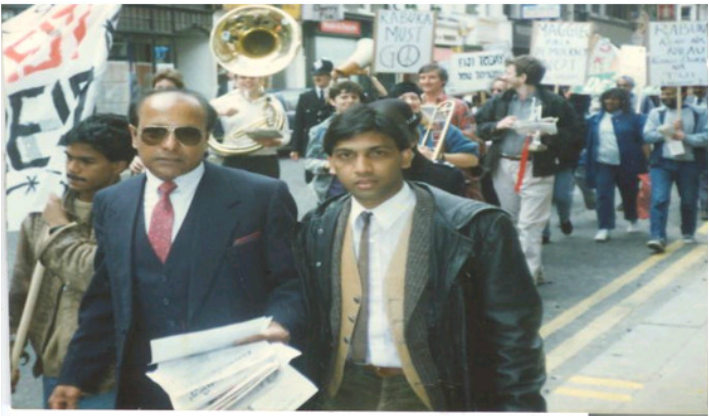
MARCHING AGAINST TORTURE, COUP AND RABUKA'S VIOLENCE: Fijileaks founding editor-in-chief Victor Lal (right) and Mohammed Rafiq Kahan in London. Both were implicated by military dictator Sitiveni Rabuka and his henchmen with plotting to violently overthrow his racist regime by shipping tons of weapons to Fiji. Nelson Mandela: "If I had my time over I would do the same again. So would any man who dares call himself a man." - November 1962. Mitigation speech after being convicted of inciting a strike and leaving the country illegally
↧
↧
RUSSELL HUNTER: 'Ten years ago on 5 December 2006 he [FRANK Bainimarama] took over the [Qarase] government of Fiji in an act of treason...Surely, [I thought] the people of Fiji would not put up with him?
"He has proved us all wrong. The patience of “the people” has turned to be all but endless and the next intake of first-time voters will not know of Fiji under democratic rule...And now with Bainimarama’s “clean up” campaign all but complete corruption – claimed as a trigger for his coup – is endemic. Decisions are made, deals are done, and fortunes are made - all behind closed doors. And Fiji sucks in the snake oil salesmen as never before. Nevertheless the reality is that while the seething resentment hasn’t gone away, neither has Frank.
Age alone can stop Frank now."
 Hunter
Hunter By RUSSELL HUNTER
“I never wanted this job,” Fiji’s dictator Frank Bainimarama told an Australian journalist a month after his “clean-up” coup of 5 December 2006.
Unlike so many of his public statements of the time it may not have been an outright lie.
For while he had been determined to retain his military job and thus keep secret his true and shameful role in the coup that removed the elected government of Mahendra Chaudhry in 2000 and his subsequent alleged association with the murders of six Counter-Revolutionary Warfare unit soldiers later that year; he may not have originally imagined that he’d have to remove the government in order to do it.
But the seeds were sown three years earlier when the government of Laisenia Qarase (which Bainimarama was partly responsible for putting in place) decided not to renew his contract as commander of the armed forces. Bainimarama felt owed. After all, he’d betrayed his own people and narrowly escaped their attempt to murder him in retaliation in order to, as her saw it, create this government that was now turning against him.
When his senior officers refused to support him in a coup aimed to keep his job the road must have become clearer for Voreqe Bainimarama.
After another attempt failed – again because he lacked support among senior staff – Bainimarama weeded out opposition in his own ranks and even campaigned against the government in the election of 2006. He was rejected again, this time by the electorate, and it stung.
Qarase’s team won a convincing victory in May 2006 and was guaranteed by a solid parliamentary majority, to serve another term. It was poison to Bainimarama who knew his position was far from secure.
By November of that year the police were awaiting an opportunity to arrest him on charges of sedition. Seeking to avoid a bloody confrontation between themselves and Bainimarama’s 16-strong and heavily armed security detail, they bided their time. Bainimarama knew it and knew he had to act if he was to avoid spending the rest of his life in jail.
Ten years ago on 5 December 2006 he took over the government of Fiji in an act of treason.
Politicians tell lies. They make promises they know they have no intention of keeping. They see such things as necessary evils among the means to achieve and retain power in the hope that, once elected, they will be able to govern for the greater good as they see it.
But Bainimarama was no politician (though he has learned much of that dark art in 10 years). He was a military man for whom the mission justified all and any means to fulfil it. And his mission now was to appoint himself leader of his country and to run it his way for his good.
But why the lies? Why when he had all the guns, all the troops, all the aces in the pack did he feel the need to lie to his people, presumably to win their support? And in his “inaugural address” with a straight face, he told some whoppers. These are too many to detail here but “no member of the RFMF will benefit from this coup” and “fresh elections in six months” give the flavour of his speech.
But, again, why the need to utter such brazen untruths? It’s likely that he felt insecure, that in those early days his position was precarious. Certainly there was much Dutch courage being taken at the officers’ mess at that time when as one former senior officer put it to me “They’re shit scared of a public uprising”.
And while it may explain his need to placate public opinion on Day One, that fear has never left him (though he did in an unguarded moment proclaim that he had no need to pay attention to public opinion). There’s no crime without guilt.
So what sort of man was Josaia Voreqe Bainimarama at that time a decade ago? Former police commissioner Andrew Hughes (whose disgraceful and disgusting treatment at the hands of his then military counterpart has been well-documented here and elsewhere) recalls him as affable but not without inner demons. Hughes, like most senior police officers a keen observer of humanity, remembers a good sense of humour but a certain fragility. Their meetings would always take place at Bainimarama’s office (“I always had to go to him”) while Hughes became convinced his counterpart was suffering from Post Trauma Stress Disorder. “After all, they tried to kill him”.
Some former officers are less generous. Some say he was and is an outright coward (presumably because of his abandonment of his men under fire) while more considered respondents regard him as man without moral compass, a narcissist who subordinates everything and anything to his own wants.
Whatever the truth, he was to command Fiji for ten years. He still does.
After a few false starts – most notably the People’s Charter (whatever happened to that?), Fiji began to understand just what Bainimarama meant when he spoke repeatedly of his vision for “true democracy”. It’s clear now that what he meant was the people’s freedom to do as he ordered.
In echoes of dictatorships throughout history the “people” would be invoked at every turn in an effort to promote the fiction of a popular base.
Thus the People’s Charter was foisted on the “people” whether or not they wanted – or cared about – it. Similarly the much-touted People’s Constitution that appeared to replace it finally emerged as two people’s constitution after it became clear that the “people” had no stomach for what Bainimarama wanted and the document that did reflect the wishes of the “people” was burned.
But before any of that could happen, Bainimarama needed to get his hands on all the controls and remove all obstacles. Thus the Great Council of Chiefs had to go, the Methodist Church had to be neutralised. The media (as we shall see), the justice system, the banking system, the civil service, the police, the prisons system and even the monopoly pension fund would all have to bend to the will of one man. Or else.
Bainimarama’s right hand in all of this and more has been Aiyaz Sayed-Khaiyum, the former bank lawyer whose vaulting ambition has brought him close to the pinnacle of power. It’s almost certainly misguided but many ethnic Fijians are convinced – very possibly for base racist reasons – that Frank is merely the glove puppet with Khaiyum’s hand at its heart. It’s an untrue image but there can be little doubt that it exists in popular myth.
But the indefatigable Attorney General and minister for much else has delivered a conveyor belt of decrees, Acts and rules all aimed squarely at making his boss’s power absolute behind a thin veil of fictional legality. George Orwell, the author of Animal Farm and 1984, would have instantly recognised Bainimarama’s Fiji – a land in which the law is precisely what he says it is on any given day, a land in which there is no dissent allowed, where “Big Brother” is constantly on watch for behaviour and thoughts that venture beyond the frontiers of the norm.
An early target was the media. After deportations, threats, promises and clumsy attempts at subtlety failed to deliver the desired result – which was and is total control – Khaiyum brought forth his media decree that, in effect, gives the regime absolute power over all forms of domestic mass communication.
It was to be a temporary measure but the promise was akin to that of a 2007 election.
The Fiji media has in some cases sold all pretence of integrity for exclusive government advertising aimed as much at harming competitors as advancing itself. The national broadcaster is regime owned and controlled. Fiji TV has had to be brought into line at considerable cost to its shareholders. Other broadcasters are more than ever focused on mindless music rather than any attempt at impartial news or analysis.
The regime-hated Fiji Times continues to provide the occasional ray of light – at great risk to its continued existence as has been demonstrated by the blatant double standards applied under what passes for the law. Journalists and editors who seek to tell the truth about this regime face the direst of consequences.
The media – with the possible exception of The Fiji Times – is not trusted.
But there has been a price. Few if any print media customers are willing to pay for propaganda and that has led to a circulation crisis. Meanwhile, people follow TV and radio for entertainment only while the regime-appointed and controlled media policeman has no public credibility.
But the stirrings of discontent have not gone away and as the realisation dawns that Bainimarama won’t be around in another 10 years they are not likely to. Indeed Sitiveni Rabuka (who has made it no secret that he has his own demons to deal with) has told Fijileaks that SODELPA would restore media freedom to pre-2006 levels if elected to restore democracy to Fiji. NFP leader Biman Prasad is similarly a well known believer in freedom of expression and media.
But what of those many journalists and editors who have openly embraced the Bainimarama way? When - not if – full freedom is restored, will they be able to swap uniforms and become independent practitioners? Only time will tell.
Meanwhile, the hunger for independent news and analysis has not been sated by the regime’s media as evidenced by the exploding popularity of sites such as this and the criminal targeting of it by individuals who so far have enjoyed the regime’s protection.
More than a few lawyers – insisting on anonymity for obvious reasons – have told Fijileaks that they seek wherever possible to guide their clients away from the court system for fear that they will not receive an impartial hearing. Indeed the courts as well as the media are often cited as among the main casualties of the Bainimarama coup.
Judges and magistrates can be and have been appointed or dismissed at the whim of the regime. There are recorded instances of magistrates being removed for delivering the “wrong” verdicts. Prosecutions sometimes were and are selective with the selection criteria having little to do with the alleged offences.
Bainimarama has openly stated that he will stand by “my men” (it seems his team is gender specific) regardless of what they may have done in the line of duty.
The conviction, then, of those who tortured and caused the death of Vilikesa Soko is being seen as a breakthrough for justice (see Fijileaks extensive coverage). And one hopes it will be but, on past experience, we need first to see whether those convicted will serve their sentences.
Indeed Fijileaks has offered coverage of the many and serious anomalies and double standards in the justice system that the heavily censored onshore media are quite unable to provide, much as a few of them might like to.
The decisions by a range of people to serve this unjustified system of “justice” is a matter between themselves and their consciences but certainly those decisions have done nothing to uphold the rule of law or generate respect for it.
There’s one law in Fiji. Frank’s law.
Similarly the political and electoral systems have one united ultimate aim: to keep Frank and his cronies in power for as long as they choose to be there.
The fact that there has been found to be a need for a minister for elections sums it up. And that fact that the minister is a high official of the ruling party adds emphasis.
It’s all part of the transparency and accountability pledged by Bainimarama back in 2006 in his infamous “clean up” speech.
Of course all incoming regimes – legal and illegal - piously pledge to implement these twin pillars of representative government. None deliver.
But Bainimarama’s non-delivery has been nothing short of spectacular. Fiji has become a closed society under his rule with the true state of the nation’s affairs known only to an elite few. All checks and balances have been eliminated to the extent that the Budget itself needn’t – and doesn’t – prevent the regime from spending and cutting where when and how it sees fit without reference to any properly elected body.
For the detailed budget papers once combed by journalists, economists and commentators of all political hues are no longer provided. They only led to questions, after all.
And now with Bainimarama’s “clean up” campaign all but complete corruption – claimed as a trigger for his coup – is endemic. Decisions are made, deals are done and fortunes are made - all behind closed doors. And Fiji sucks in the snake oil salesmen as never before.
Nevertheless the reality is that while the seething resentment hasn’t gone away, neither has Frank.
When I left Fiji in 2008 (with the generous assistance of the military), I was far from alone in thinking he couldn’t last five years never mind ten. Surely the people of Fiji would not put up with him?
He has proved us all wrong. The patience of “the people” has turned to be all but endless and the next intake of first-time voters will not know of Fiji under democratic rule.
Age alone can stop Frank now.
“I never wanted this job,” Fiji’s dictator Frank Bainimarama told an Australian journalist a month after his “clean-up” coup of 5 December 2006.
Unlike so many of his public statements of the time it may not have been an outright lie.
For while he had been determined to retain his military job and thus keep secret his true and shameful role in the coup that removed the elected government of Mahendra Chaudhry in 2000 and his subsequent alleged association with the murders of six Counter-Revolutionary Warfare unit soldiers later that year; he may not have originally imagined that he’d have to remove the government in order to do it.
But the seeds were sown three years earlier when the government of Laisenia Qarase (which Bainimarama was partly responsible for putting in place) decided not to renew his contract as commander of the armed forces. Bainimarama felt owed. After all, he’d betrayed his own people and narrowly escaped their attempt to murder him in retaliation in order to, as her saw it, create this government that was now turning against him.
When his senior officers refused to support him in a coup aimed to keep his job the road must have become clearer for Voreqe Bainimarama.
After another attempt failed – again because he lacked support among senior staff – Bainimarama weeded out opposition in his own ranks and even campaigned against the government in the election of 2006. He was rejected again, this time by the electorate, and it stung.
Qarase’s team won a convincing victory in May 2006 and was guaranteed by a solid parliamentary majority, to serve another term. It was poison to Bainimarama who knew his position was far from secure.
By November of that year the police were awaiting an opportunity to arrest him on charges of sedition. Seeking to avoid a bloody confrontation between themselves and Bainimarama’s 16-strong and heavily armed security detail, they bided their time. Bainimarama knew it and knew he had to act if he was to avoid spending the rest of his life in jail.
Ten years ago on 5 December 2006 he took over the government of Fiji in an act of treason.
Politicians tell lies. They make promises they know they have no intention of keeping. They see such things as necessary evils among the means to achieve and retain power in the hope that, once elected, they will be able to govern for the greater good as they see it.
But Bainimarama was no politician (though he has learned much of that dark art in 10 years). He was a military man for whom the mission justified all and any means to fulfil it. And his mission now was to appoint himself leader of his country and to run it his way for his good.
But why the lies? Why when he had all the guns, all the troops, all the aces in the pack did he feel the need to lie to his people, presumably to win their support? And in his “inaugural address” with a straight face, he told some whoppers. These are too many to detail here but “no member of the RFMF will benefit from this coup” and “fresh elections in six months” give the flavour of his speech.
But, again, why the need to utter such brazen untruths? It’s likely that he felt insecure, that in those early days his position was precarious. Certainly there was much Dutch courage being taken at the officers’ mess at that time when as one former senior officer put it to me “They’re shit scared of a public uprising”.
And while it may explain his need to placate public opinion on Day One, that fear has never left him (though he did in an unguarded moment proclaim that he had no need to pay attention to public opinion). There’s no crime without guilt.
So what sort of man was Josaia Voreqe Bainimarama at that time a decade ago? Former police commissioner Andrew Hughes (whose disgraceful and disgusting treatment at the hands of his then military counterpart has been well-documented here and elsewhere) recalls him as affable but not without inner demons. Hughes, like most senior police officers a keen observer of humanity, remembers a good sense of humour but a certain fragility. Their meetings would always take place at Bainimarama’s office (“I always had to go to him”) while Hughes became convinced his counterpart was suffering from Post Trauma Stress Disorder. “After all, they tried to kill him”.
Some former officers are less generous. Some say he was and is an outright coward (presumably because of his abandonment of his men under fire) while more considered respondents regard him as man without moral compass, a narcissist who subordinates everything and anything to his own wants.
Whatever the truth, he was to command Fiji for ten years. He still does.
After a few false starts – most notably the People’s Charter (whatever happened to that?), Fiji began to understand just what Bainimarama meant when he spoke repeatedly of his vision for “true democracy”. It’s clear now that what he meant was the people’s freedom to do as he ordered.
In echoes of dictatorships throughout history the “people” would be invoked at every turn in an effort to promote the fiction of a popular base.
Thus the People’s Charter was foisted on the “people” whether or not they wanted – or cared about – it. Similarly the much-touted People’s Constitution that appeared to replace it finally emerged as two people’s constitution after it became clear that the “people” had no stomach for what Bainimarama wanted and the document that did reflect the wishes of the “people” was burned.
But before any of that could happen, Bainimarama needed to get his hands on all the controls and remove all obstacles. Thus the Great Council of Chiefs had to go, the Methodist Church had to be neutralised. The media (as we shall see), the justice system, the banking system, the civil service, the police, the prisons system and even the monopoly pension fund would all have to bend to the will of one man. Or else.
Bainimarama’s right hand in all of this and more has been Aiyaz Sayed-Khaiyum, the former bank lawyer whose vaulting ambition has brought him close to the pinnacle of power. It’s almost certainly misguided but many ethnic Fijians are convinced – very possibly for base racist reasons – that Frank is merely the glove puppet with Khaiyum’s hand at its heart. It’s an untrue image but there can be little doubt that it exists in popular myth.
But the indefatigable Attorney General and minister for much else has delivered a conveyor belt of decrees, Acts and rules all aimed squarely at making his boss’s power absolute behind a thin veil of fictional legality. George Orwell, the author of Animal Farm and 1984, would have instantly recognised Bainimarama’s Fiji – a land in which the law is precisely what he says it is on any given day, a land in which there is no dissent allowed, where “Big Brother” is constantly on watch for behaviour and thoughts that venture beyond the frontiers of the norm.
An early target was the media. After deportations, threats, promises and clumsy attempts at subtlety failed to deliver the desired result – which was and is total control – Khaiyum brought forth his media decree that, in effect, gives the regime absolute power over all forms of domestic mass communication.
It was to be a temporary measure but the promise was akin to that of a 2007 election.
The Fiji media has in some cases sold all pretence of integrity for exclusive government advertising aimed as much at harming competitors as advancing itself. The national broadcaster is regime owned and controlled. Fiji TV has had to be brought into line at considerable cost to its shareholders. Other broadcasters are more than ever focused on mindless music rather than any attempt at impartial news or analysis.
The regime-hated Fiji Times continues to provide the occasional ray of light – at great risk to its continued existence as has been demonstrated by the blatant double standards applied under what passes for the law. Journalists and editors who seek to tell the truth about this regime face the direst of consequences.
The media – with the possible exception of The Fiji Times – is not trusted.
But there has been a price. Few if any print media customers are willing to pay for propaganda and that has led to a circulation crisis. Meanwhile, people follow TV and radio for entertainment only while the regime-appointed and controlled media policeman has no public credibility.
But the stirrings of discontent have not gone away and as the realisation dawns that Bainimarama won’t be around in another 10 years they are not likely to. Indeed Sitiveni Rabuka (who has made it no secret that he has his own demons to deal with) has told Fijileaks that SODELPA would restore media freedom to pre-2006 levels if elected to restore democracy to Fiji. NFP leader Biman Prasad is similarly a well known believer in freedom of expression and media.
But what of those many journalists and editors who have openly embraced the Bainimarama way? When - not if – full freedom is restored, will they be able to swap uniforms and become independent practitioners? Only time will tell.
Meanwhile, the hunger for independent news and analysis has not been sated by the regime’s media as evidenced by the exploding popularity of sites such as this and the criminal targeting of it by individuals who so far have enjoyed the regime’s protection.
More than a few lawyers – insisting on anonymity for obvious reasons – have told Fijileaks that they seek wherever possible to guide their clients away from the court system for fear that they will not receive an impartial hearing. Indeed the courts as well as the media are often cited as among the main casualties of the Bainimarama coup.
Judges and magistrates can be and have been appointed or dismissed at the whim of the regime. There are recorded instances of magistrates being removed for delivering the “wrong” verdicts. Prosecutions sometimes were and are selective with the selection criteria having little to do with the alleged offences.
Bainimarama has openly stated that he will stand by “my men” (it seems his team is gender specific) regardless of what they may have done in the line of duty.
The conviction, then, of those who tortured and caused the death of Vilikesa Soko is being seen as a breakthrough for justice (see Fijileaks extensive coverage). And one hopes it will be but, on past experience, we need first to see whether those convicted will serve their sentences.
Indeed Fijileaks has offered coverage of the many and serious anomalies and double standards in the justice system that the heavily censored onshore media are quite unable to provide, much as a few of them might like to.
The decisions by a range of people to serve this unjustified system of “justice” is a matter between themselves and their consciences but certainly those decisions have done nothing to uphold the rule of law or generate respect for it.
There’s one law in Fiji. Frank’s law.
Similarly the political and electoral systems have one united ultimate aim: to keep Frank and his cronies in power for as long as they choose to be there.
The fact that there has been found to be a need for a minister for elections sums it up. And that fact that the minister is a high official of the ruling party adds emphasis.
It’s all part of the transparency and accountability pledged by Bainimarama back in 2006 in his infamous “clean up” speech.
Of course all incoming regimes – legal and illegal - piously pledge to implement these twin pillars of representative government. None deliver.
But Bainimarama’s non-delivery has been nothing short of spectacular. Fiji has become a closed society under his rule with the true state of the nation’s affairs known only to an elite few. All checks and balances have been eliminated to the extent that the Budget itself needn’t – and doesn’t – prevent the regime from spending and cutting where when and how it sees fit without reference to any properly elected body.
For the detailed budget papers once combed by journalists, economists and commentators of all political hues are no longer provided. They only led to questions, after all.
And now with Bainimarama’s “clean up” campaign all but complete corruption – claimed as a trigger for his coup – is endemic. Decisions are made, deals are done and fortunes are made - all behind closed doors. And Fiji sucks in the snake oil salesmen as never before.
Nevertheless the reality is that while the seething resentment hasn’t gone away, neither has Frank.
When I left Fiji in 2008 (with the generous assistance of the military), I was far from alone in thinking he couldn’t last five years never mind ten. Surely the people of Fiji would not put up with him?
He has proved us all wrong. The patience of “the people” has turned to be all but endless and the next intake of first-time voters will not know of Fiji under democratic rule.
Age alone can stop Frank now.
↧
BEATING JUSTICE: When will Sitiveni Rabuka be brought to JUSTICE for denying existence of his secret terror unit [SOSU]; SOSU soldiers had kidnapped and tortured Dr Anirudh Singh for burning racist Constitution
* Witness Jioje Konrote who had been a career soldier for 25 years in the RFMF from 1966 to 1999 testified to the existence of a Unit of the RFMF, (the SOSU - Special Operations Secuirty Unit) a Unit that had been set up after the events of 1987. He also spoke in regard to the reasons for the setting up of such a unit, succinctly recorded by the learned trial Judge in his Judgment. (vide: paragraphs [29] and [30] of the learned High Court Judge's Judgment at page 12 of the RHC.
* [13] Witness Sakiusa Raivoce who had been a Lt. Colonel in the Army had also been aware of the existence of the said SOSU, though he deposed that he was not aware when it had been set up.
*[14] Sitiveni Rabuka, on the other hand, who had been a Major General and Commander of the RFMF pleaded ignorance of the existence of the SOSU at the material time and seemed to take exception to the existence of such a Unit on the basis that, the creation of such a Unit had not been gazetted.
This in my view, was a technical exception whereas the issue for consideration was whether de facto such 'a unit' was in existence, in as much as the 1st to 5th defendants were admittedly members of the RFMF.
*[15] In their written records of interview at the material time the third defendant had accepted that he was a member of the SOSU and so did the fifth defendant although he was heard to say that he did not know what it stood for. Then there was the evidence of the 4th defendant who admitted to being a member of the SOSU and furthermore the evidence of the 1st defendant who said he was in charge and even gave orders.
*[16] The learned High Court Judge accepted the evidence of Konrote and Raivoce and rejected the evidence of Sitiveni Rabuka as recapitulated above. That evidence stands exemplified by further evidence as revealed in the RHC which the learned Judge referred to in paragraphs (33) to (34) of the Judgment.
*[17] I am convinced that the said SOSU was a Unit of the RFMF and the 1st to 5th defendants being members of the said SOSU were employees of the RFMF who committed the impugned acts as such. Attorney General of Fiji v Singh [2015] FJCA 161; ABU69.2007 (3 December 2015), Fiji Court of Appeal
Rabuka also says that there should be more tighter screening of applicants to ensure those who don the uniform, do not break the law they are tasked to uphold
One of the 18 after being released from custody, Aiyaz Khaiyum, betrayed us and fled to Australia to study "drama" and is today exploiting the debris of Rabuka's racism to "torture" his opponents; the 1987 coup protestor became 2006 coup collaborator!
↧
MEATY FALLOUT: Fiji's High Commissioner to India Namita Khatri became victim of Election Supervisor Saneem's misguided wrath who informed Khaiyum that she was 'Anti-Muslim' for her 'dinner comments'
Fijileaks has been reliably informed that Khatri was supposed to take Saneem out for a meal. But she said since Diwaali was near she won't eat meat but Saneem said he wanted to eat meat. So Khatri's deputy and Saneem said "Ok we will go and eat meat". On that Khatri said "Oh you two Muslims, go and eat meat". Saneem allegedly told Khaiyum that Khatri "is anti-Muslim"; she was later recalled from India. We would like to categorically state that we are not fanning anti-Muslim hatred but have relayed what our behind-the-scene investigations have revealed - so far!
We can also reveal that Professor Brij Lal also became a victim and he and his wife were slapped with banning order after a group of Indo-Fijian Muslims allegedly informed Khaiyum that Brij Lal was "anti-muslim", for he rejected the request for separate Muslim representation in the 1997 Constitution. Professor Lal was taken to the military barracks, slapped and spat at by Sitiveni Qiliho (now Police Commissioner) and DEPORTED
↧
SECURITY BEEFED UP: Military and Police tighten security around Aiyaz Khaiyum as fears for his personal safety mount in the last 24 hours!
[...]
↧
↧
CANADIAN SEATON DEPORTED: Aiyaz Khaiyum, as acting Immigration Minister, deported Karen Seaton and declared her a prohibited immigrant for using "F" word against President - so Khaiyum can steal her land?
Where can we DEPORT his Prime Minister Frank Bainimarama and prohibit him from returning to Fiji - for repeatedly using the
F-Word to threaten and abuse Father Kevin Barr?
Bainimarama to Father Barr:
“You are Fuck Up Priest...Fuck U arsehole. Stay well away from me.”
"In some ways I was expecting this vindictive reaction. I also suspect that others apart from the PM were involved. The Land Force Commander is noted for his coarse language and the AG [Aiyaz Khaiyum] for his vindictiveness. What surprised me was not only the coarse language used by the Prime Minister but his over-the-top angry and uncontrolled reaction. I have heard that he has treated others in a similar way and aims to intimidate. Those who heard of the above exchanges were shocked and very concerned that the Prime Minister could act in this way. They were also concerned for me. I do not intend to be intimidated. I am writing this account of events for the records of Archbishop Mataca and the Australian High Commission in case there are further repercussions." - Barr
From Fijileaks Archive, 2013:
 On the 8th January 2013 The Fiji Sun published a short letter I had sent in to them. The letter noted that a change was to be expected in the Fiji Flag to represent changed realities in Fiji. With tongue in cheek, I asked: “Is the rumour true that the Union Jack is going to be replaced with a small version of the Chinese flag to show that our old allegiance to Britain is being replaced with a new allegiance to China?” On the morning of the 10th January I was at my desk at the PCN Office when the phone rang and someone who said he was a Colonel in the Prime Minister’s Office asked if this was my number. I said it was and he hung up. A few minutes later I received a call from the Prime Minister. I greeted him and wished him a happy New Year. Then in a very angry voice he said that I should apologise to the people of Fiji for my letter concerning the Fijian flag in the newspaper. I said that I thought it expressed a real concern with a touch of joking humour. The PM said it was irresponsible coming from a recognised leader in the community. He stated he was not a Catholic but a Methodist. He then called me “a fucked up priest” and said I had become anti-government. He said he used to try and help me but would do so no longer. I said I would be prepared to come and speak with him. Instead he repeated I was a “fucked up priest”, threw in a few swear words, told me to go back to where I came from and put down the phone. His tone was angry and really over the top. Our Director (Semiti Qalowasa) and Assistant Director (Savu Tawake) were in the room and were able to pick up most of the angry statements of the Prime Minister. They were rather shocked and remarked that the words about China must have hit a sore spot. A few minutes later there was a text message on the phone from the Prime Minister which read: “I think you owe the people Fiji an apology for your childish comments. You give all Catholic priests a bad name. “. It seemed more of a calm message. I replied saying I was sorry if he was upset by my letter and I apologise. However many people were concerned about the influx of Chinese into Fiji. I said I would always be happy to meet with you and discuss issues. I am not anti-government but disappointed with some developments. I was about to go to lunch when another texed message arrived saying: “Fuck U arsehole. Stay well away from me.” I texed back: “Thank you Sir for the nice words. If you want me to apologise I will do as you wish.” |  As I was having lunch another text arrived: “Start saying your goodbyes Father Kevin James Barr, Australian national, work permit as a missionary, expiry date for permit 31/12/2013.” I did not reply. Then came the final text: “Go and be a missionary in China”. I laughed as there was a touch of humour there. When I returned home about 4.15 there was an apologetic call from the Ministry of Housing saying they had been directed by government to withdraw my membership as a Member of the Housing Authority and Public Rental Board and that a letter would soon be delivered to me on that issue. In some ways I was expecting this vindictive reaction. I also suspect that others apart from the PM were involved. The Land Force Commander is noted for his coarse language and the AG for his vindictiveness. What surprised me was not only the coarse language used by the Prime Minister but his over-the-top angry and uncontrolled reaction. I have heard that he has treated others in a similar way and aims to intimidate. Those who heard of the above exchanges were shocked and very concerned that the Prime Minister could act in this way. They were also concerned for me. I do not intend to be intimidated. .............. I am writing this account of events for the records of Archbishop Mataca and the Australian High Commission in case there are further repercussions. I may also share it with a few close friends. (Fr Kevin J. Barr) Fijileaks Editor: We may recall the former US Ambassador to Fiji, Larry Dinger's observation: “A psychiatrist would have a field day with Bainimarama”. __________________________________________________ Click below to read Victor Lal (15 August 2012): Fiji's beastly dictator: Josaia Voreqe Bainimarama Bainimarama’s catalogue of threats to kill, kidnap, and assault on anti-coup opponents “Don’t fuck with military” lamusona screamed as he kicked PSC chairman Stuart Huggett and hit him around the head at RFMF barracks Bainimarama to PM Qarase’s private secretary: “You people fuck each other, your time is over.” |
 DEPORTED: SEATON
DEPORTED: SEATON US citizen who verbally abused the President deported by the Immigration Department
By Vijay Narayan
Tuesday,
06/12/2016
A US citizen who verbally abused the President at Gorrie Street in Suva last Wednesday, was deported by the Immigration Department over the weekend. Director of Immigration Nemani Vuniwaqa says Karen Seaton was deported from Fiji after she breached the terms of her residency permit by yelling an obscenity at His Excellency the President last Wednesday.
Vuniwaqa says this unprovoked use of the “F word" directed towards Fiji’s Head of State cannot be tolerated and Karen Seaton was subsequently detained and escorted onto a plane bound for the US.
He also confirms that Karen Seaton’s appearance before a parliamentary committee had no bearing whatsoever on the circumstances of her deportation.
Vuniwaqa confirmed to Fijivillage that Seaton was deported on Saturday after she was declared a prohibited immigrant by the Acting Prime Minister and Acting Immigration Minister.
Seaton had a permit to reside here on assured income.
Vuniwaqa says the report was forwarded to the Police Commissioner and then to the Solicitor General’s Office.
The Acting Prime Minister then made the declaration that she is a prohibited immigrant.
The incident occurred during the opening of the employers’ hub at the Fiji Commerce and Employers Federation and the Fiji Hotel and Tourism Association building.
The woman was shouting from the road while the devotion was underway before the opening of the employers’ hub.
Police spokesperson Ana Naisoro had said that the woman was taken in, questioned and released as investigators tried to gather more statements.
Naisoro said that it was alleged that she was shouting and swearing. Source: Fijivillage News
By Vijay Narayan
Tuesday,
06/12/2016
A US citizen who verbally abused the President at Gorrie Street in Suva last Wednesday, was deported by the Immigration Department over the weekend. Director of Immigration Nemani Vuniwaqa says Karen Seaton was deported from Fiji after she breached the terms of her residency permit by yelling an obscenity at His Excellency the President last Wednesday.
Vuniwaqa says this unprovoked use of the “F word" directed towards Fiji’s Head of State cannot be tolerated and Karen Seaton was subsequently detained and escorted onto a plane bound for the US.
He also confirms that Karen Seaton’s appearance before a parliamentary committee had no bearing whatsoever on the circumstances of her deportation.
Vuniwaqa confirmed to Fijivillage that Seaton was deported on Saturday after she was declared a prohibited immigrant by the Acting Prime Minister and Acting Immigration Minister.
Seaton had a permit to reside here on assured income.
Vuniwaqa says the report was forwarded to the Police Commissioner and then to the Solicitor General’s Office.
The Acting Prime Minister then made the declaration that she is a prohibited immigrant.
The incident occurred during the opening of the employers’ hub at the Fiji Commerce and Employers Federation and the Fiji Hotel and Tourism Association building.
The woman was shouting from the road while the devotion was underway before the opening of the employers’ hub.
Police spokesperson Ana Naisoro had said that the woman was taken in, questioned and released as investigators tried to gather more statements.
Naisoro said that it was alleged that she was shouting and swearing. Source: Fijivillage News
↧
Khaiyum to UN Special Rapporteur against racial discrimination: "My Constitution has established level playing field for all in Fiji"; Really, just look at Fijileaks masthead where native Fijians were paid less than him!
“It may seem a simple thing, but by establishing our shared identity as ‘Fijians’, the Constitution sent a clear message that every Fijian is equal under the law and equally entitled to the benefits of our nation’s progress,” said the AG. “That mantra has driven the progress we have made over the past decade to reverse the years of discrimination that plagued Fijian society and stagnated our national development.”
↧
HOME AND DRY WITH MONEY FOR NO HARDWARE SERVICE: Now, Khaiyum says two FFP funders Vinod Patel and R C Manubhai will not be part of the Help for Home Initiative. Go tell Cyclone Victims in the TENTS!
Fijileaks: We should not be surprised with the behaviour of R C Manubhai
Ltd. According to the Auditor-General’s Report for 2013 (which Khaiyum only released after the 2014 election), $543,251 was paid to R.C. Manubhai for house materials that were not fully delivered to Cyclone Evan victims. "The recipients of the assistance could not commence with the rehabilitation works due to part supply of materials from the supplier despite payment already made." But Khaiyum did not act to stop R C Manubhai from being involved in the Help for Home Initiative after Cyclone Winston. He had either not read the A-G's 2013 Report or was rewarding one of the FFP financial donors.
Aiyaz Khaiyum also appointed four directors from R C Manubhai on boards (FDB, LTA, WAF chair and FRA chair) and one from Vinod Patel
(FEA chair). We say remove them, and launch special probe into their companies Help for Home Initiative payment scam. These companies must not be permitted to "ride out the storm" despite Khaiyum "shutting the gates on them after the horse has bolted" - with cyclone victims having swiped their Help for Home Initiative credit cards with them
"Government must institute an independent investigation to determine how many millions of dollars of taxpayer funds has been paid to two hardware companies despite them failing to supply building material under the Help for Homes Initiative specifically designed for swift rehabilitation following devastation caused by Severe Tropical Cyclone Winston. The Attorney General and Minister for Economy’s announcement that hardware companies Vinod Patel and R C Manubhai will not be part of the 2nd phase of this Initiative and would have to pay a nominal interest and penalty due to their failure to provide hardware material to victims of TC Winston is simply not good enough. The AG’s statement is like “shutting the gate after the horse has bolted”. These two largest hardware companies in the country have already been paid millions of dollars after they swiped the Help of Homes Initiative cards despite knowing fully well that they did not have the rebuilding material. This is similar to obtaining money under false pretences." NFP Statement
"The 2nd phase of Help for Homes Initiative is worth $20 million. But the first phase was worth $88 million. The two largest companies of R C Manubhai and Vinod Patel would have enjoyed the largest share of funds worth $88 million allocated for the Initiative, given their dominance of the local hardware industry. It is only fair that an independent investigation is instituted into the Initiative to establish claims of possible corruption and mismanagement as well as why and how these two companies received payments without supplying building material."
December 5, 2016
MEDIA RELEASE
Independent investigation needed into Help for Homes Initiative
Government must institute an independent investigation to determine how many millions of dollars of taxpayer funds has been paid to two hardware companies despite them failing to supply building material under the Help for Homes Initiative specifically designed for swift rehabilitation following devastation caused by Severe Tropical Cyclone Winston.
The Attorney General and Minister for Economy’s announcement that hardware companies Vinod Patel and R C Manubhai will not be part of the 2nd phase of this Initiative and would have to pay a nominal interest and penalty due to their failure to provide hardware material to victims of TC Winston is simply not good enough.
The AG’s statement is like “shutting the gate after the horse has bolted”. These two largest hardware companies in the country have already been paid millions of dollars after they swiped the Help of Homes Initiative cards despite knowing fully well that they did not have the rebuilding material.
This is similar to obtaining money under false pretences. Any ordinary citizen who would have done the same thing, would have been swiftly charged and hauled before the Court. It also shows Government’s calling for expression of interest and selecting companies to supply material appears to have been a cosmetic exercise because it failed to ascertain whether each company had the stock necessary to supply material. And in the event it was out of stock, what was the timeframe to obtain, import and supply material?
Cyclone victims are still waiting for supply, six months after they visited these hardware outlets and purchased building material under the Initiative. Many are still living in tents and temporary shelters, and even under the open sky because the small tents are being used for safekeeping of their household items.
But the hardware companies have already been paid. The AG is treating this as a trivial matter when it is an issue of rebuilding lives. He should be transparent and accountable to the taxpayers and inform the nation how much each of the two hardware companies ( Vinod Patel & R C Manubhai) have been paid from the $88 million provided under phase one of the Initiative. And what is the total amount paid to each of the two companies for non-supply of material.
The AG must also revisit his statements on this issue from April 2016 and how he glorified the whole Initiative and the ability of Government and hardware companies to help the victims swiftly rebuild their homes. At the same time Government moved the False Information Bill in Parliament, which was enacted on 26th April, prescribing heavy fines and imprisonment terms for people who falsified claims of damages to their properties.
The Opposition had then pointed out in Parliament that while Government was going beyond the Crimes Decree to penalise people under the False Information Act, there was no legislation prescribing strict compliance by hardware companies to the Help for Homes Initiative.
We had also pointed out that Government should have accepted our suggestion of providing a sum of $5,000 each to TC Winston victims to rebuild homes. This would have allowed people to shop for building material at different hardware outlets and would have been more efficient and effective.
The 2nd phase of Help for Homes Initiative is worth $20 million. But the first phase was worth $88 million. The two largest companies of R C Manubhai and Vinod Patel would have enjoyed the largest share of funds worth $88 million allocated for the Initiative, given their dominance of the local hardware industry.
It is only fair that an independent investigation is instituted into the Initiative to establish claims of possible corruption and mismanagement as well as why and how these two companies received payments without supplying building material. Government seemingly ignored concerns raised by the Opposition very early into the Initiative that cyclone victims were not being supplied the material they paid for with the Help for Homes Initiative cards.
No business must ever be allowed to charge money for service it cannot provide. To do so would be considered a scam.
Authorised by: -
Hon Professor Biman Prasad
NFP Leader
MEDIA RELEASE
Independent investigation needed into Help for Homes Initiative
Government must institute an independent investigation to determine how many millions of dollars of taxpayer funds has been paid to two hardware companies despite them failing to supply building material under the Help for Homes Initiative specifically designed for swift rehabilitation following devastation caused by Severe Tropical Cyclone Winston.
The Attorney General and Minister for Economy’s announcement that hardware companies Vinod Patel and R C Manubhai will not be part of the 2nd phase of this Initiative and would have to pay a nominal interest and penalty due to their failure to provide hardware material to victims of TC Winston is simply not good enough.
The AG’s statement is like “shutting the gate after the horse has bolted”. These two largest hardware companies in the country have already been paid millions of dollars after they swiped the Help of Homes Initiative cards despite knowing fully well that they did not have the rebuilding material.
This is similar to obtaining money under false pretences. Any ordinary citizen who would have done the same thing, would have been swiftly charged and hauled before the Court. It also shows Government’s calling for expression of interest and selecting companies to supply material appears to have been a cosmetic exercise because it failed to ascertain whether each company had the stock necessary to supply material. And in the event it was out of stock, what was the timeframe to obtain, import and supply material?
Cyclone victims are still waiting for supply, six months after they visited these hardware outlets and purchased building material under the Initiative. Many are still living in tents and temporary shelters, and even under the open sky because the small tents are being used for safekeeping of their household items.
But the hardware companies have already been paid. The AG is treating this as a trivial matter when it is an issue of rebuilding lives. He should be transparent and accountable to the taxpayers and inform the nation how much each of the two hardware companies ( Vinod Patel & R C Manubhai) have been paid from the $88 million provided under phase one of the Initiative. And what is the total amount paid to each of the two companies for non-supply of material.
The AG must also revisit his statements on this issue from April 2016 and how he glorified the whole Initiative and the ability of Government and hardware companies to help the victims swiftly rebuild their homes. At the same time Government moved the False Information Bill in Parliament, which was enacted on 26th April, prescribing heavy fines and imprisonment terms for people who falsified claims of damages to their properties.
The Opposition had then pointed out in Parliament that while Government was going beyond the Crimes Decree to penalise people under the False Information Act, there was no legislation prescribing strict compliance by hardware companies to the Help for Homes Initiative.
We had also pointed out that Government should have accepted our suggestion of providing a sum of $5,000 each to TC Winston victims to rebuild homes. This would have allowed people to shop for building material at different hardware outlets and would have been more efficient and effective.
The 2nd phase of Help for Homes Initiative is worth $20 million. But the first phase was worth $88 million. The two largest companies of R C Manubhai and Vinod Patel would have enjoyed the largest share of funds worth $88 million allocated for the Initiative, given their dominance of the local hardware industry.
It is only fair that an independent investigation is instituted into the Initiative to establish claims of possible corruption and mismanagement as well as why and how these two companies received payments without supplying building material. Government seemingly ignored concerns raised by the Opposition very early into the Initiative that cyclone victims were not being supplied the material they paid for with the Help for Homes Initiative cards.
No business must ever be allowed to charge money for service it cannot provide. To do so would be considered a scam.
Authorised by: -
Hon Professor Biman Prasad
NFP Leader
From Fijileaks archive, 23 May 2016
Breaching the False Information Act 2016 in the ‘Help for Homes’ initiative: “The Ministry of Finance has accessed about thirty-six cases or incidences where some irregularities were identified and those cases in fact been forwarded to the Commissioner of Police and his office and they are carrying out various investigations.” - Aiyaz Khaiyum
Making misrepresentations on an application for immigration benefits is a ground of inadmissibility under U.S. immigration law. So, on what grounds was Khaiyum allowed to enter the United States to sign loan agreements with the World Bank? The former ambassador Larry Dinger's cable (Wikileaks) clearly state Aiyaz Sayed Khaiyum LIED on his Visa Application in 2008; In a normal democracy, Khaiyum would have been disbarred for engaging in conducts which were dishonest and discreditable to a lawyer, engaging in conducts prejudicial to the administration of justice, and diminishing public confidence in
the legal profession
From Fijileaks Archive, 24 October 2014
The 2013 Trust Fund Account expenses by the Provincial Development ministry could not be ascertained by the Auditor General’s office. The Ministry’s trust fund liability account shows a balance of $2.5M, the cash at bank recorded in the Financial Management system shows a balance of $5M – a difference of more than $3m.
The audit also couldn’t ascertain that all receipts and payments have been accurately accounted and disclosed in the main trust – while the ministry’s general ledger shows $5m cash at bank, the bank statement only accounts for $1.9m. The Provincial Development Ministry also did not reconcile the Prime Minister’s National Disaster Relief and Rehabilitation trust fund because no expense ledger was maintained.
Projects for individual communities that have given their one third deposits have been delayed for as much as ten years. 70 projects under the Rural Housing Assistance Scheme with more than $200,000 in contributions haven’t been implemented. It’s the same for 9 projects under the Prime Minister’s Relief and Rehabilitation Project and 5 self help projects.
An inspection of stores at Top-Yard Walu Bay, revealed unaccounted building materials and other items stacked outside the yard, deteriorating due to wear and tear. Tropical Cyclone Rehabilitation materials received in 2011 were still not delivered to those affected in the Northern Division. The audit report says the Provincial Development Ministry has poor control over the administration of Tropical Cyclone Evans Housing Rehabilitation operation in the West – blanket approvals were issued to suppliers without purchase orders – without any ceiling amount for costs.
Kasabia’s Ltd and R.C Manubhai were paid hundreds of thousands of dollars for supply of building materials which were not fully delivered to recipients. Source: FBC News.
The audit also couldn’t ascertain that all receipts and payments have been accurately accounted and disclosed in the main trust – while the ministry’s general ledger shows $5m cash at bank, the bank statement only accounts for $1.9m. The Provincial Development Ministry also did not reconcile the Prime Minister’s National Disaster Relief and Rehabilitation trust fund because no expense ledger was maintained.
Projects for individual communities that have given their one third deposits have been delayed for as much as ten years. 70 projects under the Rural Housing Assistance Scheme with more than $200,000 in contributions haven’t been implemented. It’s the same for 9 projects under the Prime Minister’s Relief and Rehabilitation Project and 5 self help projects.
An inspection of stores at Top-Yard Walu Bay, revealed unaccounted building materials and other items stacked outside the yard, deteriorating due to wear and tear. Tropical Cyclone Rehabilitation materials received in 2011 were still not delivered to those affected in the Northern Division. The audit report says the Provincial Development Ministry has poor control over the administration of Tropical Cyclone Evans Housing Rehabilitation operation in the West – blanket approvals were issued to suppliers without purchase orders – without any ceiling amount for costs.
Kasabia’s Ltd and R.C Manubhai were paid hundreds of thousands of dollars for supply of building materials which were not fully delivered to recipients. Source: FBC News.
http://www.fijileaks.com/home/hiding-fijifirst-party-businessmen-donors-scams-by-not-releasing-the-auditor-general-reports-rc-manubhai-were-paid-hundreds-of-thousands-of-dollars-for-supply-of-building-materials-which-were-not-fully-delivered-to-recipients
↧
NFP President: "Remove excessive authoritarian Immigration powers"
December 7, 2016
MEDIA RELEASE
REMOVE EXCESSIVE AUTHORITARIAN IMMIGRATION POWERS: NFP PRESIDENT
End Wilful Deportations
The NFP President, Roko Tupou Draunidalo has called for the removal of the excessive powers given to the Minister responsible for the Immigration Department, which infringes on basic civil and political rights.
These include ending the willful deportation of individuals without any recourse to redress and the removal of the “black-list” which prevents former and current Fiji Citizens from returning to Fiji, the land of their birth.
Ms Draunidalo said the arbitrary and humiliating deportation of Koro Island resident and investor Karen Seaton for allegedly uttering a swear word to a public official, but which is not confirmed by any independent witness, reeks of a typical authoritarian and dictatorial methodology.
“The Immigration Director then confirms that it is the acting Prime Minister, Aiyaz Sayed-Khaiyum who signed off on the deportation order,” said Ms Draunidalo.
“This is the same minister who as Minister for Economy glowingly tells the whole world that Fiji is great for business, or as Attorney-General - that Fiji fully conforms to the Universal Declaration on Human Rights.”
“The deportation of Karen Seaton and prior to that the deportation in September of two consultants from MWH Global, the lead contractor for the Fiji Roads Authority – is deeply worrying and troublesome.”
“The acting Prime Minister and Attorney General, Aiyaz Sayed-Khaiyum is fully responsible for these and must inform the people of Fiji as to why he feels the need to be authoritarian in declaring individuals persona non grata, without much of a thought.”
“He must also come out and explain why he is adamant that Professor Brij Lal and his wife Dr Padma Lal, should not return to their country and homeland, Fiji.”
The NFP President reaffirmed that the NFP will fight for the removal of the blacklist and the limiting of the powers on immigration given to any minister or public official and be guided by recognised international benchmarks and our commitments rather than anyone’s own personal version of what the standards are.
Authorised by:
Roko Tupou Draunidalo
NFP President
MEDIA RELEASE
REMOVE EXCESSIVE AUTHORITARIAN IMMIGRATION POWERS: NFP PRESIDENT
End Wilful Deportations
The NFP President, Roko Tupou Draunidalo has called for the removal of the excessive powers given to the Minister responsible for the Immigration Department, which infringes on basic civil and political rights.
These include ending the willful deportation of individuals without any recourse to redress and the removal of the “black-list” which prevents former and current Fiji Citizens from returning to Fiji, the land of their birth.
Ms Draunidalo said the arbitrary and humiliating deportation of Koro Island resident and investor Karen Seaton for allegedly uttering a swear word to a public official, but which is not confirmed by any independent witness, reeks of a typical authoritarian and dictatorial methodology.
“The Immigration Director then confirms that it is the acting Prime Minister, Aiyaz Sayed-Khaiyum who signed off on the deportation order,” said Ms Draunidalo.
“This is the same minister who as Minister for Economy glowingly tells the whole world that Fiji is great for business, or as Attorney-General - that Fiji fully conforms to the Universal Declaration on Human Rights.”
“The deportation of Karen Seaton and prior to that the deportation in September of two consultants from MWH Global, the lead contractor for the Fiji Roads Authority – is deeply worrying and troublesome.”
“The acting Prime Minister and Attorney General, Aiyaz Sayed-Khaiyum is fully responsible for these and must inform the people of Fiji as to why he feels the need to be authoritarian in declaring individuals persona non grata, without much of a thought.”
“He must also come out and explain why he is adamant that Professor Brij Lal and his wife Dr Padma Lal, should not return to their country and homeland, Fiji.”
The NFP President reaffirmed that the NFP will fight for the removal of the blacklist and the limiting of the powers on immigration given to any minister or public official and be guided by recognised international benchmarks and our commitments rather than anyone’s own personal version of what the standards are.
Authorised by:
Roko Tupou Draunidalo
NFP President
↧
↧
THE RABUKA-NBF LOAN nexus resurfaces as Rajendra Chaudhry throws questions at NFP president Tupou Draunidalo over her late father's $156,605 loan from the collapsed bank; Victor Lal's statement!
In 2010, I published, in 22 parts, the names and lengthy profiles of all those who defaulted on their National Bank of Fiji (NBF) loans, resulting in Fiji losing $200 million, at least according to the paper trail confiscated by police and the DPP’s Office, then led by Nazhat Shameem. Among them was NFP president Tupou Draunidalo's father, the late Savenaca Draunidalo; he was second-in-command when Sitiveni Rabuka overthrew Tupou's step- father Dr Timoci Bavadra in the 1987 coup. It has been brought to our notice that recently Rajendra Chaudhry, while defending Rabuka's leadership of SODELPA not only reminded Tupou (if we may address her by her first name) on his Facebook of her father's role in the Rabuka coup but also directed her to the link below in Coupfourpointfive blog about Savenaca Draunidalo listed as owing $156,605. On 9 June 2010 Tupou had written to Coupfourpointfive claiming that her father had paid every cent after selling his house, and asked the editor to ask me to contact her father's lawyer Virend Kapadia. She also took a swipe at me, "Very lazy work, Victor Lal". Kapadia had declined to answer any questions from me, citing lawyer-client confidentiality. "I cannot disclose details to you unless authorized by Mr Draunidalo’s wife who is the executrix of his Estate. The matter was settled and monies paid to the Bank accordingly."
↧
Deported Keaton complains to UNHR Special Rapporteur: "Forced onto a plane and sent to land not of my home. This under the A.G.'s action after two inch document revealed conversations between him and myself..."
"Fiji First Government made a decision to target a disenfranchised minority group of immigrants to utilize a Retrospective vehicle to unfairly remove their Private Property Rights and thru a successive program of fines for noncompliance and prison terms of two years added on, sought to enact a "Land Grab", this was aimed to one class of people -"Kaivalagi's, " those white people "not from here". - Karen Seaton
"After I spoke to Parliament that day, less than 17hrs later my hotel room was broken into, I was refused the Right to Council, Right to Embassy support, my arm twisted to forcibly remove my phone, my phone contacts erased, no access to my communication devices during confinement, refused the request to allow me to make arrangements for my home and animals. Forced onto a plane and sent to a land not of my home. This under the A.G.'s direct action after a two inch document revealed conversations between him and myself.."
Open Letter to UNHR Special Rapporteur, Mutuma Ruteere
Date: 8 December 2016 at 12:05:21 PM GMT-8
Subject: Human Rights Violations enacted under Fiji's Attorney General, A.S. Khaiyum
U.N. Special Rapporteur, Mutuma Ruteere,
Aloha Mr. Ruteere,
UNHR tasked with surveying the policies provisions and measures in place to fight discrimination and promote multiculturalism.
My name is Karen Seaton, I am a Citizen of USA, Canada and the UK, was a legal Resident of Fiji for six years.
On December 2, I spoke to The Standing Committee on Justice and Human Rights pursuant to Section 109 of the Standing Orders of the Parliament of Fiji. Tabling into the Public Record a two inch thick document testimonies of those injured from the "Vindictive and Class based" Racist act, Land Sales Act 16. Which Retrospectively penalizes those who bought properties in the past, not Fijian Citizens but Residents and stakeholders in this Country. Fines and a two year prison term was retrospectively attached to their land ownership, demanding a home worth 250,000.00$ be completed by this December or they would be subject to those penalties. (Up to 100,000.00$ fine & or 2yrs. Imprisonment)
Racism can be targeted to any class of people, white, black, red or yellow, all it is, is a person's subconscious, unquestioned, beliefs which prevent a person from a compassionate response or application of Justice.
Fiji First Government made a decision to target a disenfranchised minority group of immigrants to utilize a Retrospective vehicle to unfairly remove their Private Property Rights and thru a successive program of fines for noncompliance and prison terms of two years added on, sought to enact a "Land Grab", this was aimed to one class of people -"Kaivalagi's, " those white people "not from here".
After I spoke to Parliament that day, less than 17hrs later my hotel room was broken into, I was refused the Right to Council, Right to Embassy support, my arm twisted to forcibly remove my phone, my phone contacts erased, no access to my communication devices during confinement, refused the request to allow me to make arrangements for my home and animals. Forced onto a plane and sent to a land not of my home. This under the A.G.'s direct action after a two inch document revealed conversations between him and myself which revealed a knowledge of use of Retrospective law, forbidden in most developed Countries and under the U.N. Declaration of Human Rights, which revealed a policy of stonewalling, not answering a single plea for compassionate relief from this atrocious piece of legislation affecting approx five thousand people. A document which reveled when Human Rights Violations were a matter of Fijian Government Policies, Fiji's Human Right's Commission would not advocate against those policies.
-when land owners pleaded for mercy to the deputy secretary to P.M., post Winston, from the attrocious LSA 16 what they received was the right to file an application for relief if they would disclose a six page document on all their financials, give their passport numbers, the decision without objectifiable crieteria , done behind closed doors, and final without appeal, and now with imprisonment for two years for noncompliance! This was A.G.'s idea of mercy - two years of imprisionment for no home built this December worth 250k$ ...Retrospective Legislation is prohibited in almost every developed Nation in the world. Yet A.G. Khayium touts it as Australia and N.Z. does it, knowing full well neither of these Countries utilize Retrospective Legislation to harm threaten and imprison it's multinational investors....this is shameful and there is no way of looking at it outherwise!..Racist & vindictive...!
Definition of Retrospective Legislation by L.M.Cooray "The Rule of Law"
Laws should apply prospectively and not retrospectively. A person should never be made to suffer in Law (Criminal or Civil) for an Act which was not unlawful when he committed it. Retrospective Legislation destroys the certainty of law is ARBITRARY and VINDICTIVE (being invariably directed against identifiable persons or groups.) Such laws undermine many characteristics of law."
Land Sales Act 16 was passed December of 2014 and RETROSPECTIVELY applied to investors, Fijian Stakeholders prior to that date.
Racistly applied to KAIVALAGI'S those people "not of our tribe."
LSA 16 is Retrospective Legislation used to take from "kaivalangi's" a lifetimes fruits of their labour, because as the subconscious racist belief goes "'Kaivalagi's are an opportunity with access to a money tree so taking from them, in any form, is acceptible".
We are all one in Christ. We all have salt in our tears and blood and deserve equal treatment under Just laws. Thank you for working towards that achievement.
Sincere respectful request for help.
Kind aloha,
Karen Seaton R.N.
Koro Island Resident and Homeowner expelled from Fiji on Dec. 3rd.
Cc
The Prime Minister of Fiji
The Australian Embassy
The New Zealand Embassy
The Canadian High Commission
The British High Commission
The European Delegation
The USA Embassy
The White House
ABC
NZBC
World Max TV
ECREA
FICAC
Fiji Commission on Human Rights
Fiji's Ambassador to the U.N.
Fiji's Ambassador to the USA
Fiji Land Owners Assoc. (FLOA)
Munroe Leys
Fiji American Chamber of Commerce
Date: 8 December 2016 at 12:05:21 PM GMT-8
Subject: Human Rights Violations enacted under Fiji's Attorney General, A.S. Khaiyum
U.N. Special Rapporteur, Mutuma Ruteere,
Aloha Mr. Ruteere,
UNHR tasked with surveying the policies provisions and measures in place to fight discrimination and promote multiculturalism.
My name is Karen Seaton, I am a Citizen of USA, Canada and the UK, was a legal Resident of Fiji for six years.
On December 2, I spoke to The Standing Committee on Justice and Human Rights pursuant to Section 109 of the Standing Orders of the Parliament of Fiji. Tabling into the Public Record a two inch thick document testimonies of those injured from the "Vindictive and Class based" Racist act, Land Sales Act 16. Which Retrospectively penalizes those who bought properties in the past, not Fijian Citizens but Residents and stakeholders in this Country. Fines and a two year prison term was retrospectively attached to their land ownership, demanding a home worth 250,000.00$ be completed by this December or they would be subject to those penalties. (Up to 100,000.00$ fine & or 2yrs. Imprisonment)
Racism can be targeted to any class of people, white, black, red or yellow, all it is, is a person's subconscious, unquestioned, beliefs which prevent a person from a compassionate response or application of Justice.
Fiji First Government made a decision to target a disenfranchised minority group of immigrants to utilize a Retrospective vehicle to unfairly remove their Private Property Rights and thru a successive program of fines for noncompliance and prison terms of two years added on, sought to enact a "Land Grab", this was aimed to one class of people -"Kaivalagi's, " those white people "not from here".
After I spoke to Parliament that day, less than 17hrs later my hotel room was broken into, I was refused the Right to Council, Right to Embassy support, my arm twisted to forcibly remove my phone, my phone contacts erased, no access to my communication devices during confinement, refused the request to allow me to make arrangements for my home and animals. Forced onto a plane and sent to a land not of my home. This under the A.G.'s direct action after a two inch document revealed conversations between him and myself which revealed a knowledge of use of Retrospective law, forbidden in most developed Countries and under the U.N. Declaration of Human Rights, which revealed a policy of stonewalling, not answering a single plea for compassionate relief from this atrocious piece of legislation affecting approx five thousand people. A document which reveled when Human Rights Violations were a matter of Fijian Government Policies, Fiji's Human Right's Commission would not advocate against those policies.
-when land owners pleaded for mercy to the deputy secretary to P.M., post Winston, from the attrocious LSA 16 what they received was the right to file an application for relief if they would disclose a six page document on all their financials, give their passport numbers, the decision without objectifiable crieteria , done behind closed doors, and final without appeal, and now with imprisonment for two years for noncompliance! This was A.G.'s idea of mercy - two years of imprisionment for no home built this December worth 250k$ ...Retrospective Legislation is prohibited in almost every developed Nation in the world. Yet A.G. Khayium touts it as Australia and N.Z. does it, knowing full well neither of these Countries utilize Retrospective Legislation to harm threaten and imprison it's multinational investors....this is shameful and there is no way of looking at it outherwise!..Racist & vindictive...!
Definition of Retrospective Legislation by L.M.Cooray "The Rule of Law"
Laws should apply prospectively and not retrospectively. A person should never be made to suffer in Law (Criminal or Civil) for an Act which was not unlawful when he committed it. Retrospective Legislation destroys the certainty of law is ARBITRARY and VINDICTIVE (being invariably directed against identifiable persons or groups.) Such laws undermine many characteristics of law."
Land Sales Act 16 was passed December of 2014 and RETROSPECTIVELY applied to investors, Fijian Stakeholders prior to that date.
Racistly applied to KAIVALAGI'S those people "not of our tribe."
LSA 16 is Retrospective Legislation used to take from "kaivalangi's" a lifetimes fruits of their labour, because as the subconscious racist belief goes "'Kaivalagi's are an opportunity with access to a money tree so taking from them, in any form, is acceptible".
We are all one in Christ. We all have salt in our tears and blood and deserve equal treatment under Just laws. Thank you for working towards that achievement.
Sincere respectful request for help.
Kind aloha,
Karen Seaton R.N.
Koro Island Resident and Homeowner expelled from Fiji on Dec. 3rd.
Cc
The Prime Minister of Fiji
The Australian Embassy
The New Zealand Embassy
The Canadian High Commission
The British High Commission
The European Delegation
The USA Embassy
The White House
ABC
NZBC
World Max TV
ECREA
FICAC
Fiji Commission on Human Rights
Fiji's Ambassador to the U.N.
Fiji's Ambassador to the USA
Fiji Land Owners Assoc. (FLOA)
Munroe Leys
Fiji American Chamber of Commerce
This Kenyan Ruteere was one of the speakers at the Attorney-General's Conference this week (9 December) when he is supposed to be a neutral visitor collecting materials for his report on Fiji:
↧
LAND SALES ACT NO 16: 'Unintended consequences are a hazard of most poorly-drafted legislation. In this case the public has had no opportunity to highlight them to the Government before enactment.'
Munro Leys analysis: 'The drafting of the new law is in places confusing and ungrammatical....The new legislation is poorly thought out and even more poorly drafted. It has the potential to confuse developers and investors in residential property. Its current legal, administrative and economic consequences mean that changes to it are inevitable. However that only increases the uncertainty for investors in the meantime. More ominously, however, is our offshore client feedback in the week since the Act came into effect. Generally clients are less interested in the detail of the law than the general signal that these changes send out about Fiji’s attitude to foreign investment. This, too, will have consequences."
Land Sales (Amendment) Act 201422 December 2014
Introduction
1. On 27 November 2014 we issued a Legal Alert on proposed amendments to the Land Sales Act in Bill No. 13 of 2014. This bill was withdrawn after a strong public reaction. However Bill No. 28 of 2014 (now Act No. 16 of 2014) was then enacted, with virtually no parliamentary debate and no public consultation, on 11 December 2014. A copy of the Act is attached.
2. The drafting of the new law is in places confusing and ungrammatical. It appears to correct some of the problems in Bill No 13. However potentially serious consequences remain for developers, financiers and current owners of freehold and State (ie Crown lease) land. In particular, virtually any non-resident who buys or currently owns vacant residential land in Fiji will be required to complete construction on it within two years, or face continuing monetary penalties of 10% of the value of the land (or fines of up to F$100,000).
What the amended Act will do
Non-residents cannot buy freehold or residential State land within city/town boundaries
3. The Act now states that freehold or State land for “residential” purposes within the boundary of any town or city declared or extended under the Local Government Actshall not be sold, transferred or leased to a non-resident. [s.7A].
4. Interests in iTaukei/Native leases (or subleases under them) remain unaffected.
5. The above is the starting point, subject to a number of exceptions. Non-residents may still buy, take, transfer or lease residential freehold or State land within city/town boundaries for:
(a) the acquisition of “strata” or unit title (essentially, apartments, though see the definitions at paragraph 13 below)
(b) “industrial or commercial” purposes
(c) residential purposes within an integrated tourism development[1] or
(d) operation of a hotel.
However in every case, they must build on the property within two years or face monetary penalties (see paragraph 10 below).
Further exceptions
6. The restrictions do not apply to:
(a) a tenancy for a term of less than 5 years to a non-resident (a relief to the expatriate community, who lease homes in city areas)
(b) sale, transfer or lease of property to a non-resident immediate family member
(c) gifts or bequests to a non-resident and
(d) sale agreements entered into before 21 November 2014 if they complete before 31 March 2015.
However, these transferees may still have obligations to complete building on vacant land within two years (see paragraph 10 below).
Issues for current owners
7. Current non-resident owners of vacant lots within or outside of town/city boundaries are required to complete construction of a new residential dwelling, with a minimum expenditure of F$250,000, by 31 December 2016.
8. A non-resident owner unable to complete construction within this deadline must pay a fixed monetary penalty for every six months of non-compliance (refer paragraph 10 below). This penalty is continually payable to the Government until construction is completed.
New owners
9. A non-resident who acquires vacant land – wherever he or she acquires it – is required to complete construction on that land within two years of acquiring it, or face the fixed penalties (referred to in paragraph 10 below).
Fixed penalties
10.Section 7A(7) of the Act now imposes fixed penalties in this way:
(a) in respect of a non-resident to whom vacant freehold or State land was sold or leased, 10 per cent of the price at which the vacant freehold land or State land was sold or leased or
(b) in respect of a non-resident to whom vacant freehold or State land was “transferred” -10 per cent of the value of the land.
Given that land is “transferred” to everybody, presumably (b) is meant to cover transfers other than by way of sale or lease, but this is not clear. There is no clarity on how these monetary penalties will be imposed, collected or enforced.
Offences
11. Any person who breaches section 7A may be fined up to F$100,000 on conviction. As the law is drafted, this might include a person who sells land protected by the Act to a non-resident. Potential vendors will therefore need to undertake some due diligence before entering into a sale agreement.
Definitions
12.The definition of a “resident” has been expanded and now means:
(a) an individual who is a Fiji citizen or
(b) a company where the controlling interest is held by Fiji citizens.
(c) a trust, if the trustee is a Fiji citizen with a minimum of 15% of the beneficial interest in the income of the trust estate
(d) a financial institution licensed by the Reserve Bank of Fiji, or
(e) a foreign government or international or multilateral organisation.
13.There are also definitions for:
(a) “construction” meaning construction of a new residential dwelling which incurs building costs not less than $250,000.
It is not clear whether this includes or excludes VAT.
(b) “strata or unit title”. The definition is broad (it appears to be taken from Wikipedia) but it does not cross-refer the Fiji Unit Titles Act.
The general rule (?)
14. Therefore, it appears, non-residents:
(a) can continue to own residential freehold or State land they currently own within town/city boundaries and:
(i) if the land is built on, no immediate issues arise
(ii) if the land is vacant, they must complete construction on it by 31 December 2016 or face monetary penalties
(b) cannot now acquire freehold or State residential land within town/city boundaries
(c) can acquire residential land outside town/city boundaries, but they must complete construction on it within 24 months of acquisition or face monetary penalties
(d) can acquire leases in native/iTaukei land anywhere without consequences.
However there are exceptions to this general rule.
Effects of the amended Act
15.Unintended consequences are a hazard of most poorly-drafted legislation. In this case the public has had no opportunity to highlight them to the Government before enactment. On a quick first reading, however:
(a) developers of vacant freehold or State land within or outside municipal boundaries still stand to lose their target market because of the onerous obligation to build within 24 months. There is currently no flexibility to extend time
(b) banks will have to carefully evaluate all lending to non-residents to buy vacant land or build on it because of the risks that building deadlines will not be met and the effect of imposition of monetary penalties on their borrowers
(c) Fiji builders are not famously punctual and work that rushes to meet a deadline (presumably the requirement to complete means substantial completion, though this is not specified) may be substandard, with longer-term consequences
(d) there may be a short-term opportunity for cashed-up Fiji residents to acquire vacant land from nervous non-residents. However doubts about longer-term values – because the market is driven by non-resident demand – may make even Fiji resident buyers cautious
(e) non-residents currently holding vacant freehold or State land need to decide whether to hold the land (and plan to build residential dwellings) or sell – or resort to “workarounds” (see below).
“Workarounds”
16. The legislation is poorly thought through and leaves itself open to obvious “workarounds”. For example:
(a) it is relatively easy to create a “resident” trust which qualifies to hold the land (the reasons for the current definition appear to defy explanation)
(b) lease arrangements may be available in some cases to avoid monetary penalties for delays in construction. In this way, a non-resident may suffer a penalty every six months for not completing construction, but only for 10% of a nominal rent, not the sale price
(c) enterprising non-resident purchasers might request that their vendors build a token structure on vacant land before it is sold (or leased) to them. A resident vendor is not bound by the $250,000 rule in terms of construction (nor is a non-resident who sells his or her land before 31 December 2016). This will mean that the land is not “vacant” when it is transferred to the non-resident purchaser.
There are numerous other lawful mechanisms which non-residents can employ which may blunt the worst effects of the Act – but which will increase the complexity, costs and risks of their investing arrangements in Fiji.
Conclusion
17. The new legislation is poorly thought out and even more poorly drafted. It has the potential to confuse developers and investors in residential property. Its current legal, administrative and economic consequences mean that changes to it are inevitable. However that only increases the uncertainty for investors in the meantime.
18. More ominously, however, is our offshore client feedback in the week since the Act came into effect. Generally clients are less interested in the detail of the law than the general signal that these changes send out about Fiji’s attitude to foreign investment. This, too, will have consequences.
Contact
19. Contact any Munro Leys partner Richard Naidu, Jon Apted or Nicholas Barnes to discuss further.
________________________________________
[1]The definition of integrated tourism development is not clear and there is no clear means of ascertaining whether a development complies with the definition or not. However few such developments are within city or town boundaries anyway, so the exception is mostly redundant.
↧


